
Yearbook & Directory 2023/24 F ood Published in association with FDI – Food Drink Ireland I reland www.foodirelanddirectory.com Clondrohid, Co. Cork and Dunboyne, Co. Meath Call: +353 2641311 or +353 1 8252059 Email: sales@midcorkpallets.com Website: www.midcorkpallets.com IT ALL STACKS UP



Learn more at safefoodbusiness.com
can help
your plate.
Food safety training. We
take it off
up for
to
resources
safefood for business is a FREE food safety eLearning tool for small businesses in the food industry - from manufacturing to catering and service. Train your staff in basic food safety over 8 short and practical modules. Plus, you can track their progress across any device as they work towards a certificate of completion. Scan the QR code to sign
food safety training and get access
online
2 MINISTER’S INTERVIEW Charlie McConalogue TD, Minister for Agriculture, Food and the Marine, reflects on what he believes has been a good year for Irish agrifood, identifies the challenges ahead and the Government supports that he believes will help our food and drink producers to overcome them.
8 SECTORAL OVERVIEW
Paul Kelly, Director, Food Drink Ireland, examines the big issues that must be addressed if we are to control our cost-base, while continuing to grow sustainably.
12 BORD BIA
As he approaches his first year at the helm of Bord Bia, CEO Jim O’Toole details the continued strong performance of Irish agri-food exports, the issue of inflation and the sustainability challenge facing us all in the months and years ahead.
16 FOOD REGULATIONS
Aoife Moran, Senior Regulatory Affairs Executive, FDI, reflects on the Irish and European regulatory landscape and the legacy of 30 years of the single market.
18 SUSTAINABILITY: GREEN CLAIMS

Kevin Maher, FDI’s dedicated Environmental Sustainability Executive, advises on the use of ‘green claims’, the potential pitfalls and the need for the proposed EU Green Claims Directive to ensure standardisation in this area.
20 DAIRY
A balance is needed in the pursuit of sustainability objectives, writes Conor Mulvilhill, Director, Dairy Industry Ireland, who argues that any cull of our dairy herd would be a massive economic and environmental mistake.

22 REFORMULATION
Food Drink Ireland is committed to engaging with the Food Reformulation Task Force to ensure the success of the Department of Health’s Roadmap for Food Product Reformulation in Ireland.
24 BEEF SECTOR
Síle Sweeney, Senior Executive, Meat Industry Ireland, calls for strong Government support for Ireland’s beef sector to meet the targets set out in Food Vision 2030.
26 DEPOSIT RETURN SCHEME
As work continues on implementing a Deposit Return Scheme in Ireland, producers and retailers are preparing for go-live on February 1, 2024, writes Robert Kiernan, Irish Beverage Council.
28 DRINKS INDUSTRY
Rising spirits abound as Ireland’s drinks industry continues to grow after the pandemic.
30 IRISH WHISKEY
Irish Whiskey distilleries, of which there are now more than 40 countrywide, are fast becoming catalysts for sustainable long-term rural development.
34 ZERO ALCOHOL BEER
Zero alcohol beer will grow and grow, but only with the freedom to promote the category, explains Cormac Healy, Director, Drinks Ireland.
36 FOOD DRINK IRELAND SKILLNET
Food Drink Ireland Skillnet supports the continued success of Ireland’s food and drink industry.
38 MID CORK PALLETS & PACKAGING
Mid Cork Pallets & Packaging are celebrating their 45th birthday this year, growing from a single warehouse to become one of the country’s leading suppliers of pallets, packaging and storage solutions.
40 INVEST NORTHERN IRELAND
Invest Northern Ireland recently hosted more than 60 buyers at the Balmoral Show, where they met some of the most exciting NI food and drink producers.
42 ROBOTICS
The use of robotics, such as those offered by KUKA, can provide massive advantages when it comes to quality assurance and hygiene across the food and drink industry.
44 TIRLÁN
Tirlán is enjoying an exceptionally busy period across its food ingredients, consumer and agri brands.

46 DECARBONISATION
Astatine have partnered with Irish food and drinks companies on a number of hugely innovative projects, which are helping to cut emissions and energy costs.
50 VALUE ENGINEERING
Alan O’Donnell, EMEA Technical Sales Manager, Foodology by Univar Solutions, outlines the benefits of value engineering with sustainability.
53 AUTOMATION AND ROBOTICS
Horan Automation and Robotics are a familyowned Tipperary business whose core business is the design, integration and commissioning of precision engineered bespoke solutions for the Irish manufacturing sector.

54 UCC
UCC’s Food Industry Training Unit have a range of accredited & non-accredited courses for the food, agri-food and seafood sectors.
58 INGREDIENTS
NCC Ingredients empowers the food industry to create products that align with the ever-changing demands of today’s health-conscious consumers.
60 PICKING, PACKING & PALLETISING
German packaging machine manufacturers, Transnova Ruf are gaining a competitive edge by using Festo’s cutting-edge robotic and control technology, as well as pneumatic automation solutions.
62 CALIBRATION SERVICES
Bonner have been offering exceptional calibration services to the food industry for over 45 years.
63 PACKAGING SOLUTIONS
Waddington Europe is a premier European food packaging specialist with a key manufacturing facility in Arklow, Co. Wicklow.
FOOD IRELAND YEARBOOK 2023/24 | 1 contents
Managing Director: Patrick Aylward Editorial and Marketing Director: Kathleen Belton Food Ireland is published by: Tara Publishing Ltd 14 Upper Fitzwilliam Street, Dublin 2. Tel: 01 6785165 Email: kathleenbelton@tarapublications.ie Web: www.foodirelanddirectory.com Editor: John Walshe
Brian Clark, Aaron Stewart Production: Ciara Conway Design: Niall McHugh Printed by: W&G Baird LISTINGS SECTION Product & Service Index 64 Company Listings 67 Relevant Organisations 78 Three-Year Calendar 80 2 40 46
Sales:
Cautious optimism as supply chains stabilise
Charlie McConalogue TD, Minister for Agriculture, Food and the Marine, reflects on a tumultuous 12 months in the agri-food sector, notes some of the opportunities facing Ireland’s producers, identifies the challenges ahead for Ireland and details the Government supports that he believes will help our food and drink producers to overcome them.
The Minister for Agriculture, Food & the Marine is quietly confident about the performance of Ireland’s agri-food business. This time last year, we were facing into an uncertain autumn, with spiralling energy prices and genuine competitiveness fears. As we approach autumn 2023, however, the global outlook for agri-food seems a lot more stable. Minister Charlie McConalogue TD feels the last year has been a good one for the sector, with substantial progress made.
“The production of top quality, sustainable food is what we do right across agriculture,” he contends. “I think we’ve seen good progress in relation to market development and adding value to the
food we produce. We’re also seeing some stabilisation in the last number of months in relation to the cost challenges that were so pressing a year ago. However, we’ve also seen challenges in relation to reduction in prices at farm level so there is some pressure on farm incomes over the last period of time.”
From a policy perspective, it’s been a busy year, as the Government roll out a variety of new schemes under the Common Agricultural Policy, with the Minister highlighting the “significant new additional funding in terms of a 50% increase in what the Government has been providing to support those schemes”, as well as stepping out the Climate Action Plan targets.
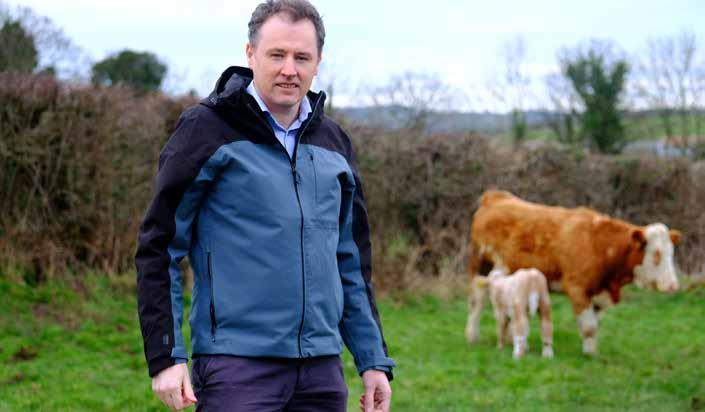
Progress on Food Vision 2030
May 2023 also saw the first annual report of Food Vision 2030, which gives an overview of progress to date and highlights some of the key achievements within each of the four Food Vision missions. Food Vision is the over-arching roadmap for Ireland’s agri-food sector and Minister McConalogue is very hands-on with its operation, chairing an implementation board, which meets quarterly to monitor and benchmark progress made.
“There’s been very good progress in relation to implementation,” he insists, “so we’re really on track after the first year and a half. Food Vision 2030 is about building on the really strong agricultural industry
2 | FOOD IRELAND YEARBOOK 2023/24 minister’s interview
that we have in Ireland, and setting out the ways in which we will seek to improve its sustainability between now and 2030 and ensure that our food system works circularly in terms of its relationship with the environment and also its relationship with human health.”
Food Vision 2030 is built on a platform of sustainability, with a host of projects geared towards ensuring Ireland’s green credentials are second to none when it comes to food and drink.
“Technology and toolboxes are evolving and growing all the time. In terms of meeting our 25% emissions reduction target, we can only bank on and count those technologies that are currently fully validated, but there are more in production which will no doubt come on stream,” the Minister notes. “So, we are putting big effort into new and emerging developments, including feed additives and genetics. Our work in genetics is showing that the same animal, with the same performance in terms of either beef or milk output, can have very different output in relation to methane. So, where we can add that into our genetic programmes and our grading programmes,
we could vastly reduce our methane emissions from our animals, and that has the capacity to contribute significantly to reducing emissions.”
The Minister cites the recent launch of the latest Teagasc Marginal Abatement Cost Curve (MACC) to assist farmers and the agriculture industry to reduce greenhouse gas emissions.
The Teagasc MACC looks at three scenarios with differing levels of agricultural activity, based on different projected livestock numbers out to 2030. The three potential scenarios all have lower livestock numbers in 2030 compared to the 2022 herd and are based on the influence of existing policies and future market forces.
“The MACC basically looks at the different steps that we can take to reduce emissions and looks at the marginal cost of each of those steps,” the Minister explains. “Many of them are cost neutral and many of them are cost positive in relation to actually improving profitability. So, there is a pathway there. It’s one farmers are on and it’s starting to make progress.”
Minister McConalogue believes that the Irish agri-food industry has a “unique
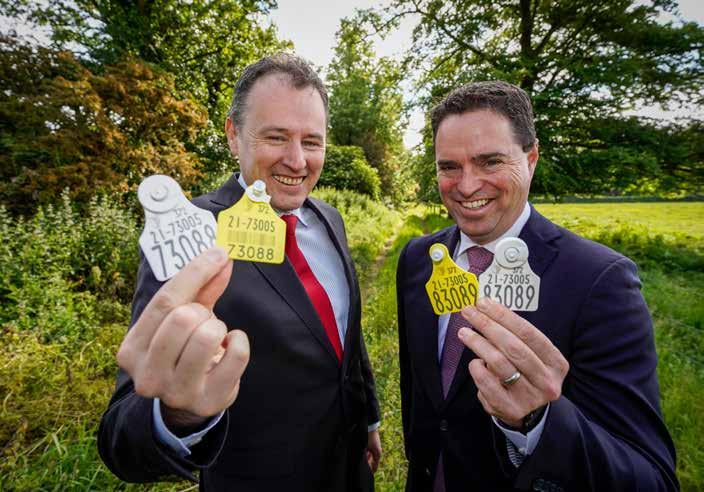
minister’s interview
collaborative spirit”, which allows all actors to work together towards a common goal: “Of course, there is the occasional tiff or difference of opinion, but in the main everyone is travelling in the same direction, working together to achieve our targets under the Food Vision 2030 umbrella.”
This togetherness of spirit came to the fore recently as Ireland Inc. responded to the challenges brought about by Russia’s invasion of Ukraine. “There was massive uncertainty coming after the initial invasion of Ukraine, in relation to cost but also in relation to supply of produce and grain in particular. So, we had to try and prepare strongly to insulate ourselves as much as we could from those challenges.”
The Government responded with a number of supports, including the fodder support, which paid €1,000 per farm family to help save fodder, and the Tillage Incentive Scheme, which paid an extra €400 per hectare for new tillage areas and led to an almost 7% increase in area under tillage. “This was a really significant increase in one year,” according to the Minister. Both schemes are being continued this year.
While the war still rages in Ukraine, which
FOOD IRELAND YEARBOOK 2023/24 | 3
Minister McConalogue and Minister Martin Heydon are pictured at the launch of the world first cattle genotyping programme, which will see a €43 million investment by Government over five years, to enhance the environmental sustainability, health and productivity of Irish beef and dairy herds.
minister’s interview
remains in “a very difficult position”, the Minister believes that supply chains are a lot more stable in 2023, with far more certainty around the impacts on agriculture.
The Agri-food Regulator/ An Rialálaí Agraibhia
Undoubtedly the biggest piece of legislation governing the Irish food and drinks business in 2023 is the Agri-food Supply Chain Bill, which was recently signed into law by the President. It allows for the establishment of an independent office to regulate supplier/retailer relationships in agri-food, An Rialálaí Agraibhia (the Agri-food Regulator), and to promote and enforce the principles of fairness and transparency in the agricultural and food supply chain. The Bill was signed into law on July 12, which was a particularly pleasing date for Minister McConalogue, a long-time champion of the Bill.
“It has been a long journey,” the Minister admits. “It was something that I had advocated for in opposition and it was subsequently transposed into the Programme for Government. A lot of work went into that over the last two and a half years since the Government was formed in relation to actually designing the Office and
consulting very broadly with stakeholders to make sure we’re establishing an office which will be effective and serve the purpose for which it has been set up.”
The Minister acknowledges the work of the Oireachtas Committee on Agriculture and Food who “performed a very valuable service by meeting with stakeholders, having oral hearings with those who had an interest, and producing a report with 20 key recommendations in relation to adjustments to the draft legislation. I accommodated either fully or substantially 18 of those 20 recommendations, with the objective of making the Bill and the new Office as strong and robust as possible.”
May of this year saw the appointment of Niamh Lenehan as the CEO-designate for An Rialálaí Agraibhia (The Agri-Food Regulator). She commenced her position on an interim basis as head of the Unfair Trading Practices Enforcement Authority based in the Department of Agriculture, Food and the Marine, before formally becoming CEO-designate of An Rialálaí Agraibhia on the enactment of the Agricultural and Food Supply Chain Bill and will become CEO on its establishment day.
“This is a really important role, and it will be a very influential part of our entire agri-

food sector in the coming years. Niamh has strong agriculture and farming links, as well as being a success in regulatory and policy roles in her career,” noted the Minister. “Niamh is in situ and ready to go and work on the umbrella of the new legislation, so work has been proceeding at pace and I think it’s an important time for our food sector, particularly for primary producers and farmers, that we now have this Office in place.”
An Rialálaí Agraibhia will promote and enforce the principles of fairness and transparency in the agricultural and food supply chain, having a particular regard to farmers, fishers and small food businesses in several ways:
• It will perform a price/market analysis and reporting function to bring greater transparency all along the agricultural and food supply chain, providing regular reports on price and market information on all sectors in the agrifood supply chain;
• It will engage with retailers, processors, wholesalers, farmers, fishers and others on matters effecting fairness and transparency in the agricultural and food supply chain;
4 | FOOD IRELAND YEARBOOK 2023/24
Minister Charlie McConalogue meets Chinese chefs at Bord Bia’s Chef Masters event in Beijing during the trade mission to China in May 2023.
• It will, as the State’s designated Unfair Trading Practices Enforcement Authority, be responsible for ensuring that buyers in the agricultural and food supply chain do not implement unfair practices in their business-to-business relationship with suppliers. The Bill provides for the transfer of the interim UTP Enforcement Authority to the new Office.
“The Regulator will commence engaging with stakeholders, looking to address what they see as priority areas,” the Minister stressed. “One of the key things I want to see happen is ensuring that relationships within the supply chain are strengthened and are made healthier, and that we increase transparency and reporting.”
The Minister argued that in the past, a sluggishness to respond to changing supply chains has invariably resulted in a squeeze on the primary producer (usually the farmer), who ends up carrying the burden when the overall supply chain
fails to react quickly enough to changing market dynamics. “We need to see healthier and more flexible supply agreements and protocols in place that respect that position and ensure the economic wellbeing of the farmer,” he insists.
Strategies for success
Elsewhere, the development of a National Horticulture Strategy and a National Organic Strategy are key priorities for Government going forward, with a number of programmes in place to advance these sectors.

“Minister Hackett is leading out in relation to those two particular strategies, but they remain a big priority for the Government and for myself as Minister. Our horticulture sector has been under pressure, but we can do more; we have a lot going for us in relation to our capacity, to increase production and output, and we need to work to make sure that we
provide the supports to do that, and also that we have the relationships within the supply chain that provide a healthy network and infrastructure to support long-term horticulture production, so the Agri-food Regulator Office will be important in this respect.”
When it comes to organic foods, the Minister believes we have seen a “significant step-change in relation to the attitude and uptake of organics”. Under the new CAP plan, there has been a five-fold increase in organic funding to €250 million. That, combined with the increase in fertiliser costs resulting from the Ukrainian war, has led a lot of farmers to examine the viability of organic farming: “Farmers realise that organics really is something which you should have a look at in terms of reducing or eliminating the need for chemical fertiliser, so there’s been a radical change there in the last 18 months and that’s something I want to push home.”
FOOD IRELAND YEARBOOK 2023/24 | 5
minister’s
interview
Minister for Agriculture Food and the Marine Charlie McConalogue TD, with CEO-designate for An Rialálaí Agraibhia (The Agri-Food Regulator), Niamh Lenehan.
minister’s interview
Consumers increasingly prefer organic products but up to now they haven’t always matched that desire with a willingness to pay a premium at the tills, but the Minister is hopeful that this will change as the market develops and we see the consistent, yearround supply of organic produce on shelves.
“There are real opportunities there and from a Government point of view, we’re putting the certainty in place by paying farmers per hectare of organic farming, and we are also putting significant focus through Bord Bia into developing the premiumisation of organic products to make sure that there’s additional income at the retail side,” he states.
Beef sector
While the 2022 export figures saw record figures for agri-food, Minister McConalogue isn’t getting carried away just yet, acknowledging that some of the increased value of exports is down to increased commodity prices and rising inflation. “That value may or may not hold into the future, but what is important is that the overall volume of exports is continuing to increase

as well, and we’re trying to add value as we go along. So, while we couldn’t have foreseen these particular figures, we want to maximise price at all times and certainly we’re going in the right direction and we need to continue with that momentum.”
One sector that has been celebrating some good news in 2023 is beef, with the reopening of the Chinese market, as well as a number of Government supports, amongst them the substantial €265 million suckler and beef support programme.
“The new suckler scheme is something I am proud to have delivered. It was a key commitment of mine to support the suckler sector from a Government point of view. Obviously, it’s a sector that’s much more challenged from an income and margins point of view than other sectors, so it’s under pressure. While you can’t really influence the margins area significantly, from a Minister’s point of view what you can do is try and work to support the sector through the schemes that you have in place and to recognise the massive role it plays in our beef sector in rural Ireland.”
Allied with the introduction of the new
National Beef Welfare Scheme (NBWS), it means that farmers who take part in both the Suckler Carbon Efficiency Programme and the NBWS will earn €200 per cow/ calf pair. “We have seen strong uptake, with increased participation, against the backdrop of reduced suckler numbers in recent years,” the Minister stresses. “That was a commitment I gave in my manifesto at the last election, that we would deliver a total payment per calf of over €200, and that is something I’m proud to deliver upon.”
The Minister also welcomed the recent reopening of the Chinese market for Irish beef. “Significant work has gone into that over the last couple of years by officials both here and diplomatically via our team in China. It was a slow process, but we’re very glad to get the opportunity and to get back into the market.”
Minister McConalogue led a trade mission to China in May, with visits to Beijing and Shanghai, which proved hugely successful. “It’s important from my point of view as Minister to make sure that as many markets as possible are open for our produce, and then to make sure that through Bord Bia,
6 | FOOD
IRELAND YEARBOOK 2023/24
Pictured at the launch of the new Teagasc Marginal Abatement Cost Curve (MACC) to assist farmers and the agriculture industry to reduce greenhouse gas emissions in July 2023 are (l-r); Professor Frank O’Mara, Teagasc Director; Deirdre Ryan, Director of Origin Green, Bord Bia; Charlie McConalogue TD, Minister for Agriculture, Food, and the Marine; Suzanne Campbell, Panel Facilitator and author and food/farming journalist; and Liam Herlihy, Chair of Teagasc Authority.
every support is given to our food sector to develop and make the most of those market opportunities. So, we’re now putting emphasis and time into developing the Chinese market again, alongside maintaining all of our existing markets.”
I have stepped out, which is unprecedented in relation to putting a sector in charge of what should happen and then actually delivering on the money that they look for in full,” he notes. “We’re investing in the processing sector, in our fishers themselves and in new technologies to try and maximise the capacity of the sector and to ensure it has a sustainable, long-term future.”
One of the key recommendations was what the Minister calls “unprecedented investment” in our small piers and harbours, which he believes “will make a long-term lasting impact in terms of the facilities available for the fishing sector across the board, as well as opening up opportunities along the coast for our piers and harbours to be used for other purposes.”
Fishing stocks in our waters are beginning to recover, thanks to strict EU legislation which set quotas on the amount of certain species which could be fished. “Everyone has been working more collaboratively to ensure we didn’t overfish and we’re starting to see the benefits of that now because stocks are recovering and we’ll start to see quotas increase now as a result of that, which is very positive and something we should see more of in the years ahead.”
The availability of labour
the relevant steps to be ready,” reveals Minister McConalogue. “We have had a number of false dawns in relation to these checks coming in, but we’re working on the basis that they will happen this time. The Department are resourcing up from the point of view of ensuring we have our staffing in place for the health certification process, but it’s also important every company has their processes in place and their arrangements in place. My message to companies would be to make sure you’re ready; work with the Department officials and take the steps to ensure you’re ready to go come the end of October.”
Despite the amount of challenges facing it, Irish agri-food is in a strong position. When we put it to him that perhaps we are in a position to look forward with slightly more confidence than we had this time last year, the Minister replies with cautious optimism.
Seafood starting to soar again
After some tough years, Ireland’s seafood industry seems to be finally enjoying some good news. The effect of Brexit on our fisheries sector was a “once in a generation impact”, according to the Minister, as Ireland’s fishers saw a 15% cut in overall quotas, which he describes as “significant and hurtful”.
The pro-Brexit politicians had held up seafood as “one of their top calling cards”, according to Minister McConalogue: “It was regarded as a big psychological motive for pressing the ultimate nuclear button in terms of European membership.”

Having fought hard to minimise the damage inflicted by Brexit throughout the negotiations, the Minister and his department are now focused on “supporting the sector to work its way through the effects of that and to maximise the value of the sector, to maximise the opportunities.”
To this end, Minister McConalogue established a sea fisheries task force, who have made a number of recommendations as to how the state can best support its seafood sector going forward. “They have come forward with a number of recommendations to me, every one of which
The availability of labour continues to be an issue for some sectors, including agri-food, which the Minister acknowledges is a challenge in an economy that is essentially at full employment.
“When you have full employment in an economy, that brings its own challenges and it is something we must manage carefully to make sure that it doesn’t lead to undue inflationary pressures and economic overheating,” he notes. “There has been a challenge there in relation to labour across all sectors, including the food sector, but it has been responding very well and has been attracting talent.”
The Minister admits that there is a challenge in terms of recruiting labour at primary production level, emphasising that the Government are “utilising and making available work permits, where appropriate, to support the sector.”
Brexit: the saga continues
The ongoing fallout from Brexit means that Irish exporters to the UK will have to deal with onerous new border controls from October 31 of this year, as the UK begins customs, sanitary and phytosanitary checks on EU goods.
“From a Department point of view, we are encouraging everybody to take
“Agriculture, food and the marine is such an exciting industry, it’s an essential industry and it’s always innovative. So there is always reason to be confident and to be excited about the future. You also never know, though, what the challenges will be that you have to meet, but they always are met and overcome and we will continue to progress. The Brexit challenge, we would never have foreseen or believed until it happened. The Ukrainian challenge again wasn’t foreseen. The climate challenge is one which we are constantly aware of and one we are going to manage, because the world is warming and even with everyone’s best efforts, that’s going to be a continuing challenge. From an Irish point of view, that will bring its opportunities as well because of the fact that we are a country blessed by our position on the globe and our capacity to grow food. It’s even more reason why we have to maximise our capacity to grow and produce our food sustainably and efficiently, with a reduced carbon footprint. So there’s every reason to be excited,” he summarises.
“The important thing for me is to work to make sure right across the sector that everyone is supported, particularly to make sure that that family farms are supported in relation to the work that they do. They underpin our whole sector and we need to make sure that is valued. The same goes for our fishers, that we value their work and do all we can to support their incomes. That’s why the 50% increase in Government funding this year, being the largest ever, was really important as a show of faith and commitment from this Government and from myself as Minister to our primary producers and family farmers and their incomes, giving them the platform to build on in relation to their enterprise.”
FOOD IRELAND YEARBOOK 2023/24 | 7 minister’s interview
Minister McConalogue addresses the Bord Bia Dairy Seminar in China as part of a successful trade mission in May 2023.
Facing the challenges head-on
Paul Kelly, Director, Food Drink Ireland, acknowledges the challenges faced by Ireland’s agri-food industry and examines the big issues that must be addressed if we are to control our costbase, while continuing to grow sustainably.

8 | FOOD
2023/24 sectoral
IRELAND YEARBOOK
overview
The last two years have been difficult for the Irish food and drink sector with high levels of input cost inflation, cost recovery challenges and changes in consumer behaviour.
Ireland’s food, drink and horticulture exports increased by 22% last year to reach a new record high of €16.7 billion, a €3 billion increase over 2021. The UK remains the largest single country market for Irish food and drink exports, with exports valued at an estimated €5.4 billion (32%) in 2022. €5.7 billion of food and drink exports went to EU countries, and international markets account for the remaining €5.6 billion.
Looking at the main export sectors: Irish dairy exports were valued at €6.8 billion. Dairy remains the largest element within Irish food and drink exports, with over 1.7 million tonnes of product shipped to over 130 markets worldwide.
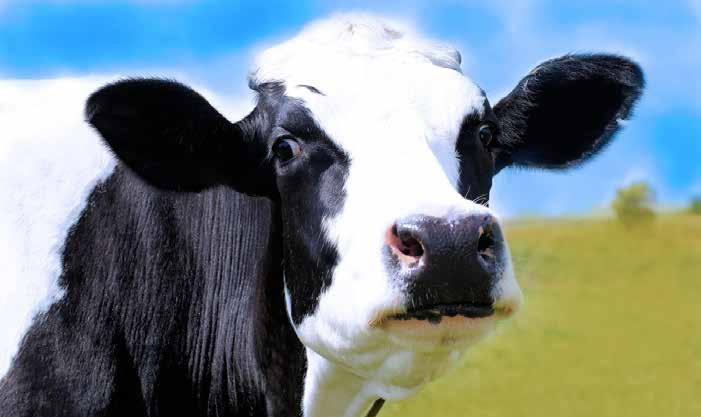
• Meat and livestock sector exports were valued at over €4 billion. There was volume growth in addition to product price increases.
• Prepared Consumer Foods (PCF) export value exceeded €3 billion. However, inflation played a significant role in this value increase, which was up 17% compared to 2021 levels, as volatility in input costs and rising energy prices curtailed new growth opportunities in the UK and European markets.
• Irish drink exports reached almost €2 billion for the first time. North America continues to be the key export market, representing 52% of overall exports at just under €1 billion.
The issue of inflation
Whilst there has been significant food inflation over the last two years, the increase in Ireland has been amongst the lowest in the EU. In addition, there was year-on-year deflation for most of the last decade, resulting in current food prices not being much higher that 2012 levels despite recent price increases.
Ireland’s food, drink and horticulture industry is enjoying strong growth, particularly in export markets.
Paul Kelly, Director, Food Drink Ireland.
The FAO Food Price Index is a measure of the monthly change in international prices of a basket of food commodities and is produced by the Food and Agriculture Organisation of the United Nations. The index rose significantly through 2021 due to Covid-19 supply chain constraints and in early 2022 due to the Russian invasion of Ukraine, reaching a high point in March 2022. Commodity prices began to rise in mid-2020, producer prices in early 2021, and consumer prices in late 2021. The FAO Food Price

FOOD IRELAND YEARBOOK 2023/24 | 9 sectoral overview
sectoral overview
Index has since dropped 22% from the high but remains at an elevated level compared with recent years. Consumer price decreases for food also tend to lag the commodity indices, so we expect to see moderation in food inflation, but food prices will still remain elevated compared with recent years.
Agricultural and Food Supply Chain Bill
This summer will see the enactment of the Agricultural and Food Supply Chain Bill. The main purpose of the Bill is to establish a new independent statutory authority called An Rialálaí Agraibhia (The Agri-Food Regulator) to promote the principles of fairness and transparency in the agricultural and food supply chain, including through a role in analysing and reporting on price and market data in Ireland.
The new office will also assume responsibility for enforcement of the 2019/633 EU Unfair Trading Practices (UTP) Directive in relation to rules on unfair trading practices in business-to-business relationships in the agricultural and food supply chain.
Food Drink Ireland (FDI) will engage with the Regulator, as we did previously with the interim Unfair Trading Practices Enforcement Authority.

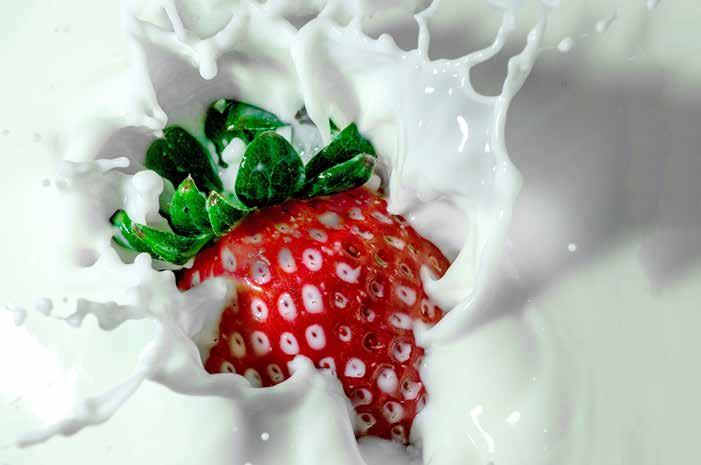
10 | FOOD IRELAND YEARBOOK 2023/24
Irish drink exports reached almost €2 billion for the first t ime in 2022.
The quality of Ireland’s food is renowned the world over.
Sustainability from farm to fork
Sustainability has been a major focus for the sector from farm to fork, with climate legislation, decarbonisation targets, new sustainable reporting requirements on the way and a broad raft of measures under the EU’s Green Deal and Farm to Fork Strategy addressing issues as wide ranging as pesticide use and green claims. Packaging remains a priority area, with aspects of the Single Use Plastics Directive being implemented and a lot of debate about new Packaging and Packaging Waste proposals. A tangible output of all this work is now only months off, with the Deposit Return Scheme (DRS) for beverage containers due to go live in early 2024.
Our nearest export market, the UK, is also adopting many broadly similar measures, such as Extended Producer Responsibility (EPR) which will mean significant additional costs for those placing packaging on the market.
Energy support schemes disappointing
Energy is central to food production for heating, cooking, cooling and transportation. The massive increase in
cost for electricity and gas was meant to be eased by the Government’s two support schemes (TBESS and UECS).
Government allocated €1.4 billion to these schemes. To date, the schemes have been a disappointment, with limited draw-down. FDI continues to call for the schemes to be extended to year-end and for the qualification criteria to be eased as is allowed for under state aid rules.
Priorities going forward
The policy priorities of the sector can therefore be described under the following headings:
• Sustainability: climate targets in primary production and at factory level; packaging and packaging waste; sustainable food systems; circular economy.
• Competitiveness / economic impact: a strong focus on lowering energy, labour costs and insurance charges and maintaining high quality jobs in all parts of the country.
• Fair trade: fair and free trade agreements; effective implementation of the Windsor Framework and the
forthcoming Border Target Operating Model.
• Skills and innovation: improved innovation culture, international collaboration, increased business expenditure on R&D and funding for enterprise-led training funding.
• Diet & nutrition: reformulation programmes, labelling rules that reflect the common Ireland/UK market for packaging, and avoidance of discriminatory taxes.
• Food safety: maintain a world class food safety regime.
Whilst cost inflation is particularly challenging, the sector must also respond to the challenges of public health, sustainability, skills and wider industry competitiveness. A hugely important measure to mitigate these risks is to implement policies to control our cost base whilst helping companies innovate and improve both productivity and sustainability. With one in eight jobs in the economy linked to agri-food, failure to do this will be damaging to the wider economy and not just the food and drink industry.
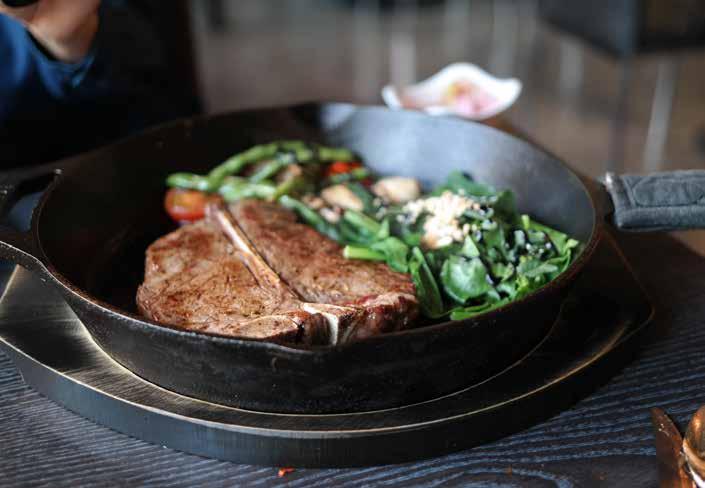
FOOD IRELAND YEARBOOK 2023/24 | 11
sectoral overview
Meat and livestock sector exports from Ireland were valued at over €4 billion in 2022, including volume growth in addition to product price increases.
Hitting the ground running
As he approaches the end of his first year as CEO of Bord Bia, Jim O’Toole reflects what has been an extremely busy 12 months. In a wide-ranging interview, he acknowledges the continued strong performance of Irish agri-food exports, the issue of inflation and the sustainability challenge facing us all in the months and years ahead.

In November 2023, Jim O’Toole will celebrate his first year as CEO of Bord Bia, the semi-state agency responsible for the promotion, trade development and marketing of Irish food, drink, and horticulture in Ireland and globally. Formerly head of Bord Iascaigh Mhara, Jim brought extensive experience in global food marketing, sustainability development and change leadership to the role of CEO, having previously worked within Bord Bia itself for more than two decades. As he approaches his first anniversary leading the food board, he sat down with Food Ireland to dissect what was an extremely busy year, and detailed the challenges and opportunities facing Irish food and drink processors in the future.
How do you reflect on your first year as CEO of Bord Bia?
It’s been a busy year for the industry. Last year, Ireland exported the equivalent of over €45 million worth of food and drink every day to customers in 187 countries around the world. In order to continue on this growth trajectory, my focus has been on Bord Bia’s work being grounded in its new 10-year strategy, launched last year. I have been focused on executing this strategy to drive the reputation of Ireland’s food, drink and horticulture industry around the world. Every activity Bord Bia engages in as an organisation is designed to increase the value Irish companies capture in the marketplace.
As an organisation, we are continuing
to premiumise Irish food, drink and horticulture by building on the industry’s strength in sustainability with Origin Green, Ireland’s national food and drink sustainability programme.
Bord Bia’s global insight, innovation and brand development work is continuing to help create value through a real focus on sustainable nutrition.
And around the world, Bord Bia is being steadfast in capturing value through access to new channels for business. Delivery of these actions has been and will continue to be the focus. All of this is in line with the Irish government’s Food Vision 2030 strategy, which aims to see exports of Irish food and drink reach €21 billion by 2030.
12 | FOOD IRELAND YEARBOOK 2023/24
bia
bord
How has the Irish agri-food sector performed over the last year?
Exceptionally well - the export performance in 2022 showed that the value of Ireland’s food, drink and horticulture exports increased by 22% to reach a new record high of €16.7 billion. This is a significant increase in food and drink exports, up €3 billion since 2021 and almost 30% on pre-pandemic levels (€13 billion in 2019). We put this down to both increasing unit prices, due to inflation and rising input and operational costs, and an increase in the volume of goods exported. The volume of exports for sectors such as Irish beef and dairy increased in 2022; while prepared consumer foods (PCF) and drinks achieved new milestones in the value of their respective exports. Value added meat and seafood exports, captured under PCF, reached over €1 billion in 2022. This represented an increase of 30% compared with the previous year, with exports surpassing pre Covid-19 levels by 23%.
Exports have reached record levels, but inflation is certainly playing a part in those increased values. How do you expect these figures to pan out in the future?
These results were delivered amid a profoundly challenging year for the Irish food and drink sector, most notably the impact of the war in Ukraine, inflationary pressures on producers, and ongoing Covid-19 disruptions to the global supply chain. Against the backdrop of this difficult global trading environment, Ireland has continued to maintain its reputation as a world-class sustainable food producer and supplier, while also successfully securing new business in new markets around the world. 2022 brought a new range of cost and sourcing challenges, making this year’s export
performance even more impressive.
Looking to the future for Irish food and drink exporters, it will be increasingly important to be aware of how consumers respond to the current cost of living crisis and to position their products accordingly.

Which sectors in particular have been performing well and which have faced the biggest challenges?
Dairy is by far the fastest growing category. Last year, Irish dairy exports were valued at €6.8 billion, a year-on-year value increase of 33% or €1.7 billion, driven mainly by Irish butter (up 26% in value) and cheese (up 25% in value). Dairy remains the largest element within Irish food and drink exports, with over 1.7 million tonnes of product shipped to over 130 markets worldwide.
This was followed by the meat and livestock sector, with exports valued at over €4 billion, representing a 15% value increase (+€520 million) compared to 2021. Although product prices increased across all meat species, this robust performance also reflects increases in output levels and average prices within the beef and sheepmeat sectors.
It’s fair to say that across the board, inflation is an issue, as with rising energy costs. In 2022, prepared consumer food (PCF) export values exceeded €3 billion, in a performance that was largely driven by the reopening of foodservice as Covid-19 restrictions lifted in early 2022 across key markets. However, inflation played a significant role in this value increase, which was up 17% compared to 2021 levels, as volatility in input costs and rising energy prices curtailed new growth opportunities in the UK and European markets.
FOOD IRELAND YEARBOOK 2023/24 | 13 bord bia
Jim O’Toole, CEO, Bord Bia, is pictured at Bord Bia’s Bloom festival, with Laura Douglas, Head of Bord Bia Bloom, and Niall Sabongi, The Salty Buoy Food Truck.
bord bia
The industry, and Bord Bia too, have experienced unprecedented challenges in recent years (Covid, Brexit and the war in Ukraine). How do you think both the sector generally and Bord Bia have responded to those challenges?
The industry’s resilient performance in 2022, delivered in the face of such challenging market conditions, has been highly commendable. Following two years of profound disruption, 2022 brought a new range of cost and sourcing challenges, making this year’s export performance even more impressive. We have tried hard to support industry to adapt to these market changes, and these export results are down to the hard work by the companies, farmers, fishers and producers of food and drink. Bord Bia will continue to be agile and responsive to client and sector needs in what is likely to continue to be a period of ongoing volatility.
Sustainability is a key issue right across industry, and the agri-food sector in particular. In many ways, Ireland has been ahead of the curve, with Origin Green in particular. How can we ensure that Ireland remains to the fore in terms of sustainability and that our food and drink brands continue to thrive?
In response to global customer and consumer needs, in 2012 Bord Bia developed Origin Green, the world’s only national sustainability programme for food, drink and horticulture. Over the last decade, Origin Green has demonstrated leadership in food sustainability, providing the food and drink sector in Ireland with the knowledge and guidance to embed sustainability into their businesses, helping to bring a competitive advantage to the Irish food and drink industry and forging a reputation for innovative leadership internationally. Operating from farm to fork, the Origin Green programme has the scale and scope to impact positively on greener ways of farming and more sustainable food and drink production methods.
Bord Bia’s Origin Green programme, in conjunction with partners, helps to drive innovation and improvements in land management to reduce emissions, to build on Ireland’s green reputation for producing high-quality and sustainable produce, ensuring that the long-term outlook for the industry remains positive and resilient. The Origin Green programme is placing a greater emphasis on science-based targets, nature-based
solutions and integrating circular approaches.
Recent challenges such as the Covid-19 pandemic, international trade tensions and the ever-growing impact of climate change have reiterated the crucial role that the Origin Green programme must and will continue to play in maintaining and growing Ireland’s global reputation for food and drink that is sustainably produced by people who care.
How do we ensure that sustainability is ingrained into everything we do going forward?
Bord Bia works with Irish companies to help them achieve their business and sustainability goals in line with the most up-todate market research. Most importantly, where sustainability is concerned, championing a message of evidence-based decision making is crucial to moving our industry towards that sustainable future. Communicating both the progress and challenges in achieving a sustainable supply chain is important to us, as stakeholders look for transparency and need information that is readily available and easily shared.
Bord Bia’s recently established Global Council also brings together the collective wisdom of leading policy and decision makers in government, private sector and sustainability advocates from NGO and non-profit organisations.
Bord Bia has traditionally worked with industry to identify insights and opportunities in markets across the world for Irish food and drink products to gain traction. What do you see as the big growth areas going forward?
We are an insights-driven organisation that works with industry to identify opportunities for growth. In 2017, Bord Bia undertook an in-depth Market Prioritisation Exercise. This identified relatively newer markets likely to present growth opportunities over the next five to 10 years and assess these against the capability of Ireland to supply the market. The output from the tool was a list of the top 30 markets for each category. Through ongoing consultation with industry, Bord Bia identified 15 priority markets for meat, dairy, prepared consumer foods, beverages and seafood, and six years in, these sectors continue to grow. 75 summary reports have been published for each market and sector, outlining the scale of the opportunity, level of competition and any barriers likely to face Irish exporters.
This work laid the ground for an intensive market diversification agenda over the subsequent years and one which we are now reaping commercial benefits from.
Maintaining a diverse range of markets and channels around the world has been key to the success and continued growth of Ireland’s food and drink exports. In 2022, more than one-third (34%) of Ireland’s total food and drink exports in value terms were destined for international markets, while the EU and UK accounted for 34% and 32% respectively. Competition across export markets will be a challenge, but one we are used to. Ireland exports 90% of the food it produces each year.

14 | FOOD IRELAND YEARBOOK 2023/24
Jim O’Toole addresses the Dairy Seminar as part of the Irish Government and food industry trade mission to China in May 2023.
The reopening of China for Irish beef was big news in recent months, following the launch of Irish beef in the premium Japanese market. How important is it that Ireland access markets such as China and Japan with our produce?

China, as an example, is a very important market for Ireland. In 2022, total agri-food exports to China were valued at €722 million, of which €683 million represented food and drink. This positions China as Ireland’s sixth largest trade destination for food and drink by value, accounting for 4% of all exports.
China has one of the largest populations in the world and its GDP per capita has increased tenfold in the last 20 years, making it the world’s second largest economy today. A growing middle class with high disposable incomes in Chinese cities is creating an aspirational consumer base, with an increasing interest in premium food products and access to sophisticated digital retail platforms. Irish exporters are ideally placed to service these consumer demands, as Ireland’s focus on sustainably produced, high-quality food and drink
exports, backed by the Origin Green programme, offers the perfect solution to this growing Chinese market.
Irish dairy exports to China have grown significantly over the last decade, driven by demand for milk in the form of powder for adult nutrition to serve a growing ageing demographic in the country. By 2035, an estimated 400 million people in China will be aged 60 and over, representing 30% of the population. As a result, an increased focus on health and wellness is creating opportunities for imported ingredients to service Chinese manufacturers’ needs in the categories of sports nutrition, adult nutrition and food for special medical purposes. Ireland’s dairy industry has strong capability in this field.
The Programme for Government has included some big changes for the agri-food sector (Food Vision 2030, Agri Food Supply Chain Bill, Agri-Food Regulator etc), as well as the latest round of CAP payments. How do you think these new initiatives will affect the industry and will they affect the work of Bord Bia in supporting the sector going forward?
The Irish government has set out an ambitious plan to more than halve carbon emissions over the course of the decade. This will be challenging and will require significant changes in many areas of Irish life, including farming and the food and drink manufacturing sector. The introduction of sectoral carbon budgets will place greater emphasis than ever on improving the environmental performance of the Irish agri-food industry.
The challenges of sustainability are too immense for any one organisation to achieve, which is why Bord Bia partners with customers globally to build relationships to further empower and support members to deliver more impacts on reducing emissions to meet both policy commitments and market needs. Collaboration at a domestic and international level is a cornerstone of the Origin Green programme.
What do you perceive as the main challenges facing the sector in the coming months and years?
On a macro level, the impact of the war in Ukraine, inflationary pressures on producers, and ongoing Covid19 disruptions to the global supply chain are the big issues, along with sustainably producing food to export. Against the backdrop of this difficult global trading environment, Ireland has continued to maintain its reputation as a world-class sustainable food producer and supplier, while also successfully securing new business in new markets around the world.
FOOD IRELAND YEARBOOK 2023/24 | 15
bord bia
Minister for Agriculture, Food and the Marine, Charlie McConalogue TD, and Bord Bia CEO, Jim O’Toole, pictured at the launch of Bord Bia’s Export Performance and Prospects Report 2022-2023, the annual report that charts the value of Irish food, drink and horticultural exports.
Laying down the law…
Moran, Senior Regulatory Affairs Executive,

We entered 2023 with the agri-food sector facing significant challenges brought about by rising energy costs and global supply chain challenges, set against the backdrop of a cost-of-living crisis. The sector is also gearing-up for significant new regulatory developments bought about through the Packaging and Packaging Waste Regulation, the substantiation and labelling of green claims and proposals for a legislative framework for Sustainable Food Systems. Meanwhile, heated debates have been taking place across Europe on the future of front-of-pack labelling, with opinions firmly divided on the best harmonised, single-market approach to take. Against this backdrop, it is easy to forget the significant developments in food regulation that have brought us to these discussions, both in Ireland and as an overall European single market.
A brief history of regulation…
Stepping back in time, Ireland introduced its first food standards legislation during the 1930s with the Agricultural Meats Act (1930), followed by the Pig and Bacon Act, and the Milk and Dairies Act in 1935. These acts were introduced as growing bodies of evidence were emerging regarding food safety, coupled with the importance of ensuring standards for agricultural exports. In 1974, the Food Standards Act was signed into legislation in Ireland. This was the first time that food was defined, “as any substance used for food or drink by man”, and that labelling specifications about the ingredients in a product (though not the quantities) were laid down in Irish legislation. Similarly, regulatory developments were emerging across the EU during the 20th century, though differing economic circumstances drove legislation in varying directions. In the UK, for
example, the shortage of food and rationing during World War II was found to result in food adulteration; subsequently, legislative requirements for producers to provide details of their names and addresses on label, along with the list of ingredients, were implemented in 1943 (1).
The 1970s saw the beginning of huge economic and social change across Europe, with what would become the European Union emerging as a significant trading bloc (2). In 1973, when Ireland joined the European Economic Community, Irish exports of food and live animals accounted for 41% of the country’s total exports and were valued at €1.1 billion (3). Over 55% of Irish food and drink entered the UK or NI markets (4). In the 50 years that followed, food and drink exports have grown to €16.7 billion, and while the UK remains an important trading partner, more than one third (34%) of Irish food and drink exports now enter the EU (5).
Harmonisation of regulations across the EU
Throughout the last century, advances in scientific knowledge on food safety, nutrition and authenticity have driven regulatory changes across European communities. A key evolution of the European Union was the facilitation of a harmonisation of most food regulations across Member States during the 1980s. However, a number of food incidents in the 1990s highlighted the need for the implementation of a set of guiding principles and requirements concerning food safety, across the entire supply chain. In 2002, the General Food Law was adopted, thus setting out these parameters and becoming the foundation of food and feed law in the EU (6). The European focus for the next 10 years

16 | FOOD IRELAND YEARBOOK 2023/24 food regulations
Aoife
FDI, reflects on the Irish and European regulatory landscape and the legacy of 30 years of the single market.
from Rawpixel.com
Image
is on the sustainable production of food, with an overarching legislative framework on sustainable food systems being developed to support these overarching goals.
The free movement of safe food within the single market is also identified as essential for the contribution to the health and well-being of citizens and is also enshrined within the General Food Law. Furthermore, the European Commission viewed it appropriate to apply the same high level of health protection in cases where food is traded internationally also, ensuring that food exported from anywhere in the EU is of the highest quality globally. This underpins Europe’s status as the world’s largest exporter of food and drink products, sharing Europe’s fine culinary traditions for quality and food safety with all four corners of the world - to the tune of €156 billion. Ireland accounts for 5.7% (€9 billion) of all EU food and drink exports (7). For a country with slightly over 1% of the EU population, that is an incredible achievement.
References
1 www.hygienie.org/a-brief-history-of-uk-food-safety-law
2 https://european-union.europa.eu/priorities-and-actions/ achievements_en


3 https://www.cso.ie/en/releasesandpublications/ep/p-ti/ irelandstradeingoods2018/tradeingoodssince1973/ ⁴ www.cso.ie/en/media/csoie/releasespublications/documents/ statisticalyearbook/2004/ireland&theeu.pdf
⁵ www.bordbia.ie/industry/news/press-releases/irish-foodand-drink-exports-reach-record-high-of-16.7-billion-despitechallenging-year/#:~:text=The%20publication%20today%20of%20 Bord,high%20of%20%E2%82%AC16.7%20billion.
⁶ https://food.ec.europa.eu/horizontal-topics/general-food-law_en ⁷ www.fooddrinkeurope.eu/wp-content/uploads/2023/01/ FoodDrinkEurope-Data-Trends-2022-digital.pdf
⁸ www.bordbia.ie/industry/news/press-releases/irish-food-anddrink-exports-enjoyed-a-record-year-as-value-of-sales-up-4to-13.5bn-in-2021/#:~:text=Ireland%20exports%20about%20 90%25%20of,of%20the%20EU%20Customs%20Union
For Irish exporters of food and drink in particular, the emergence of diverging regulatory frameworks between the EU and our closest and most significant trading partner has become a substantial threat. When discussions evolve regarding the future of front-of-pack labelling or packaging and packaging waste, the harmonisation of rules that for so long provided the cornerstone for fair, equitable trade with our nearest neighbour are no longer guaranteed.
As we celebrate the 30-year anniversary of the EU single market, we are ready to embrace the regulatory challenges that lie ahead and play a critical role in securing a sustainable future for Europe.
The implementation of harmonised regulations across the EU single market has without a doubt been advantageous to Irish food and drink manufacturers, who export about 90% of goods produced in Ireland (8). With the EU bloc accounting for approximately one third of these exports, the introduction of harmonised legislation has facilitated the expansion of trade of Irish goods across the EU. Having the same sets of rules and checks in place across the board enables businesses to work more efficiently in terms of managing supply chains, and facilitates the straightforward distribution of goods across multiple EU countries. Without EU membership, we would be left with a market of five million people instead of 440 million.
Threatening the single market
The prevalence of national schemes emerging from individual Member States, such as extensions of mandatory origin indications and bans on EU-approved substances, threatens the core principles of the functioning of the single market. Such renationalisation measures create internal EU barriers to trade and prevent the free movement of goods that is so critical to the success of Irish food and drink exports. The benefits of shared risk management and official controls are also undermined by the implementation of such measures. For Member States who wish to protect and promote the provenance of their goods, the necessary frameworks are already enshrined in EU legislation through the protections of GI’s and the additional rules for declarations of a product’s origin.
The UK’s exit from the EU in 2021 has highlighted the extent to which the single EU regulatory system is intertwined, and of how the success of the single market is dependent on such interconnectivity.
About the author:
Aoife Moran is the Senior Regulatory Affairs Executive (Food Safety and Sustainability). She and her team provide expertise and guidance to members on emerging and ongoing regulatory challenges both nationally and in major export markets.
FOOD IRELAND YEARBOOK 2023/24 | 17
food regulations
The prevalence of renationalisation measures from individual Member States creates internal EU barriers to trade and prevents the free movement of goods within the single market.
A key evolution of the European Union was the facilitation of a harmonisation of most food regulations across Member States during the 1980s.
sustainability: green claims
Substantiating green claims

• Lack of standardisation: there is currently no universal standard for green claims, leading to confusion for consumers. Without a clear framework, it becomes challenging to compare and verify the legitimacy of different claims.
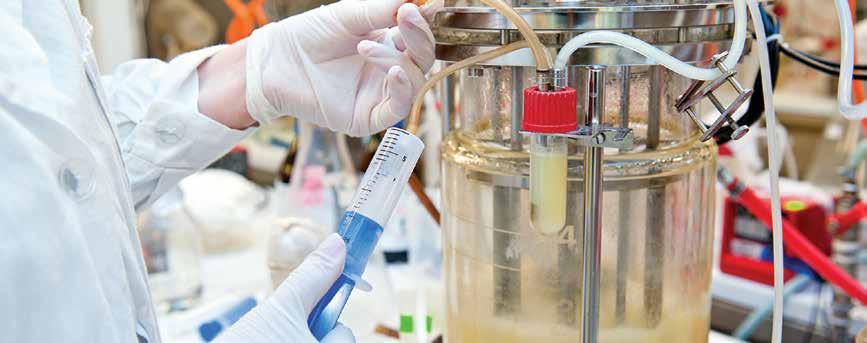
Consumer interest in sustainability and environmentally friendly practices has significantly increased in recent years. As people become more conscious of their environmental impact, they are increasingly seeking products that align with their values. As a result, the market has seen a significant increase in environmental claims, also termed ‘green claims’.
Green claims are statements or labels on food and drink products that highlight their environmentally friendly attributes. These claims cover a wide range of topics, such as organic ingredients, eco-friendly packaging, sustainable sourcing, animal welfare, reduced carbon footprint and more. When used correctly, green claims have the potential to:
• Influence consumer choices: a growing number of consumers are choosing products that align with their sustainability values. Green claims can serve as a powerful tool to attract these environmentally conscious consumers.
• Drive industry innovation: as companies compete to meet consumers' demands for more sustainable products, green claims stimulate innovation in the food and drink sector. This leads to the adoption of greener practices throughout the supply chain. Encourage sustainable practices: by making and promoting green claims, companies are encouraged to adopt and maintain sustainable practices, reducing their environmental impact over time.
Providing the right information to consumers in a clear and reliable manner can empower them to play a bigger role in the transition to a more sustainable food system. Knowing what is in our food and its nutrition credentials are essential but so is knowing how sustainable it is.
Challenges of green claims
While green claims have their benefits, they also bring several challenges. The large number of environmental labels and claims active on the market can confuse consumers and complicate industry efforts to make greener products:
• Greenwashing: one of the most significant challenges is greenwashing, a deceptive practice where companies exaggerate or misrepresent their environmental efforts. This misleading marketing tactic undermines legitimate sustainability efforts and confuses consumers.
• Complex supply chains: the global nature of the food and drink industry means that supply chains can be long and complex. It can be difficult to verify all the sustainability claims throughout the entire chain.
Building credible green claims
The European Commission published its proposal for the Green Claims Directive. The Directive aims to eliminate misleading environmental messaging across EU markets and address greenwashing concerns by setting out the EU’s first set of detailed rules for how companies should market their environmental impacts and performance.
The new requirements will necessitate significant changes to the way many companies currently evidence and communicate their environmental claims, as well as how they manage information related to their environmental credentials.
The food and drink industry supports the development of an EU-harmonised legislative framework on green claims, which should set minimum requirements for the voluntary provision of product environmental information. Making and substantiating green claims in a verifiable, easy-to-understand and comparable way across the EU will facilitate a level playing field among companies in the single market and encourage more sustainable production and consumption.
More and more, consumers are aware of the environmental impact of the products they buy, use and consume and the demand to purchase greener products is growing. This is why food and drink manufacturers in Europe are continuously improving the environmental footprint of their products and providing clear environmental information to consumers.
Conclusion
Green claims in the food and drink industry have the potential to drive positive change and encourage companies to adopt more sustainable practices. However, the prevalence of greenwashing highlights the importance of consumer education and transparent, credible certifications. It is vital that the new EU Green Claims Directive is well designed to ensure a level playing field for market operators across the EU and give consumers confidence that the claims being made can be substantiated and verified.
About the author:
Kevin Maher is FDI’s dedicated Environmental Sustainability Executive. Kevin runs the FDI Sustainability Group, which was established to bring together subject-matter experts from FDI companies and disseminate information on sustainability developments.

18 | FOOD IRELAND YEARBOOK 2023/24
Kevin Maher, FDI’s dedicated Environmental Sustainability Executive, advises on the use of ‘green claims’, the potential pitfalls and the need for the proposed EU Green Claims Directive to ensure standardisation in this area.
Image from Rawpixel.com

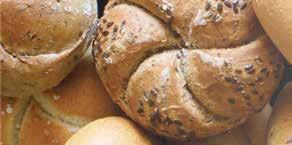
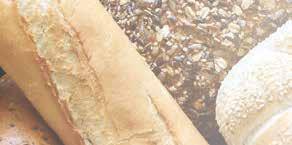







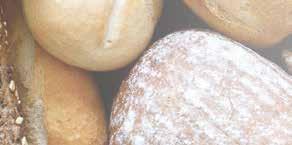



FOOD IRELAND YEARBOOK 2023/24 | 19 The leading provider of Research & Technology for Irelands Food Industry Food Research Ashtown Centre (Dublin 15) Expertise Support in: Prepared Consumer Foods Meat Processing and Cereals Technologies Food Bioactives and Nutraceuticals Food Training and Consultancy Innovation and NPD Management Sensory Training and Panels Food Microstructure Emulsions, Gels and Foams Drying Technologies & Powder Analysis Pilot Scale Processing Bioprocess Innovation and Microbial Systems DNA Sequencing Flavour Chemistry and Sensory Science Digestion Models Moorepark Centre (Cork) & MTL Innovation Solutions in: For more information contact: Professor Mark Fenelon Email: mark.fenelon@teagasc.ie | Tel: +353 (0)25 42355 Web: www.teagasc.ie
Dairy cull economics make no sense
Ireland has a food and drink industry that punches above its weight in our real domestic economy. The money spent in Ireland’s food and drink industry is real and is not just passing through the state as part of a multinational company’s bookkeeping process.

As an industry, we are more than aware of our environmental and sustainability objectives and companies and suppliers have been making huge strides in recent years to both improve, and also prove, environmental credentials.
Ireland is actually a world leader in the space, and has the enviable position that it has the only national food and drink sustainability audit scheme on the planet. Origin Green has the vast majority of both our processors and farmer suppliers accredited.
A plethora of new regulations, laws and schemes are emanating domestically, from the EU and internationally. These are causing huge burdens on our food processors, our farm families and are ultimately driving up costs for ordinary consumers.
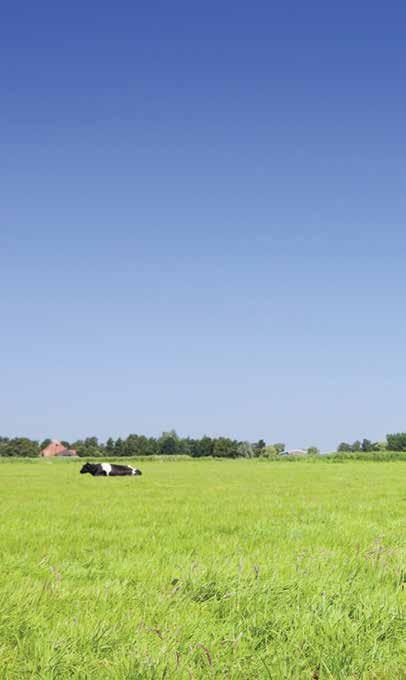
In an era where the food industry has navigated three ‘black swan’ events in quick succession in the form of Brexit, Covid and the Ukraine energy crisis, the sustainability challenge looms larger than all combined over the sector.
The question remains: are we forgetting that sustainability has three legs to the stool? With a welcome focus on environmental metrics, are we factoring in that the economic and social aspects of sustainability are coequal?
Leaked report from DAFM
Recently, we have seen a leaked report from the Department of Agriculture, Food and the Marine saying that there might have to be a 10% cull of the jewel in the crown of our national food industry, our dairy herd, so we can reach environmental targets.
According to 2021 economic data completed by EY for Dairy Industry Ireland, dairy in the Republic of Ireland is worth €13.1 billion.
Based on the 10% cull, this would amount to €1.3 billion a year reduction, the equivalent of a brand new National Children’s Hospital each and every year being taken out of rural Ireland. Can you imagine the devastation of that, from Bundoran to Bunclody?
As global dairy demand continues to grow, this would lead to dairy being produced in other jurisdictions around the world. These commonly have multiples of the Irish dairy emissions and water footprint. Paradoxically, this will contribute to global warming and environmental degradation, while being a major hit to our national economy.
20 | FOOD IRELAND YEARBOOK 2023/24 dairy
A balance is needed in the pursuit of sustainability objectives, writes Conor Mulvilhill, Director, Dairy Industry Ireland, who argues that any cull of our dairy herd would be a massive economic and environmental mistake.
It is very ironic that the cull leak information came on the very week that we have been warned by the Minister for Finance and the Irish Fiscal Advisory Committee (IFAC) that the State is overly dependent on foreign corporate taxation revenues, and that we should be promoting Irish indigenous industry to protect our public finances.
Financially damaging for the entire country
While it must be acknowledged that the figures are just modelling, reducing our biggest natively owned industry is madness that would damage the whole country financially, while doing nothing to help the global environment or food security issues.
We are not averse to state support for farmers who wish to retire - it would be a far better use of taxpayers’ money to augment the already huge ongoing emissions reduction work that Irish farm families are undertaking and supporting generational renewal.

Irish food and drink are taking our climate obligations deadly seriously. In fact, the then Taoiseach Michael Martin stated that Ireland’s agri-food sector is “the only sector fully engaged in climate planning” at last year’s Food Vision 2030 conference.
In conclusion, our sector is and will be a global climate leader, but it is vitally important that we do not initiate policies that do irreversible damage to Irish food and drink and contribute nothing, or even worse, exacerbate our climate challenges.
About the author:
Conor Mulvihill is the Director of Dairy Industry Ireland, representing the interests of Ireland’s primary and secondary dairy processors, including the specialised nutrition sector.
FOOD IRELAND YEARBOOK 2023/24 | 21 dairy
A roadmap for reformulation
Food Drink Ireland is committed to engaging with the Food Reformulation Task Force to ensure the success of the Department of Health’s Roadmap for Food Product Reformulation in Ireland.
In late 2021, the Department of Health launched its Roadmap for Food Product Reformulation, a key element of Ireland’s Obesity Policy and Action Plan. The Reformulation Roadmap sets out targets to reduce calories, saturated fats, sugar and salt across 40 priority food categories that make up the Irish diet. Food and nonalcoholic drink manufacturers, along with the food retail industry, the foodservice sector and ingredients manufacturers are all being asked to reduce the target nutrients and improve the nutritional content of commonly consumed processed foods and drinks by the end of 2025. The Reformulation Roadmaps sets out the following targets:
• 10% reduction in salt;
• 20% reduction in sugar;
• 10% reduction in saturated fat;
• 20% reduction in energy (calories).
All stakeholders working together
The Food Reformulation Task Force, a strategic partnership between the Food Safety Authority of Ireland and the Department of Health, has been established and tasked with the implementation of the Reformulation Roadmap. The Task Force recognises that all stakeholders must work together to ensure the reductions are achieved. Food Drink Ireland (FDI) welcomed the launch of the Roadmap and has been engaging with the Task Force to ensure the success of the programme and an overall improvement in public health and the Irish food environment.
Reformulation is one of the ways in which the sector can contribute to reducing obesity and improving public health. For many FDI member companies, work on reformulation predates the Roadmap. The innovation and ambition of the industry is reflected in the 2019 FDI report, ‘The Evolution of Food and Drink in Ireland,
2005-2017’. This report used an innovative modelling approach, developed with advice from FSAI, to assess the impact of industry efforts on the daily diet of four population groups in Ireland: adults, teenagers, children and pre-schoolers. This report is the first of its kind in the world and shows the positive impact on the population’s dietary intakes. Of those products on the market in both 2005 and 2017, the report found significant reductions in salt, saturated fat and sugar:
• Sodium reduced by 28%;
• Saturated fat reduced by 10%;
• Sugar reduced by 8%.
Workshop for food businesses
Food Drink Ireland and its member companies have been collaborating with the Task Force and have presented their reformulation journeys at conferences held by the FSAI in December 2022 and April 2023, ‘Food Reformulation in Ireland: A

Workshop for Food Businesses’. Case studies featured products that had undergone successful reformulation to reduce target nutrients. While impressive results were showcased, the presenting companies emphasised to the audience all the factors that must be taken into consideration when reformulating a product. The length and non-linearity of the process was a recurring theme in all case studies.
Reformulating a much-loved product requires buy-in from all teams within the business, but the consumer also plays a pivotal role. Their preferences and knowledge of the product should not be underestimated, and they need to be brought along the reformulation journey. Many consumers are sensitive to change, so any modifications need to be gradual, subtle and unannounced. Once consumer acceptance has been secured, companies are then comfortable to publicise the degree to which it has been reformulated.
FDI members boast a wealth of experience in reformulation and an abundance of technical expertise. The FSAI events have provided them with a platform from which to share their learnings with small and medium-sized enterprises, and with the FSAI themselves.
As 2025 approaches, FDI and its member companies hope to continue this positive engagement with the Task Force to ensure a successful outcome for the Reformulation Roadmap and consequently, for public health. Working with industry on reformulation must take place in combination with initiatives from Government, the health service, educators and consumers themselves.
22 | FOOD IRELAND YEARBOOK 2023/24 reformulation
Pictured at ‘Food Reformulation in Ireland: A Workshop for Food Businesses’ in Silver Springs, Cork, are Nuala Collins, Food Reformulation Task Force Lead; Fiona Ward, National Policy Advisor for Nutrition and Obesity, Healthy Ireland; Dr Pamela Byrne, CEO, FSAI; and Andrew Arbuthnott, International Key Account Manager, Saltwell.
We understand how important it is to find the right expertise for your industry application needs.
KNOWLEDGE + KNOW-HOW
You are assured to get the best-fit products, solutions and services for your specific requirements.
150,000 customer queries per year, treated and solved globally by Endress+Hauser technical support organization

With Smart Support, Endress+Hauser delivers the expertise you need remotely to resolve and prevent technical issues on your measurement instruments.
• Shorten unexpected downtimes
• Decrease the effort on maintenance staff
• Save costs of field service visits and device returns
• Increase expertise on instrumentation and application
Do you want to learn more?
www.eh.digital/3OfCY6r
FOOD IRELAND YEARBOOK 2023/24 | 23
Beef sector committed to sustainability

Ireland’s beef industry is doing its bit on sustainability, with Meat Industry Ireland members investing over €150 million in emission reduction initiatives so far. Síle Sweeney, Senior Executive, Meat Industry Ireland, calls for strong Government support for the sector to meet the targets set out in Food Vision 2030.

With growing emphasis on climate change and the need to meet new and challenging greenhouse gas emission reduction targets, Meat Industry Ireland’s primary beef processing industry members are focused on building on our sustainability efforts, in line with Food Vision 2030.
Since 2015, Meat Industry Ireland (MII) members have invested more than €150 million in a range of sustainability initiatives and have achieved important results on behalf of the sector. These include investments into the Teagasc Signpost Farm Programme, Animal Health Ireland and Biodiversity initiatives such as the Bride Valley project.
Early finishing
The Climate Action Plan outlines the ambition to deliver an average finishing age of 22/23 months for prime cattle by 2030. It is the single most important measure the beef industry can take to reduce emissions. The last decade has seen a significant reduction in finishing ages, with the average age for all prime animals in 2021 standing at 26 months, compared to 28 months in 2010. Younger finishing ages have mitigated up to 400,000 tonnes CO2e annually since 2010, which clearly demonstrates the potential of the measure.
The beef industry has been proactively encouraging younger finishing ages through the Quality Payment System, with an estimated €500 million allocated to reward ‘in-spec’ animals that are finished under 30 months of age. Enhanced industry partnerships with Teagasc, ICBF and AHI to support their activities, combined with a number of processors developing their own farm level programmes, have also helped to bring a
greater focus to age at finish as a key factor in reducing emissions.
The objective now is to achieve a further 3/4-month reduction relative to 2021. In line with this ambition, MII is committed to working with Government and suppliers with a view to delivering on this target in a way that recognises the efforts made at farm level, ensuring the benefits are captured in the EPA inventory.
Efficiency of Irish beef production
International comparisons of emissions intensity can be challenging, given the many varied methodologies adopted to measure the carbon footprint of beef across different regions. Data from the UN’s Food and Agriculture Organisation (FAO) – Global Livestock Environmental Assessment Model (GLEAM) offers a more consistent approach to undertaking global comparisons. Results
from their 2017 analysis show a wide variation across regions, with Western Europe production systems performing strongly. The region accounted for 11% of global beef output on a kg of protein basis but only 5% of GHG emissions. On the other hand, Latin America and the Caribbean region made up around 30% of output but more than 45% of GHG emissions, highlighting the emissions intensity gap between the two regions.
Reports by the FAO and Joint Research Centre of the EU Commission have shown that temperate grass-based systems such as that prevailing in Ireland typically have half the emissions intensity compared with tropical or arid grassland systems. It is worth noting that within Europe, data from the Joint Research Centre (JRC) of the EU Commission highlighted that Ireland had the lowest absolute emissions and second lowest footprint per kg of beef among the
24 | FOOD IRELAND YEARBOOK 2023/24
sector
beef
Since 2015, Meat Industry Ireland members have invested more than €150 million in a range of sustainability initiatives.
top six European beef producing countries (including the UK), which collectively account for over 80% of total output. The carbon footprint of Irish beef stands at less than a quarter of Brazil’s beef carbon footprint, according to the report. This analysis recognises the natural strength of our grass-based production system.
To put this in context, if 100,000 tonnes of beef production currently taking place in Ireland moved to Mercosur, it would result in up to 5.5 million tonnes CO2e in additional greenhouse emissions on an annual basis. This equates to almost one quarter of Ireland’s total agriculture emissions and is equivalent to the 2030
GHG quantum agriculture reduction target set by the Government.
Any such impact in terms of carbon leakage is even more important when projections for global beef demand are considered, with the OECD suggesting 1% p.a. growth between now and the end of the decade, driven by increased demand in Asia and Africa.
Asia currently has an annual beef import requirement of almost six million tonnes and growing. Europe currently holds less than 2% of this market. Given the relative difference in emissions intensity between Europe and Mercosur, increasing Europe’s share of Asia’s beef imports to 10% would
help reduce global beef emissions by 26.5 million tonnes CO2e, which equates to more than Ireland’s total annual greenhouse gas emissions.

It should also be noted that, with European beef consumption remaining broadly stable, any reduction in European and Irish beef production would result in increased imports of higher emissions intensity beef, at a time when the European Commission is aiming to deliver a 57% cut in GHG emissions by 2030 relative to 1990 levels.
Conclusion
The beef sector is committed to delivering further, significant progress up to 2030. However, the scale of the target requires strong Government policy support and investment to move at the pace required, while safeguarding the future viability of the sector, which supports 90,000 farm families, around 25,000 jobs and delivers over €2.5 billion in exports annually.

About the author:
Síle Sweeney is Senior Executive at Meat Industry Ireland (MII). She has extensive experience, having spent a decade in the Middle East, primarily working with New Zealand food and drink companies in both the private and public sectors. She represents the members of MII at a local, national and European level, assisting to develop and implement sustainable, service focused business strategies in the meat industry.
FOOD IRELAND YEARBOOK 2023/24 | 25 beef sector
The beef industry has been proactively encouraging younger finishing ages through the Quality Payment System.
Deposit Return Scheme promoting a Circular Economy

What will Ireland’s scheme look like?
Under the Irish scheme, plastic PET bottles and aluminium/steel cans between 150ml and 3 litres will be subject to a deposit. From February 1, 2024, a deposit of 15c will be placed on cans and plastic bottles up to 500ml, and a deposit of 25c placed on containers over 500ml. Consumers can then return these products to any participating store or public return point, to receive their refunded deposit.
Indicative of the importance placed by the beverage industry on moving towards a more circular economy, beverage producers will be responsible for the costs related to the collection and recycling of these products. Retailers who take back ‘in scope’ drinks containers will be paid a handling fee, thereby ensuring that the Deposit Return Scheme remains cost-neutral for both consumers and retailers.
The most significant environmental policy initiative since the introduction of the plastic bag levy in 2001, Ireland’s new Deposit Return Scheme will introduce a radical change in how beverage producers, retailers and consumers interact with the market.
What is a Deposit Return Scheme?
A Deposit Return Scheme (DRS) sees a refundable deposit placed on single-use drinks containers, which is then refunded to the consumer when they return their bottles and cans. Consumers are incentivised to bring back their used products, which will thereby lead to a reduction in littering and increased recycling. Unlike traditional recycling methods, a DRS aims to create a ‘closed-loop’ recycling system, which ensures the returned material is recycled into new drinks containers.
The Scheme is operated by an industry-funded, non-profit organisation called Deposit Return Scheme Ireland CLG, trading as Re-turn.

Is your business ready for DRS?
All producers and retailers involved in selling ‘in scope’ products must register with the scheme administrator, Re-turn. There has been a remarkable level of positive engagement from across industry during the registration process, all wishing to play their part in ensuring a successful go-live on February 1, 2024. For further information on details of the scheme and how to register, please visit re-turn.ie
A leading example of cross-sector cooperation
Ireland’s combined alcohol and non-alcohol industry, and retailers, led by Ibec’s Irish Beverage Council (IBC), have engaged extensively and constructively with key stakeholders to introduce an effective DRS for Ireland. From the creation of a new and independent corporate entity to manage the scheme (Re-turn), to implementation of the finer intricacies of scheme administration, DRS has been a result of active and constructive participation across government, Re-turn and industry.
DRS offers the entire beverage chain, from producer to retailer, through to the consumer, the opportunity to play their part in increasing recycling, reducing litter and building a more circular economy. The IBC is delighted to play a part in this important initiative, and looks forward to the introduction of a successful, sustainable and impactful DRS for Ireland.
About the author:
Robert Kiernan is Director of the Irish Beverage Council, the dedicated representative body of the non-alcoholic beverage industry in Ireland and Northern Ireland. IBC is part of Food Drink Ireland and is one of 39 individual sectoral trade associations operated by Ibec. For more information on the IBC, or if your business is interested in joining, please contact robert.kiernan@ibec.ie.
26 | FOOD IRELAND YEARBOOK 2023/24 deposit return scheme
Pictured at the official launch of Re-turn are Ossian Smyth TD, Minister of State with responsibility for Public Procurement, eGovernment and Circular Economy, together with the Chair of Re-turn, Tony Keohane.
your Search
As work continues on implementing a Deposit Return Scheme in Ireland, producers and retailers are preparing for go-live on February 1, 2024, writes Robert Kiernan, Irish Beverage Council.
YOUR SEARCH IS OVER
INGREDIENTS
Camida’s Ingredient division supply product, service and technical solutions to the food, beverage and feed sectors.
Excellent sourcing capabilities are combined with a competitive supply of ingredients from key manufacturers.


These services are provided by a dedicated and experienced team with in-depth technical and market knowledge, who deliver a customer focused approach to business.

3 KEY ROLES:
Search is over
1 Sourcing - With over 30 years experience in Global supply and over 350 suppliers in more than 25 Countries Camida are uniquely equipped to meet high quality raw material procurement needs.

2 Distribution - Camida are proud of their long term relationship with Global Leaders in Chemical Manufacturing.

3 Vendor Reduction - Camida have many years experience in Vendor Reduction Programmes. These programmes include many additional customer benefits.

FOOD IRELAND YEARBOOK 2023/24 | 27 LIFE SCIENCE INDUSTRIAL INGREDIENTS
your
is
Michael O’Donovan +353 52 6125455 / +353 87 6226810 michael.odonovan@camida.com / www.camida.com
your Search
over
Liquid assets
Rising spirits abound as Ireland’s drinks industry continues to grow after the pandemic.

Across the island of Ireland, there are 45 operational Irish Whiskey distilleries, over 37 Irish gin producers, 15 Poitín producers, eight facilities producing Irish Cream and over 100 brewery and cider producers. Many of these distilleries and breweries throughout Ireland also offer great visitor experiences, driving tourism and spend in local communities.
The last 12 months have shown the drinks industry growing in terms of sustainability initiatives, investments and product innovations. Craft producers, as well as the more established players, are developing new and exciting products, as the drinks industry becomes one of Ireland’s most forward-thinking, innovative sectors.
Despite challenges throughout the year, the drinks industry, largely rural based, continues to be an important part of the hospitality sector, which supports over 170,000 people in work. Our members are a vital part of the communities in which they operate, not only as valued employers but as catalysts for the local economy.
The drinks industry is also in a period of recovery after several tough years of lockdowns, hospitality closures and trade restrictions. Surviving the turmoil of the last three years has not been easy but the industry has persevered and is currently undergoing a resurgence with a brighter future on the horizon.
Teagasc Signpost Programme
Ensuring best practice in sustainability of our products and processes and our raw material supply base is critically important to the drinks industry. In addition to many investments by our members at manufacturing level, Drinks Ireland along with four of its leading members (Diageo, Heineken Ireland, Irish Distillers and William Grant & Sons) is partnering with the Teagasc Signpost Programme. The goal of the programme,
aided by its 10 Signpost Farm participants, is to further reduce the environmental footprint of grain production, which is key to underpinning the future sustainability needs of Ireland’s drinks industry.
Each year, our sector is supported with grain production from more than 2,000 farmers, producing approximately 300,000 tonnes of grain from approximately 45,000 hectares across Ireland. To maximise sustainability and increase climate resilience in cropping systems, the tillage farms in the Teagasc Signpost Programme are taking a lead in the adoption and demonstration of key actions to further reduce the environmental footprint of production.

28 | FOOD IRELAND YEARBOOK 2023/24 drinks industry
Pictured at the launch of the Teagasc Signpost Programme are (l-r): Stan Lalor, Director of Knowledge Transfer, Teagasc; William Lavelle, Director of the Irish Whiskey Association, Drinks Ireland; Claire MacCarrick, Corporate Communications and Public Affairs manager at Irish Distillers; Minister Martin Heydon TD, Minister of State at Department of Agriculture Food and the Marine; Shane Kelly, Corporate Relations Director, Diageo; Avril Collins, Director of Corporate Affairs, Heineken Ireland; Tom Tierney, Tillage Farmer; and Tom O’Dwyer, Head of the Signpost Programme, Teagasc.
#MyDayMyWay

Recently, Drinks Ireland commissioned independent cultural insights agency Bricolage to carry out research to understand the lifestyles, behaviours and ideals of younger people in Ireland. Emerging evidence suggests that Ireland’s drinking culture is maturing and changing for the better, driven by 18-24 year olds (often called ‘Gen Z’) who are a potential beacon for “Better Socialising”, which is all about achieving greater balance.
To showcase this evidence, Drinks Ireland created the #MyDayMyWay campaign to demonstrate the manner in which Ireland’s younger consumers’ habits in relation to alcohol are changing for the better. People of all ages are consuming more premium brands, more moderately, and in a lower quantity, in particular this Gen Z cohort. In addition, the research found that these younger generations like to educate themselves about the drinks industry and enjoy experiences such as distillery tours and cocktail classes.
Similarly, Irish cider has seen a resurgence in light of the recovery of the pandemic. The Irish cider industry took a significant hit during the pandemic, with exports alone dropping by 56% in 2021. However, 2022 saw a recovery for Irish cider as its popularity grew by 13.8% compared to 2021 figures and the sector is on a growth spurt once again. Small, craft Irish cider producers welcomed the introduction, at the start of 2023, of an excise relief scheme of 50% relief from Alcohol Products Tax (APT) for cider and perry produced by qualifying small producers. The scheme enables more cider businesses to be established and fosters further growth, innovation and investment for cider producers currently active in the market.
Irish spirits have also seen a growth in craft and creative production over the last several years, particularly in Irish gin. Drinks Ireland sees continued potential in the sector in the coming years as Irish Whiskey, the fastest growing spirits category over the last decade, leads the way in enhancing the reputation for Irish quality spirits around the globe. The value of Irish Whiskey exports to the allisland economy exceeded €1 billion euro for the first time in 2022.
We continue to see an expansion in smaller distilleries in Ireland as Irish Poitín and Irish Cream create a space in the international market for themselves. Irish Cream recently launched its #ExploreIrishCream campaign in which it highlights its great producers and how to spot “the Real Thing” from imitator products on the international market.
Overall, the last year has been one of great hope for the drinks industry. The value of exports in 2022 represented a 25% increase on pre pandemic levels. In 2022, Irish drinks exports were valued at €2 billion and exported to 120 markets across the globe.

Across the categories
Looking across the drinks categories’ performance over the last year, beer has remained the favourite alcoholic drink among the Irish. The recently published annual Irish Beer Market Report from Drinks Ireland | Beer, shows that the ending of the pandemic resulted in a 110% increase in total production of beer in Ireland in 2022, as both the domestic and international markets reopened.
Irish beer is shipped to every corner of the world, as exports continue to increase, growing by 14% in 2022 to reach €280 million. While total domestic consumption grew year-on-year in 2022 as pandemic restrictions were lifted, consumption remained 3% down compared to 2019, with per capita consumption down by 7.7%, mirroring the continuous decline in alcohol consumption in Ireland over the last 20 years (down 30%).
FOOD IRELAND YEARBOOK 2023/24 | 29
industry
drinks
The #MyDayMyWay campaign demonstrates the manner in which Ireland’s younger consumers’ habits in relation to alcohol are changing for the better.
Pictured at the launch of the #ExploreIrishCream campaign are (l-r): Johnny Harte, Chair of the Drinks Ireland Irish Cream working group and Co-Founder of Five Farms Irish Cream; Charlie McConalogue TD, Minister for Agriculture, Food and the Marine; and Aengus King, Director of Drinks Ireland | Spirits.
Distilleries paving the way for further growth
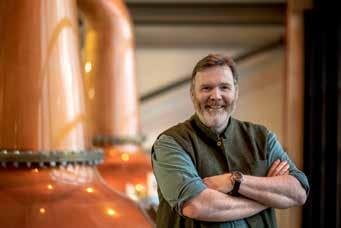
Irish Whiskey distilleries, of which there are now more than 40 countrywide, are fast becoming catalysts for sustainable long-term rural development.

According to the Irish Whiskey Association, the all-island representative body working to promote, protect and represent Irish Whiskey in Ireland and globally, the more than 40 Irish Whiskey distilleries on the island have become catalysts for sustainable long-term rural development.
They have built important links with Irish farmers and local business networks; 28 are now welcoming visitors, and they are collaborating in innovative ways with local food producers, craftspeople and tourism events.
Irish Whiskey tourism is showing signs of continued recovery in 2023, and distilleries are working towards a way back to the preCovid visitor numbers peak of 1.02 million and beyond, supported by the IrishWhiskey360° tourism initiative and the Irish Whiskey Passport marketing tool, both developed by the Irish Whiskey Association.
The Ardara Distillery in Co. Donegal, which is the home of Sliabh Liag Distillers, Ahascragh Distillery in Co. Galway, and Powerscourt Distillery in Co. Wicklow are among examples of how Irish Whiskey distilleries have become part of the social fabric of local communities. Discover more at irishwhiskey360.com
The Ardara Distillery: home of Sliabh Liag Distillers Sliabh Liag Distillers was co-founded by James and Moira Doherty, together with James Keith, in Co. Donegal in 2014. In summer 2021, following a successful crowdfunding campaign, together with investment from a number of other sources, including Údarás na
Gaeltachta and Enterprise Ireland, totalling €11 million overall, they opened the doors of their Ardara Distillery visitor centre.
The business as a whole currently employs 28 people, who work between its operations in the two local villages of Ardara and Carrick in south-west Donegal, and further afield in the UK, Dubai and New York.
It’s early days for the visitor centre, but, according to its Managing Director, James Doherty, who is chairperson of the Irish Whiskey Association, the international potential is significant and value is
30 | FOOD IRELAND YEARBOOK 2023/24 irish whiskey
James Doherty, Managing Director, Sliabh Liag Distillers.
being developed through the distillery as a tourist destination, through farmers increasing the value of their produce and also through a growing network of collaborations.
“This demonstrates how these businesses, even in what might be considered structurally disadvantaged areas, can be catalysts for positive change for more than themselves,” stressed James.
Sliabh Liag produces the award-winning legendary Silkie Irish Whiskey collection and the An Dúlamán Irish Maritime Gin range, which celebrate the people, culture, language and botanicals of the Sliabh Liag peninsula.
The Ardara Distillery is dedicated to peated or smoky Irish Whiskey and designed as a modern interpretation of a once illicit process, “so we brew and distill ‘on the grain’, which we believe gives us a richer flavour profile,” James insists.
Local job creation was a key reason why James started Sliabh Liag Distillers. His mother had grown up in nearby Kilcar and emigrated to England in the 1960s. Although his father was born in England, both of his parents (James’ grandparents) were from Carrick and had emigrated to work in Glasgow in the 1940s.
“We knew that our Ardara Distillery could be a catalyst for opportunity in south-west Donegal, and that we could create employment in the Sliabh Liag area that my family had to leave to look elsewhere for work in time past,” James explains.
Local collaborations
Building sustainable local business networks is also key for how the business operates, with James saying, “We see collaboration as a vital part of building the food and drink network within Donegal and LEO [Local Enterprise Office] initiatives like the Donegal Food Coast, which is something we will support wholeheartedly.
“We have worked with other artisan producers like Filigans Marmalade, New Kid Coffee Roasters in Letterkenny have created a Silkie Barrel-Aged Coffee Blend, Little Mamma’s Ice Cream based in Donegal town use both our brands in their gelato, as does the Donegal Chocolate Man. Our scarves are hand-woven in the village and importantly, we are seeing tillage farmers in Donegal switching to growing distilling barley rather than feed barley, which adds value to their business and underpins our provenance.”
The Ardara Distillery is a welcome addition to south-west Donegal, but unusually, the visitor centre doesn’t have a food offering. Explaining the reasons why, Moira said, “So much of the Donegal tourism offering is outdoors, so being an experience that
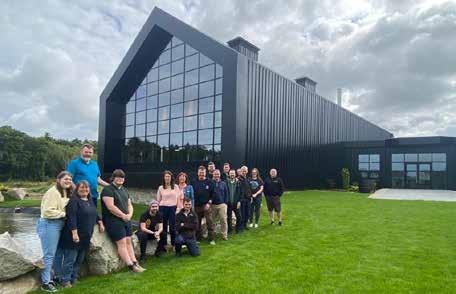
isn’t weather-dependent is a good thing. However, we think that the distillery is here to complete the village and not to compete with the existing hospitality offering. Ours is a tour of a working artisan distillery, followed by a tasting.”
Ahascragh Distillery: a state-of-the-art distillery and visitor centre

Ahascragh Distillers Ltd was established in 2018 by Gareth and Michelle McAllister, and they have interwoven their business operations with the heritage and community of this east Galway village.
Having purchased the locally iconic, derelict Ahascragh Mills building in 2019, and following planning permission approval in October 2020, they commenced construction in August 2021 to transform the 200-year-old landmark site into a state-of-the-art distillery and visitor centre.
Meanwhile, they opened The Old Mill Shop & Café as part of the distillery in the heart of the village, which has been serving locals and visitors for the past two years.
Speaking about the construction project, Alison Greene, Marketing and Communications Manager with Ahascragh Distillers, said, “We collaborated with Billy Moore Metalworks in Waterford to restore the old mill equipment found during the clear-out phase. Billy then designed bespoke pieces of furniture, inspired by the mill, using the salvaged equipment. The pieces are now pride of place in The Old Mill Shop & Café at Ahascragh Distillery.”
The company launched its Family Bond series of sourced releases in 2021, including the brands Clan Colla Irish Whiskey and Uais Irish Whiskey. It now has nine sourced whiskey expressions, and as of 2023, these have been launched in nine countries.
Although not distilled at Ahascragh Distillery, these releases are partly matured, finished and blended by Ahascragh Distillers and bottled in Ahascragh.
This year has been a bumper year of yet more milestones for the company. It began
FOOD IRELAND YEARBOOK 2023/24 | 31
irish whiskey
The Ardara Distillery, the home of Sliabh Liag Distillers, has opened a visitor centre.
Ahascragh Distillers have turned a 200-year-old mill building into a state-of-the-art distillery.
irish whiskey
distilling on-site in the Ahascragh Distillery earlier this year, with the production of its Xin Gin brand.
July saw a major moment, with the opening of the doors of its new visitor centre, to share the history of the old mill, the village and the story of Irish Whiskey and the spirits Ahascragh Distillery produces.

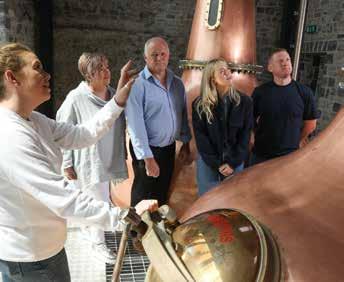

Local job creation
To date, the project has created over 20 direct jobs in the rural village of Ahascragh and the surrounding areas. According to Alison, this will rise to 40 employees in the coming years when the distillery is in full production.
The company supports approximately 60 to 70 indirect jobs through local supply chains. It works with several local suppliers, including food and drink suppliers for the café, tradesmen and construction workers, and building and agricultural suppliers.
“We envision that the distillery initially will bring up to 500 visitors a month to the village of Ahascragh,” Alison comments on the impact of the addition of the distillery’s visitor centre for the local economy. “We encourage local entrepreneurs to capitalise on the increased footfall in the village, and we hope to see more small business ventures and hospitality in the village to enhance a visitor experience.”
Zero-emissions eco-distillery
Ahascragh Distillery is Ireland’s first energised zero-emissions distillery. Alison explains how the eco-distillery is powered by renewable energy – wind, solar and coming soon, hydro, using
very high temperature heat pump technology and an energy efficient storage system.
As no fossil fuels or gas will be used to drive the production process, there will be no carbon emissions from the energy supply side of the distillery. As a result, the spirits produced at Ahascragh Distillery can be classified as zero emissions, minimising the impact to the local environment.
Powerscourt Distillery: the home of Fercullen
Located on the magnificent Powerscourt Estate, Powerscourt Distillery is home to the Fercullen Irish Whiskey brand.
Co-founders Ashley Gardiner and Gerry Ginty envisioned a venture that would not only produce award-winning spirits, but also contribute to the community in line with one of their mission statement core values which is ‘Local True’.
32 | FOOD IRELAND YEARBOOK 2023/24
The Powerscourt Distillery visitor centre, on the magnificent Powerscourt Estate, Co. Wicklow.
The Ahascragh Distillery visitor centre allows visitors to share the history of the old mill, the village and the story of Irish Whiskey and the spirits Ahascragh Distillery produces.
July 2023 saw the opening of the doors of the Ahascragh Distillery visitor centre.
Set in the historic Old Mill House, Powerscourt Distillery began distilling its Fercullen Irish Whiskey in 2018 and its doors opened to the public a year later, revealing a state-of-the-art distillery and visitor centre which quickly became a beacon for whiskey enthusiasts.
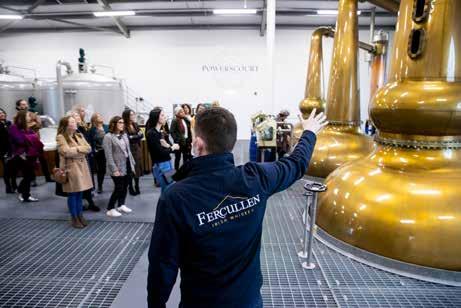
irish whiskey
throw from the distillery in an orchard on Powerscourt Estate. Locally produced charcuterie from the Wooded Pig, Wicklow Farmhouse Cheese and Fercullen Irish Whiskey chocolates, feature as part of the pairing also.

Powerscourt Distillery is proud to employ over 30 members from the local community, a commitment that significantly boosts the economic vitality of the area. It also partners with UCD, DCU and Bord Bia to offer internships, nurturing talent and stimulating intellectual growth in the local community.
Its community initiatives extend further to the procurement of a defibrillator for the local village, and the organisation of events like the Harvest Festival and Imbolc (St Brigid’s) Festival to showcase local producers that celebrate local culture.
Powerscourt Distillery introduced the ‘Spirit of Wicklow’ awards in June 2023, in line with its commitment to the community, arts, innovation and sustainability. This initiative underscores its dedication to the growth and prosperity of the local community.
By utilising the natural resources that Ireland has in abundance; the barley, water, and perfect climate conditions, it creates an extraspecial Irish Whiskey.
The distillery celebrated a much-anticipated milestone this year when the first Fercullen Irish Whiskey came of age and Fercullen Single Malt Irish Whiskey was launched. This was the first (legal) Irish Whiskey distilled in Wicklow in over a hundred years, distilled by its Master Distiller, Paul Corbett, and his expert team.
It joined the flagship Fercullen Falls Blended Irish Whiskey and 10 Year Old Single Grain, a Fercullen 18 Year Old and 21 Year Old Single Malt, along with other limited releases and single cask innovations.
Local food pairing menu
Food historian Santina Kennedy, the distillery’s in-house food, beverage and cultural specialist, carefully curates grain-to-glass and farm-to-fork pairing experiences, introducing guests to the complementary relationship between Fercullen Irish Whiskeys and regional food delicacies.
Beyond this direct economic contribution, Powerscourt Distillery also makes a significant effort to support local suppliers through the Wicklow Naturally local food and drinks network.
Santina is chairperson of the ‘Tell the Wicklow Story’ Committee for the Wicklow Naturally network, while Gerry Ginty, co-founder and Chief Operating Officer at Powerscourt Distillery, chairs the Sustainability Committee. Gerry is also Chairperson of the Irish Whiskey Association’s Tourism Committee.
The visitor centre’s paired tasting menu features honey from hives on Olly’s Farm, which is literally a stone’s
In summary, Powerscourt Distillery’s influence reaches far beyond its primary function of Irish Whiskey production. It is a pillar of its community, providing local employment, nurturing talent, promoting sustainable and ethical practices, and providing an immersive, culturally enriching experience for visitors, affirming the essential role Irish Whiskey distilleries play in local life.
These three distilleries highlight how these local businesses and the entrepreneurs behind them are not isolated success stories but are embedded in the local economy and helping to become the hubs for wider community development.
FOOD IRELAND YEARBOOK 2023/24 | 33
Powerscourt Distillery regularly curates pairing experiences, introducing guests to the complementary relationship between Fercullen Irish Whiskeys and regional food delicacies.
Visitors enjoying a guided tour of the historic Powerscourt Distillery.
Limiting zero alcohol makes zero sense
Zero alcohol beer will grow and grow, but only with the freedom to promote the category, explains Cormac Healy, Director, Drinks Ireland.

The zero alcohol beer movement is here and is gathering pace.
Figures compiled by Drinks Ireland show that 0.0% beer sales in this country grew by 25% in 2022 alone and the market share for 0.0% beer jumped four-fold over the last five years.
As more and more consumers opt to choose zero alcohol beer, Ireland’s brewers have responded by producing high quality offerings in recent years. This has resulted in an unprecedented choice of 0.0% beers for consumers.
The industry anticipates that 0.0% beer will continue to soar in popularity this year and beyond, as Irish consumers seek more balance in their drinking and avail of the growing range of alternatives now available.
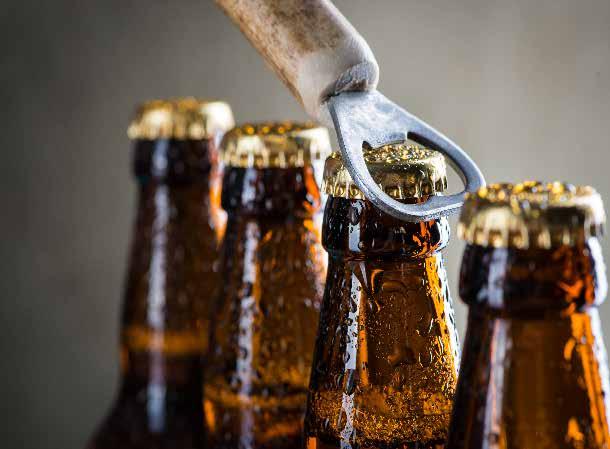
The international picture
This will mirror what’s happening internationally, with the global non-alcohol beer category predicted to grow annually by 8.7% between now and 2025.
Other beer loving countries have embraced the trend. Germany is the largest and most developed market for no- and low-alcohol beer, and its market share is 11.8% of the total beer category. In Spain, noand low-alcohol beers have a market share of 10.6%. This followed an extensive campaign by Spanish brewers to promote non-alcohol beers as an alternative beverage for people who are driving.
While this trend is driven by non-alcohol beer in Ireland, sales of non-alcohol cider and low/no alcohol spirits both grew in 2022, by 7% and 47% respectively. Most restaurants, bars and supermarkets offer consumers a choice of a non-alcohol variants of some of their favourite drinks, and consumers are clearly responding.
Changing attitudes of Gen Z
The growth in zero alcohol beers reflects a changing attitude to alcohol consumption amongst all consumers - there is now strong evidence that Ireland’s drinking habits are changing for the better, and people of all ages are choosing more premium brands but in
34 | FOOD IRELAND YEARBOOK 2023/24
zero alcohol beer
a lower quantity. However, this is especially true for those younger people known as Gen Z.
Recent research from independent cultural insights agency Bricolage, commissioned by Drinks Ireland, found that for many younger people in Ireland, social occasions are centred around conviviality and no longer around alcohol.


The research aimed to do a qualitative deep dive into how Gen Z over the legal drinking age in Ireland, as well as young Millennials, socialise and view their relationship with drinking.
Speaking to a range of young people and experts, it found a growing trend among Gen Zs around being more mindful about how they socialise with alcohol, something the researchers call a desire for ‘better socialising’, which leads to a ‘better drinking culture’.
Zero alcohol beer fits perfectly with this outlook.
Criticism
It’s unfortunate and strange to see criticism of zero alcohol products from certain state-funded organisations. Zero alcohol products have a clear role to play in providing choice that supports moderation, and so the growth of this category is something we should all be encouraging, not discouraging.
There is clear demand for these products from adult consumers, and the public is already ahead on this issue when it comes to what they’re drinking and how they’re drinking. There are very strict codes in place on the advertising of non-alcohol products and they are never advertised or promoted to underage audiences.
Criticism from some quarters that advertising of these new, high quality, non-alcohol offerings is in some way aimed
to circumvent existing restrictions on alcohol products are completely disingenuous. These are distinctly different consumer offerings. Major investment and innovation have gone into their development, and consumers are responding. The fact that a consumer can now choose a non-alcohol variant of their favourite beer brand will encourage growth in this category and this choice and availability needs to be promoted. This aligns with the overall Government objective of reducing alcohol consumption and therefore calls for restricting promotion of non-alcohol products need to be resisted.
All this comes as overall alcohol consumption continues to reduce, down by a third in 20 years according to Revenue data. While some organisations are focused on pushing out of date stereotypes about how we drink, additional research also shows that consumers, particularly young Irish adults, are seeking more moderation, product choice and balance in how they drink and socialise.
Looking to the future
Non-alcohol variants are the choice of many drinkers now and will be more in the future. Consumers have the right to choose, and the right to be informed of those choices. These products empower and enable people to make positive choices and chose an alternative to alcohol; their growth into the future is a win-win for the consumer and for our industry.
FOOD IRELAND YEARBOOK 2023/24 | 35
e
z
ro alcohol beer
There is strong evidence that Ireland’s drinking habits are changing for the better.
Gen Z consumers in particular are more mindful about how they socialise with alcohol.
Zero alcohol products have a clear role to play in providing choice that supports moderation, and so the growth of this category is something we should all be encouraging, not discouraging.
Delivering the skills for success
Food Drink Ireland Skillnet supports the continued success of Ireland’s food and drink industry.
For the past 10 years, Food Drink Ireland Skillnet has been developing high impact training programmes with a focus on skills that are critical to the success of Irish food and drink manufacturers.

“Our approach is to identify the key issues impacting the food and drink sector, look at their implications for talent, and then examine how learning and development can play a role in addressing them,” explains Mark Skinner, Food Drink Ireland Skillnet Network Manager.

With programmes covering areas from sustainability to food inflation, and attraction of talent to Brexit, the common thread linking all these programmes is their industry-led nature. In addition to its steering group of experts from industry, Food Drink Ireland Skillnet leverages its close relationship with its Ibec promoter organisation, Food Drink Ireland, to gain insights into the problems facing industry and how learning and development can be used to provide solutions to them.
That close collaboration with member companies is a critically important success factor for the Food Drink Ireland Skillnet, according to Anita Gallagher, Capability Development Manager at Britvic Ireland and Chair of Food Drink Ireland Skillnet. “The team spends a lot of time with industry, understanding the needs and working out how training can help to meet them,” she says. “Every programme offered is directly relevant to the industry. We also know that if we identify a particular gap and there is no course relevant to it at the moment, the Food Drink Ireland Skillnet will work with us on creating one. That kind of responsiveness is invaluable.”
Examples of successes in the past few years include Food Drink Ireland Skillnet’s response to Brexit. New programmes developed in this regard included a Diploma in Global Sales for the food and drink sector, as well as training interventions around Regulatory Divergence and Customs training.
Sustainability & packaging
Sustainability is another key area, with programmes including an MSc in Sustainable Food Systems and a Certificate in Sustainable Food Packaging. The key element of all these programmes includes the practical application of new learnings.
“Packaging is a case in point,” Skinner explains. “Whilst there is a big emphasis on reducing the use of plastic packaging at the moment, packaging choices must be made in the context of
food safety and shelf life. To support this, in 2022 we launched a new Certificate in Sustainable Food Packaging, which deepens participants’ understanding of the form and function of packaging and the broader food production system, in order to support the most sustainable food packaging choices.”
Other areas of focus include that of access to talent, where their Graduate programme upskills 40-50 participants per year, whilst tailored people management programmes at Supervisor and Team Leader level aid the attraction and retention of talent. In addition, their Traineeship in Meat Industry Skills supports progression from operative into high-skilled knife roles in the meat industry.
Benefits of membership
Membership to Food Drink Ireland Skillnet is free and is open to companies from the meat, dairy, consumer foods and beverages sectors. Benefits of membership include:
• Industry specific training that’s relevant to your business.
• Up to 60% saving on the cost of training due to network purchasing power plus part-government funding through Skillnet Ireland, funded by the National Training Fund through the Department of Education and Skills.
• Flexible training that is delivered at times that suit your company.
Saving time on procurement, as all courses procured by the network are done so to ensure all trainers meet the quality standards of the sector and that value for money is achieved.
• Opportunity to collaborate and learn from colleagues across the industry.
More information can be found on www.fooddrinkirelandskillnet.ie if you would like to join the network for free or would like to input into the Food Drink Ireland Skillnet Steering Group, please contact Mark Skinner, Food Drink Ireland Skillnet Manager, on (01) 6051615 or mark.skinner@ibec.ie.
36 | FOOD IRELAND YEARBOOK 2023/24
food drink ireland ski llnet
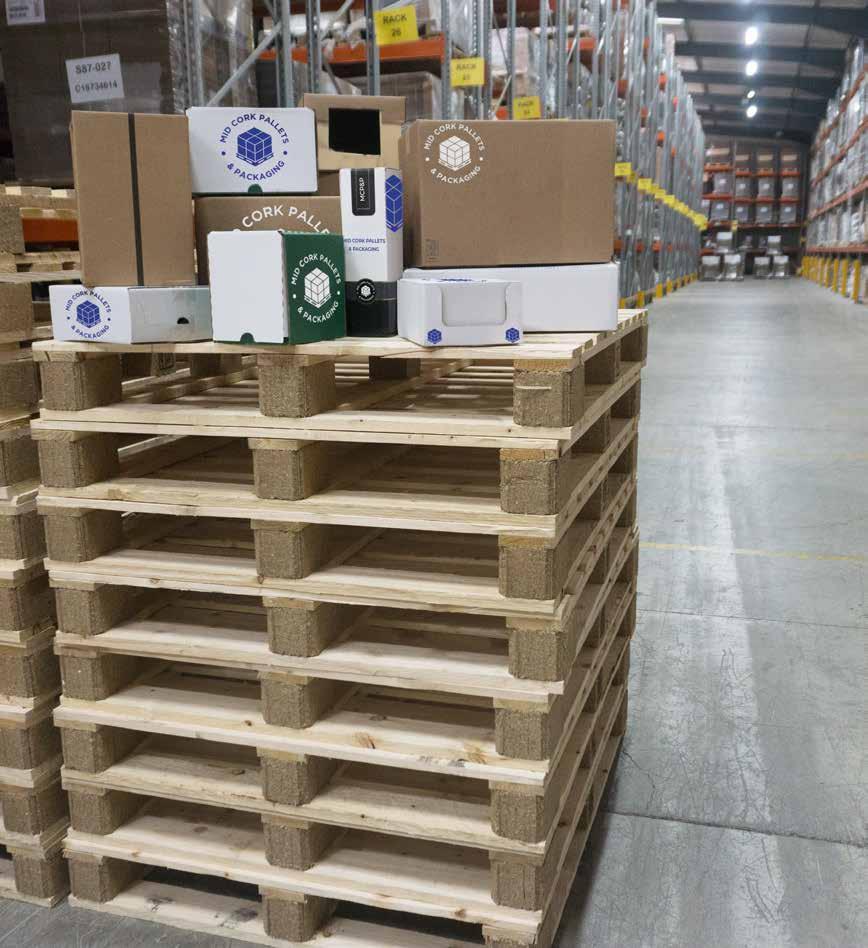
FOOD IRELAND YEARBOOK 2023/24 | 37 Clondrohid, Co. Cork +353 (0) 26 41311 Dunboyne, Co. Meath +353 (0)1 8252059 sales @ midcorkpallets.com www.midcorkpallets.com THE COMPLETE PACK AGE From Ireland’s Leading Supplier O f • PALLET • PACK AGING • STORAGE SOLUTIONS
mid cork pallets & packaging
Recipe for success at MCP
birthday
growing from a single warehouse to become one of the country’s leading suppliers of pallets, packaging and storage solutions.

Having the right ingredients in the right quantities is essential, not just in baking but also when it comes to business and at Mid Cork Pallets and Packaging (MCP) they seem to have mastered this process, which has allowed the company to grow and prosper over the last 45 years.
Situated on the outskirts of the small village of Clondrohid, Co. Cork, MCP was established in 1978 by Johnny Lehane from a single warehouse, after he spotted a gap in the market to repair used pallets. Having become specialists in the pallet repair industry, MCP quickly expanded into pallet manufacturing and were one of the first companies in Ireland to commission an automated pallet manufacturing machine.
In 1992, MCP diversified their operations, expanding steadily into the supply of customised packaging solutions for the food, drinks, e-commerce and medical packaging industries. Furthermore, in recent

years and as a complementary service to their customers, MCP expanded into warehousing by offering storage solutions to both new and existing customers from their two strategically located sites in Clondrohid, Co. Cork, and Dunboyne, Co. Meath, offering fast, efficient delivery throughout Ireland, both north and south.
It all stacks up at MCP!
Today, MCP operate from over 700,000 square feet of production and storage facilities from their two locations in Cork (60 acres consisting of over 500,000 square feet of purpose-built manufacturing and storage facilities) and Meath (over 200,000 square feet of storage facilities at their 15-acre Dunboyne facility). Boasting one of the largest pallet offerings in Ireland, MCP produce over 2.5 million pallets per annum of timber, Euro, heat treated or custom pallets and crates for some of Ireland’s largest food & beverage, pharmaceutical
and manufacturing companies.
MCP are also one of Ireland’s leading packaging companies and offer a complete service to customers, from hands-on design, prototyping and expert advice through to producing engaging, unique packaging. Indeed, MCP currently supply over 10,000 different packaging products!
From their six purpose-built storage and distribution warehouses, MCP pride themselves on offering their customers a first-class stock-holding and nationwide pallet distribution service, with regular up-todate stock reports, including a full stock level management service.
All customers can enjoy full confidence in MCP’s product range, as the company is ISO 9001:2015 accredited to manufacture, heattreat and repair wooden pallets and boxes, as well as for packaging assembly. In addition, they heat-treat pallets according to ISPM 15 (International Standards for Phytosanitary Measures) standards and they are BRCGS
38 | FOOD IRELAND
2023/24
YEARBOOK
MCP offer a complete service to their customers, including full design and prototyping service for specialised packaging and corrugated boxes.
Mid Cork Pallets and Packaging (MCP) are celebrating their 45th
this year,
mid cork pallets & packaging
certified to an AA standard for the wholesale storage and distribution of food grade and non-food grade packaging.
Some would argue that another success of baking a cake is the importance of using local, quality ingredients and this is definitely true in this case. MCP are one of the largest employers in their locality in Clondrohid, Co. Cork, both directly (employing 100 staff, over 70% of whom live within a fivemile radius) and indirectly through timber mills, transportation and other services. Similarly, more than 90% of their staff at their second site in Dunboyne, Co. Meath, are local to the area.
“As we celebrate 45 years in business this year, which is a huge achievement for any company, the key to this success has always been our staff, some of which have been with us 45 years and still have many years left!” reflects Johnny Lehane, when asked about the secrets to the continued success of the company he founded back in 1978.

“MCP have seen huge changes over the years,” admits the company’s founder, “but it is our commitment to providing a quality, reliable product at competitive prices, exactly when and where our customers need it, mixed with our longstanding and committed staff, which has propelled MCP right to the top in our fields.”
Aidan Harty, Managing Director of MCP, explains that “being in business for 45 years doesn’t just take luck; it takes a lot of hard work, determination and surrounding yourself with the best staff and loyal customers.”
Leading edge sustainable practices
A sister company to MCP and built on the grounds of their Clondrohid site, Cork Green Energy was commissioned back in 2019 as a Combined Heat and Power Plant (CHP) to generate green electricity. Powered by biomass, which is a carbon-neutral green energy source, Cork Green Energy produces 1.3 megawatts of green electricity per hour, which is supplied directly to the national grid to power the energy of over 1,300 houses.
“MCP’s foresight in establishing this CHP plant has been envy of many companies in recent years, given the increased focus on sustainable and green initiatives,” says Johnny.
Last year MCP boosted their energy generating capabilities and credentials even more by installing a 700KWp solar generation facility on nearly 4,000 square metres of
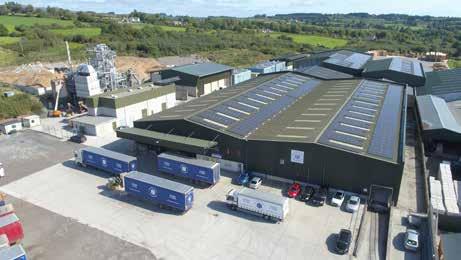
unused rooftop space in Clondrohid, Co. Cork, and another 100KWp solar installation in Dunboyne, Co. Meath, which equates to over 3,000 solar panels. They also installed intelligent LED lighting systems. Indeed, these measures managed to reduce MCP’s CO2 emissions by 265 tonnes a year.
“We are always thinking of ways to make energy savings,” stresses Aidan Harty. “In fact, once all our new warehouses are completed, the plan would be to fit these out with solar panels also and further increase our solar generating capabilities on-site.”
Bright future ahead
The future for MCP is certainly bright, as they are currently expanding their production, storage and distribution facilities even further, with the commissioning of another custom-built, leading-edge pallet manufacturing machine later this year, and
the addition of four new warehouses at their Clondrohid and Dunboyne facilities, with an additional capacity of 25,000 pallet spaces.
“It never ceases to amaze me how far our company has come,” smiles Johnny Lehane. “I still remember the first pallet repaired or the first pallet manufactured, and now we have become Ireland’s leading manufacturer of kiln dried and heattreated pallets, EPAL pallets, second-hand pallets, and custom crates for the food and beverage, pharmaceutical, medical devices, dairy, and general manufacturing industries.”
MCP have capitalised on growing trends and demands in Ireland over the course of 45 years, thanks to strategic planning and agile management. One thing remains the same in 2023 as it did back in 1978, however: the customer remains at the forefront of everything they do.
FOOD IRELAND YEARBOOK 2023/24 | 39
The MCP facility at Clondrohid, Co. Cork, has grown substantially from its formation in 1978.
Management and staff at MCP celebrate the company’s 45th birthday.
NI food & drink is buzzing…

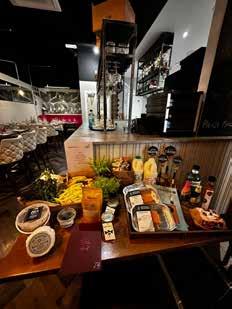
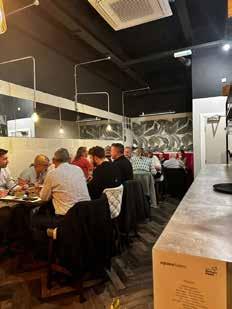
Invest Northern Ireland recently hosted more than 60 buyers at the Balmoral Show, where they met some of the most exciting NI food and drink producers.
Food remains a serious business in Northern Ireland and is the region’s biggest manufacturer, one which contributes over €5.8 billion (Stg £5 billion) to the local economy annually and employs more than 100,000 people across the extensive supply chain.
Northern Ireland food and drink is on sale in over 70 global markets, including the US and throughout Asia and the Middle East. Whilst the environment is still challenging, NI food & drink producers have manoeuvred their way through Covid-19 and Brexit to continue delivering safe, nutritious and quality food.
Balmoral Show success
There is undoubtedly a growing appetite to once again engage directly with food producers and a great example of this resurgence in physical interaction was at the recently held Balmoral Show, Northern Ireland’s largest agricultural show. Retail and foodservice buyers, as guests of Invest

Northern Ireland, attented a private viewing of the food pavilion where over 70 NI food and drink producers were exhibiting.

“Invest NI hosted over 60 buyers, predominantly from the Republic of Ireland, at the recent Balmoral Show, who along with a group of visiting food writers, seemed genuinely delighted to be back out and about and physically meeting companies again,” explains Jen Guiney, Invest NI Business Development Manager in ROI. “There was a great vibe in the food and drink pavilion and there were many positive interchanges between visiting buyers and our NI supplier base.”
Guiney believes that “this type of event supports our role, which is to broker mutually beneficial and profitable business relationships between retailers and foodservice operators in the Republic of Ireland and Northern Ireland companies.”
The Balmoral Show will be deemed a great success, she believes: “The very positive feedback we are receiving from
follow-up conversations with many of the visiting buyers indicate that significant additional new business will be secured as a direct result of the Balmoral Show.”
Live showcase in November
The next big event in the business development calendar will be Invest NI’s live showcase this November, as Jen explains: “The return of the live food and drink showcase was such a success last year that we are looking forward to an even bigger and better event this November, our biggest event of the year. The showcase offers an excellent platform on which to host key retail and foodservice buyers and we have established a successful record of helping external buyers to source a range of products. We also use the opportunity to network with a large number of buyers, present local food companies across all sectors, offer impartial guidance on products and assist with introductions, factory visits and sample requests.”
Invest NI offers buyers a comprehensive understanding of the products, capacity and capabilities of around 400 Northern Ireland producers. All of this buyer engagement is complemented by Invest NI’s suite of capability building workshops, through which all sizes of food and drink businesses can avail of hands-on support to build confidence and enhance their preparation and performance in relation to face-to-face negotiations.
40 | FOOD IRELAND YEARBOOK 2023/24
invest northern ireland
Buyers enjoying Invest NI hospitality and incredible Northern Ireland food and drink prepared by Stephen Higginson, head chef/proprietor, The Square Bistro, on the eve of the Balmoral Show.
Northern Ireland. Bringing our world-class food and drink to your table.
When you source food and drink from Northern Ireland you can be sure of its pure, natural, quality. That’s why Invest Northern Ireland’s Food and Drink division works with local producers to help them take their products around the world. Whether it’s helping companies to find new markets in the Republic of Ireland, or working with UK supply chains to drive new sales, Invest NI partners with our local producers to help them identify new trends, bring forward innovative products and grow their business.
Learn how you can serve our quality food and drink.

Northern Ireland. Altogether more.
For further information contact Jen Guiney, Invest NI E: Jen.Guiney@investni.com M: +44 79 8511 1024
FOOD IRELAND YEARBOOK 2023/24 | 41
We work with NI producers to help identify new trends, bring forward innovative products and grow their business.
Belfast, Co. Antrim
Grand Central Hotel,
Rise of the robots
Quality assurance and hygiene can be improved with the use of robotics compared to manual handling in several ways. Here are some key points:
Precision and consistency: Robots excel at performing tasks with high precision and consistency, minimising human errors. In quality assurance processes, where accuracy and repeatability are crucial, robots follow predefined algorithms and programmed instructions to consistently execute tasks in a standardised manner. This reduces the likelihood of quality defects.
Reduced contamination:
In industries where hygiene is critical, such as food processing or pharmaceutical manufacturing, robots can help minimise the risk of contamination. Unlike humans, robots do not carry microorganisms that could lead to product contamination. Additionally, robots can be designed with smooth, non-porous surfaces that are easy to clean, reducing the chances of cross-contamination.
Sanitation and cleaning: Robots can be constructed using materials that are resistant to various cleaning agents,
enabling them to undergo rigorous sanitation processes without degradation. Their design can also include features that facilitate thorough cleaning, such as smooth contours or easily accessible parts. These characteristics ensure that robots can maintain a high level of cleanliness, making them suitable for use in environments that require strict hygiene standards.
Automated monitoring: Robotics systems can incorporate sensors and monitoring devices to detect and identify potential quality issues. Vision systems, for instance, can be employed to inspect products for defects, ensuring that only items meeting the desired quality standards proceed further in the production process. Real-time monitoring and feedback provided by robotics can help identify deviations or anomalies promptly, enabling swift corrective actions.
Traceability and data analysis:
Robotics enables efficient data collection and analysis throughout the manufacturing or handling process. By tracking and recording relevant parameters, such as production time, temperature or
environmental conditions, it becomes easier to trace potential quality issues and identify their root causes. Analysing such data can lead to process improvements and preventive measures to ensure higher quality standards.
Reduced human error:
Manual handling carries the risk of human errors, which can impact quality assurance and hygiene. Fatigue, distraction or lack of attention can lead to mistakes during manual operations. By automating tasks with robots, the reliance on human operators is reduced, minimising the potential for human-induced errors and improving overall quality control. However, it’s important to note that while robotics can enhance quality assurance and hygiene, they still require routine maintenance cycles and periodic validation by an accredited and trusted robot manufacturer, to ensure their continued effectiveness. Regular calibration, cleaning and adherence to industry regulations are essential to maintain the desired levels of quality and hygiene with any robotic system.
For more information, visit www.kuka.com
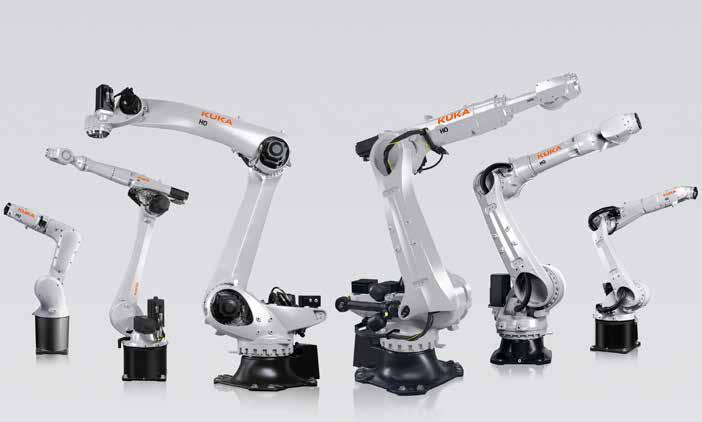
42 | FOOD IRELAND YEARBOOK 2023/24 robotics
The use of robotics, such as those offered by KUKA, can provide massive advantages when it comes to quality assurance and hygiene across the food and drink industry.
The KUKA KR DELTA hygienic, fast, reliable
Chocolate. Cheese. Meat. Sweets.
Hygiene at a high level - KUKA DELTA robots have been specifically designed for use in highly sensitive conditions, where product integrity, hygiene and health and safety are paramount. Thanks to its stainless steel body, the DELTA robot is ideally equipped for direct contact with food, its corrosion-resistant stainless steel shell designed according to German LFGB and US FDA food standards.
Industrial robots are an essential element within
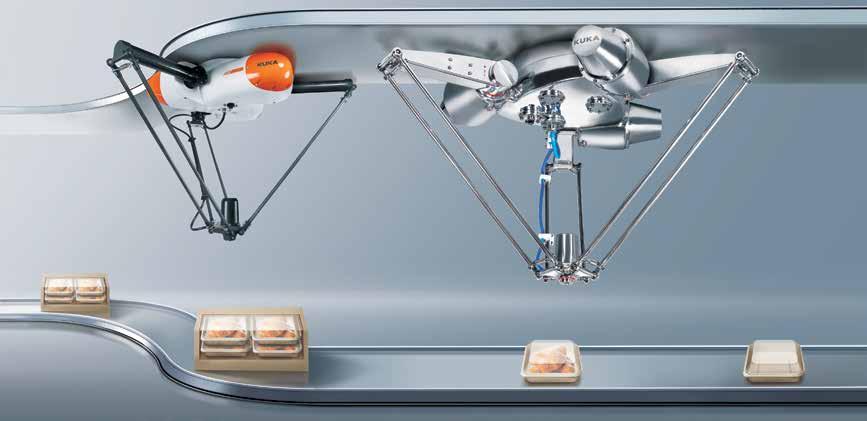
today’s factory environment, even more so within the factory of the future. The demand for industrial robots stems from the need for versatile, intelligent machines able to perform repetitive tasks cost effectively with a wide range of motion whilst maintaining quality consistencies and reduced cycle time. The delta robot satisfies these demands.
KUKA Robotics Ireland Ltd. (042) 939 5034 sales.ie@kuka.com

FOOD IRELAND YEARBOOK 2023/24 | 43
Tirlán: here for good
Tirlán is enjoying an exceptionally busy period across its food ingredients, consumer and agri brands.
Tirlán is Ireland’s largest farmer-owned food and nutrition business, with a diverse portfolio of quality ingredients, leading consumer and agri brands, which today include Avonmore, Kilmeaden, Wexford, Solmiko nutritional milk proteins, CheddMax and more.

“It’s been an exceptionally busy period for us,” explains Ann Meaney, Head of Ingredients Marketing at Tirlán. “We have we gone back to our roots as a farmer-owned co-operative. We have added new dairy and plant-based products, solutions and ranges to our multi award-winning lines which today are exported to more than 100 countries.”
Tirlán’s dedicated, 2,300 strong team has worked hard and developed a strong market presence in the UK, France, Germany, UAE, the US, North Africa, Japan and China. The sustainably produced, trusted food and ingredients they supply are made using quality milk and grain provided by Tirlán’s farm families, many of whom have worked with them for generations.
Their award-winning brands are household names in Ireland and they have also built up a strong reputation internationally with their exceptional products and tailored nutritional solutions, including Truly Grass Fed, Solmiko nutritional milk proteins, CheddMax and GAIN Animal Nutrition.
Award-winning produce
In recent weeks, Tirlán’s produce won eight medals at this year’s International Cheese & Dairy Awards in the UK, beating off competition from over 5,000 international entries. Among the top prizes won by Tirlán were gold in the Longest Vegan Stretch Cheese competition with their Oat-Standing™ Plant-Based Grated Pizza Mix. It was specifically developed for use on pizza and has proven to be an excellent plant-based alternative to give consumers a cheese-like experience. Tirlán also won the Volac trophy for the Best Medium Creamery Block Cheddar.
Tirlán has been at the forefront of cheddar cheese technology for more than 50 years and their experience developing award-winning cheese for international retail, foodservice and ingredients markets is globally recognised. Their CheddMax cheese solutions portfolio offers natural cheese solutions which deliver exceptional results in the areas of browning, slicing, shredding, melt and many more desirable functionalities to the foodservice industry.
“All of our investment, all of our innovation is designed to deliver for our customers, our consumers and our loyal family farm dairy and grain suppliers,” summarises Ann Meaney.
Tirlán’s purpose built Innovation Centre is home to their team of R&D and food technologists.

Innovation
Tirlán is constantly evolving and adapting to meet consumer and food industry demands. They have a purpose built Innovation Centre which is home to their team of R&D and food technologists.

Avonmore has entered the plant-based drinks sector with the launch earlier this year of Avonmore Oat Drink made from quality Irish oats. This offers even greater choice to retail customers and consumers, as well enhanced premium crop opportunities for Tirlán’s 1,100 Irish growers.

Earlier this summer, Tirlán introduced Avonmore Fibre Plus Milk, with added fibre and vitamins, to their range of value-added milks. Avonmore Fibre Plus Milk is high in fibre, which is beneficial for digestive health, and is also enriched with vitamin C and vitamin D, to help support the immune system.
Tirlán is committed to sustainability through its comprehensive Living Proof programme, and is signed up to the Science-Based Targets initiative (SBTi). In 2022, Tirlán launched a €54 million three-year Sustainability Action Payment programme which has seen farmers embrace new sustainability technologies. For more information, visit www.tirlan.com

44 | FOOD IRELAND YEARBOOK 2023/24 tírlán
Tirlán continually introduce innovative new products like Avonmore Oat Drink and Avonmore Fibre Plus Milk.
Tirlán is committed to sustainability through a number of programmes.
TIRLÁN - A GLOBAL NAME IN FOOD AND NUTRITION

Tirlán is Ireland’s leading 100% Irish farmer owned Co-op providing world-class dairy and grain ingredients across the globe.
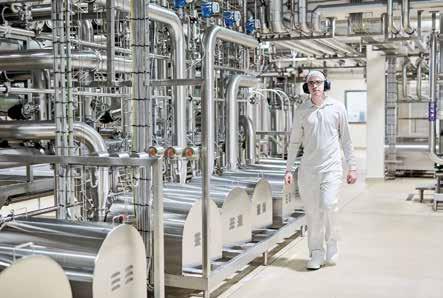

FOOD IRELAND YEARBOOK 2023/24 | 45
Tirlán, Abbey Quarter, Kilkenny www.tirlan.com
Astatine: pioneering sustainability projects in food and drink
Astatine have partnered with Irish food and drinks companies on a number of hugely innovative projects, which are helping to cut emissions and energy costs.
In an era where sustainability is a critical imperative, Astatine has emerged as a trailblazer in the decarbonisation industry. With an unwavering commitment to creating a greener future for Ireland, their innovative work is shaping the landscape of sustainable practices, especially within the food and drink sector. Collaborative partnerships with industry leaders such as Wicklow Wolf Brewery and Ahascragh Distillery have showcased Astatine’s transformative potential and set an inspiring precedent for others to follow.
Astatine’s pioneering partnership with Ahascragh Distillery marks a significant milestone - the successful implementation of the first heat pump in the UK or Ireland capable of surpassing 100°C. This achievement redefines standards in sustainability and innovation within the brewing and distilling sector. The high-temperature heat pumps installed have set a new benchmark by providing 100% of the heating and cooling demand required, making Ahascragh the inaugural zero-emission distillery in Ireland.
Notably, the heat pumps generate four units of heat for every unit of electricity consumed, resulting in significant environmental and economic savings. Beyond its industry implications, this accomplishment signals the potential for widespread adoption
across various sectors in Ireland’s food and drink industry. Economically viable, the project also forecasts a 30% reduction in costs for Ahascragh Distillery.
Astatine’s collaboration with Ahascragh Distillery sets a precedent to transform distilling that balances environmental responsibility with financial prudence.
Solar panels offering a renewable solution
The collaboration between Astatine and Wicklow Wolf paints a similar picture of innovation and sustainability within the food and drink industry.
By covering the entire 17,000 square feet roof of Wicklow Wolf’s brewery with solar panels, Astatine have utilised renewable energy to assist with Wicklow Wolf’s energy transition. This work is poised to produce more than 30% of the brewery’s electricity requirements via solar panels. Beyond the economic benefits, this effort will lead to circa 30 tonnes less carbon emissions each year, highlighting the promise of renewable energy sources and demonstrating how the food and drink industry can contribute to making a positive impact.

46 | FOOD IRELAND YEARBOOK 2023/24 decarbonisation
Astatine’s approach to project delivery sets a new standard for accessibility, with many projects possible with no upfront costs, helping to make decarbonisation accessible and practical for a wide range of stakeholders.
ASTATINE, RENEWABLE HEAT & POWER SPECIALISTS, CUT ENERGY COSTS BY 50%

WHILE REDUCING CARBON EMISSIONS BY OVER 70%
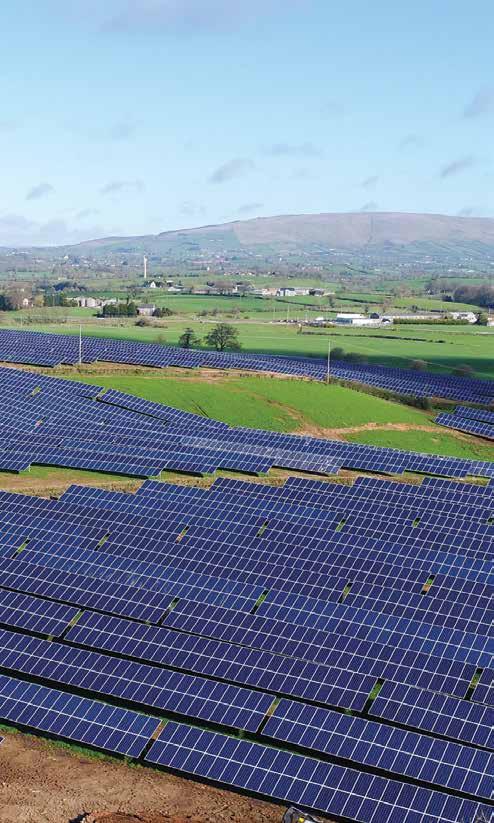
FOOD IRELAND YEARBOOK 2023/24 | 47 €
decarbonisation
Food manufacturing success stories
Not only do Astatine help with the decarbonisation of the drinks industry, but their expertise has also been applied to food manufacturing. They are working with Clonakilty Foods and Dairygold in order to cut emissions and save money, while also partnering with various other companies to assist in achieving their climate goals.

Astatine’s contributions to decarbonisation extend far beyond these individual success stories. They offer a comprehensive suite of decarbonisation solutions, ranging from industrial heat pumps to solar power integration. With a capacity to deliver industrial heat pumps up to 200°C, Astatine have the potential to drastically reduce carbon emissions by over 70%. This not only highlights their technical ability but also showcases their commitment to forging a sustainable future.
Heat pumps: pushing the boundaries of innovation
Moreover, Astatine’s installation of Ireland’s first 120°C heat pump proves their dedication to pushing the boundaries of innovation. This achievement is a testament to their foresight and determination, as it opens up new avenues for sustainable heat solutions that were previously unexplored.


The immediate benefits of deploying heat pumps are remarkable and transformative. These solutions have the potential to eliminate up to 100% of on-site fossil fuel usage, a significant stride towards sustainability. The ability to process heat up to 200°C adds versatility to these solutions, making them adaptable across diverse industries.
Furthermore, Astatine’s approach to project delivery sets a new standard for accessibility. With projects possible to be executed with no upfront costs, they are actively dismantling financial barriers that often hinder the adoption of sustainable solutions. This approach aligns with their mission to make decarbonisation accessible and practical for a wide range of stakeholders.
Shaping a greener tomorrow
“In a world where the urgency to address climate change grows by the day, Astatine shines as a prime example of what can be achieved through innovation, dedication and collaboration,” notes Tom Marren, CEO of Astatine. “Our pioneering efforts, alongside our partners, are shaping a greener tomorrow and influencing the trajectory of sustainable practices across industries. Our projects typically offer our customers savings of over 50% on electricity and heat costs, with a significant return on investment and paybacks under three years. Astatine can also supply carbon emission savings of over 70%, so we are proud to be part of the shift towards a more sustainable future for Irish businesses.
“Astatine’s collaboration with Wicklow Wolf Brewery and Ahascragh Distillery is more than a tale of success; it is a call to action. It urges us to recognise that every organisation, every sector and every individual possesses the power to contribute to decarbonising our world and securing a sustainable future.”
For more information on how Astatine can help you to cut energy costs, achieve energy independence and reduce your CO2 emissions, visit astatine.ie or email info@astatine.ie
48 | FOOD IRELAND YEARBOOK 2023/24
Our projects typically offer our customers savings of over 50% on electricity and heat costs, with a significant return on investment and paybacks under three years. Astatine can also supply carbon emission savings of over 70%, so we are proud to be part of the shift towards a more sustainable future for Irish businesses.
Astatine’s pioneering partnership with Ahascragh Distillery marks the successful implementation of the first heat pump in the UK or Ireland capable of surpassing 100°C.
By covering the entire 17,000 square feet roof of Wicklow Wolf’s brewery with solar panels, Astatine have utilised renewable energy to assist with Wicklow Wolf’s energy transition.
Astatine offer a comprehensive suite of decarbonisation solutions, ranging from industrial heat pumps to solar power integration across the food and drinks industry.
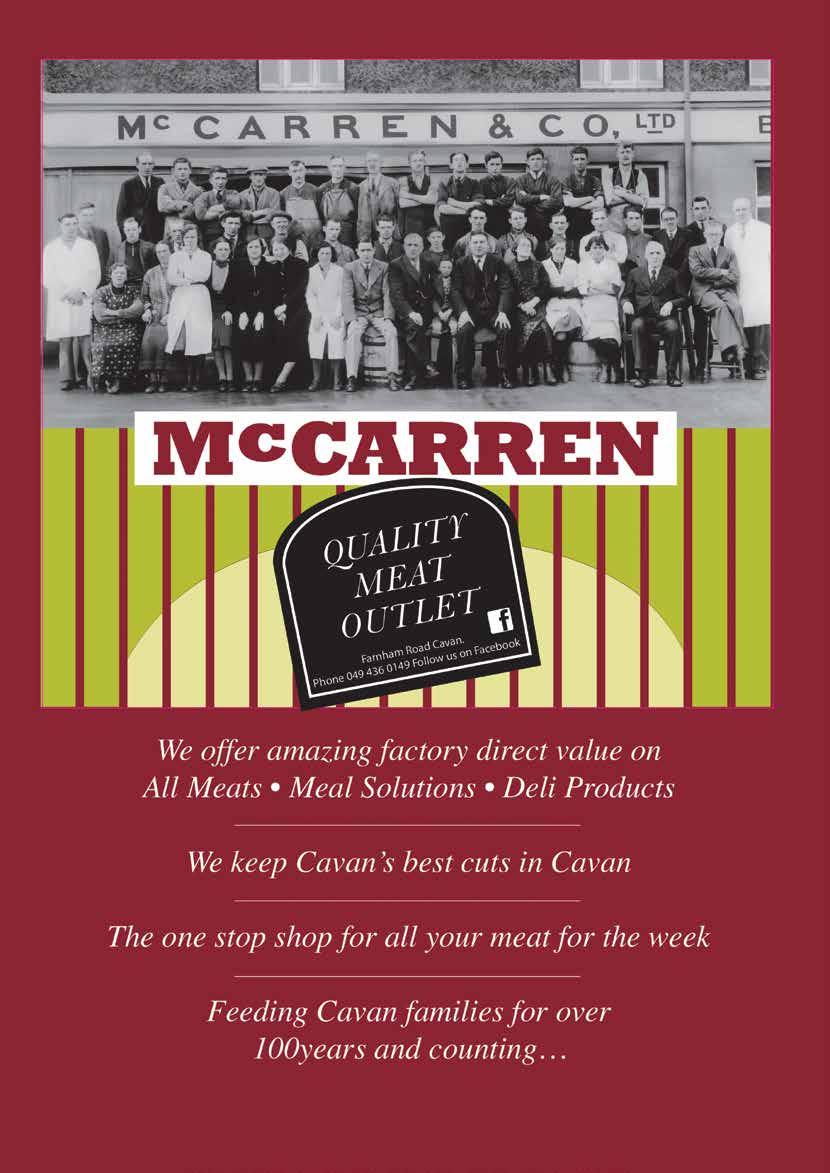
Reformulate or innovate?
Value engineering is a systematic approach to improving the value of goods and services by using an examination of function. The food industry constantly navigates an ever-changing and complex mix of external factors. Messaging relating to reducing fat, salt and sugar in diets and food choices, dovetailed by an increasing demand for ‘clean label’, requires recognisable and more natural-sounding ingredients. This is often allied with increased functionality to address the health and wellbeing concerns of consumers.
The rapidly changing geo-political and socio-economic climates are presenting food and beverage manufacturers with extraordinary challenges. Driven by high fuel prices, disrupted supply chains and climate impacts, inflation across the world is currently high. Some of the costs associated with food production and transportation can be absorbed by the industry, but inevitably, households globally are bearing the brunt of these increases.
The question faced by food producers is, ‘How can food products be reformulated or innovated to provide affordable nutrition to the educated consumer focused on health, wellness and sustainability?’
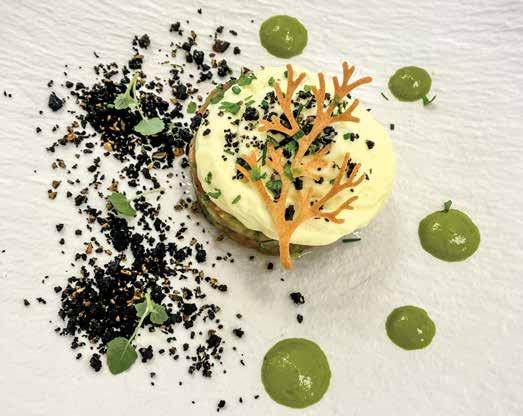
Value engineering and cost reductions
Value engineering and cost reductions are significant focuses for food formulators in 2023. Food and beverage brands should consider making nutritional information transparent to help customers find the right balance between product selection and budget management. Maintaining good nutrition at a given price point is a challenge.
Whether by reformulating, innovating or focusing on immediate manufacturing needs, food and beverage manufacturers who may want to consider how to maximise the value of their product line can achieve this in various ways:
• Reformulating for cost efficiency without damaging the unique profile of products, while retaining the same front-of-
pack traffic-light rating on the new products;
• Exploring alternatives for ingredients that face supply chain challenges;


• Adapting to the new environment by developing products that require less energy and preparation time.
There are several ways that formulators and manufacturers can reformulate projects focused on cost and process efficiencies. The right functional ingredients can be effective in reducing the overall cost of the product, maintaining the cleanlabel positioning and often providing beneficial nutritional advantages. For example, some ingredients such as fibres and proteins can be utilised for their functionality and can provide a clean-label contribution to the overall nutritional profile of the budget-conscious mindful nutritionist.
Another example is emulsifier replacement. Traditional emulsifiers
50 | FOOD IRELAND YEARBOOK 2023/24 value engineering
Alan O’Donnell, EMEA Technical Sales Manager, Foodology by Univar Solutions, outlines the benefits of value engineering with sustainability.
Alan O’Donnell, EMEA Technical Sales Manager, Foodology by Univar Solutions.


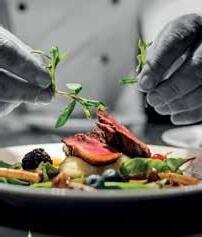
FOOD IRELAND YEARBOOK 2023/24 | 51
value engineering
have been widely used by food and beverage manufacturers. In today’s challenging environment where cost or availability issues prevail or where consumers prefer clean-label ingredients, a number of solutions exist. These technologies include enzymes, starches and plant proteins.

Our new product development experts have worked with food and beverage manufacturers across industry applications to support reformulation development and accelerate speed-to-market.
Reformulation in real-time
Innovative ingredients and solutions are available to deliver great customer experience for repeat purchase and brand loyalty. For example, extending shelf life in bakery is an option from both a cost consideration and reduction of waste point of view. Bakery producers can look into reducing waste and increasing profitability as enzymatic solutions for baking offer an alternative to help formulators meet the demand for more sustainable and healthier ingredients.
The recent shortage of sunflower oil sparked innovation in the edible oil sector. The team at Foodology by Univar Solutions assisted a savoury snacks company looking to reduce their annual usage of high oleic sunflower oil, achieving significant savings and production efficiency by switching to refined sunflower oil and antioxidant systems. Reduction or replacement of egg /egg powder is another example of formulating for value engineering. Egg is a versatile
ingredient, providing emulsification, texture and appearance in bakery glazes. Its use does not come without its challenges, however, such as cost, availability, handling and increasing demand for vegan ingredients. It is, though, possible to replace this functionality using plant-based proteins and starches, while also enjoying cost benefits.
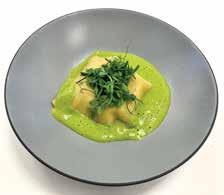
Maximum flavour impact in various applications can be achieved by using natural stevia flavour (NSF). For instance, one beverage producer using NSF was able to significantly reduce the dosage level of Madagascan vanilla and quality cocoa powder. If bitterness is an issue in your product, there will be an NSF solution to mask this.
staying ahead of rapidly changing customer trends, demand solutions that push us and our partners into what’s next. We support our customers by formulating products, performing benchmark prototyping, testing product performance and more. Our food solution centres and test kitchens are located in Chicago, Illinois, USA; São Paulo, Brazil; Mexico City, Mexico; Dubai (UAE); Valencia, Spain; and Istanbul, Turkey.
Gaining consumer trust and loyalty
Affordable nutrition, cost-efficient production and sustainability are top-ofmind for manufacturers. Reformulating or innovating for affordable nutrition will contribute to the principles that underpin the health of the population and the planet, and brands and manufacturers who can deliver this value, while meeting public and market expectations, can gain consumer trust and loyalty.
Food and beverage brands should consider making nutritional information transparent to help customers find the right balance between product selection and budget management. Value engineering and cost reductions are significant focuses for food formulators in 2023. For manufacturers, employing value engineering to deliver increased nutrition affordability and help budget-conscious consumers nourish themselves and their families should be a recipe for success. Learn more about value engineering solutions at univarsolutions.com/ foodology
Foodology by Univar Solutions offers a wide range of lab capabilities through our Solution Centres and test kitchens to help our customers and suppliers benchmark, analyse and launch food ingredient formulations. Experienced scientists and formulators can provide technical solutions and value-added services to help products get to market on-time and within budget. The needs of today, be they the transition to more sustainable and natural products or
52 | FOOD IRELAND YEARBOOK 2023/24
The question faced by food producers is: How can food products be reformulated or innovated to provide affordable nutrition to the educated consumer focused on health, wellness and sustainability?
Our food technology experts based at our food solution centres and test kitchens advise on formulation tools and ingredient alternatives to support reformulation development and accelerate speed-tomarket.
Value engineering and cost reductions are significant focuses for food formulators in 2023.
Foodology by Univar Solutions offers a wide range of lab capabilities through Solution Centres and test kitchens to help customers and suppliers benchmark, analyse and launch food ingredient formulations.
Horan: masters of automation
Horan Automation and Robotics are a local, family-owned business which was established in Cashel, County Tipperary, in 1996. Initially employing four people, their team has grown steadily to meet the demands of their developing client base. Today, the business employs a highly skilled team of 11 staff, including nine engineers across robotics, mechatronics, electrical, mechanical, design and software development. Their core business is the design, integration and commissioning of precision engineered bespoke solutions for the Irish manufacturing sector. For almost 30 years, they have proudly supported Irish industry across the dairy, food and beverage, automotive, medtech and pharma sectors, amongst others.
Leading global partnerships
In 2020, as a part of their ongoing innovation programme, Horan Automation and Robotics evolved their product and service offering, leading to the development of a series of successful partnerships with global brands such as Fanuc Robotics, Global AGV, Robos Logistic Systems and Intecro robotic welding systems, while building on existing relationships with long established key partners such as Carlow Toolmaking Services, Keyence Vision and Horan’s own contract manufacturing agency, Hualian Machinery China.
“The development and deepening of these partnerships have given us a unique, innovation-based leading edge over many of the other integrators in the market today,” notes Gary Monks, Sales & Marketing Director. “Our 24-7 service team provides peace of mind and rapid action to ensure operational uptime is maximised.”
AGV technology
AGV technology, in particular, has evolved both from a technological standpoint and vitally from a cost perspective to become a more intelligent choice for businesses whose output demands are challenged by pressures stemming from Ireland’s almost full labour market. AGV technology has actively enabled businesses to streamline internal logistical processes, increasing their ability to meet the demands of their customers more effectively.
“We work with some of Ireland’s key businesses to design, specify and integrate systems and solutions which support their production, outputs and bottom-line profitability,” Monks stresses. “From assembly all the way through to palletising, Horan Automation and Robotics are your partners in automation.”
HORAN AUTOMATION & ROBOTICS
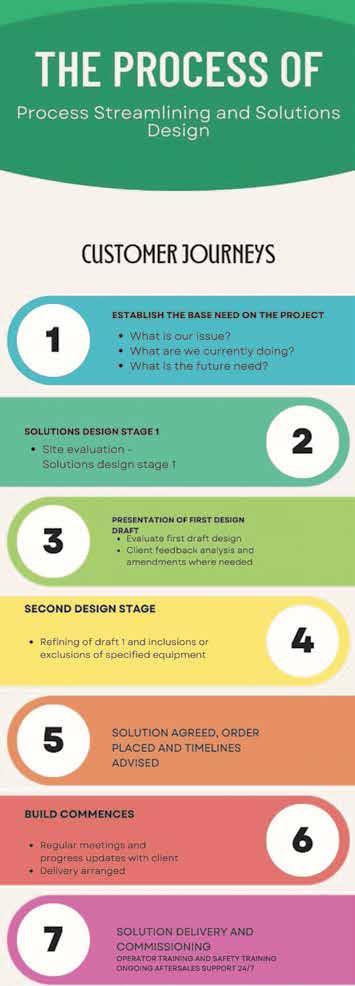
FOOD IRELAND YEARBOOK 2023/24 | 53 automation and robotics
SUPPLIERS OF COMPLETE SOLUTIONS
Looking for an online or blended training course?
UCC’s Food Industry Training Unit have a range of accredited & non-accredited courses for the food, agri-food and seafood sectors.

The Food Industry Training Unit (FITU) in the School of Food and Nutritional Sciences, University College Cork (UCC), is celebrating its 30th year. The Unit is home to over 30 part-time diplomas, certificates and short courses and provides part-time training, continuing education and professional
Registration Now Open for Accredited Courses 2023/2024
Diploma in Food Science and Technology (Level 7)
2 years part-time
This Diploma course is designed for those who wish to develop a good understanding of the basic principles of food science, food technology and food business. Particular emphasis is placed on linking scientific principles with their practical application in industry.
Contact: Nadia Grasso ngrasso@ucc.ie
Diploma in Speciality and Artisan Food Enterprises (Level 7) 1 year part-time



This Diploma course is intended for individuals who are starting or further developing a speciality/artisan food business, from the farm, home or production facility. It will also be of interest to those individuals who are involved in this sector as producers, retailers, chefs, buyers and food writers.
Contact: Angela Sheehan a.sheehan@ucc.ie
Diploma in Food Manufacturing Management (Level 7) 1 year part-time
The Diploma aims to provide relevant management education to delegates across all areas of business, with specific emphasis on food and beverage manufacturing and operations management. The programme will also develop interpersonal skills and enhance confidence in each member of the group.
Contact: Joe O’Callaghan joe.ocallaghan@ucc.ie
Graduate Development Programme: Diploma in Leadership for the Agri-Food Sector (Level 7) 1 year part-time
This programme is designed to meet the management and leadership development needs of young agri-food graduates in the first few years of their working life. Alongside the core technical business skills and best practice tools, the programme will equip participants with motivation and coaching skills that will enhance their professional identity and capability.
Contact: Clair Hoare clairhoare@ucc.ie
development for people working within the food, agri-food and seafood sectors.
FITU will be running a variety of blended (a mixture of face-toface and online learning) and online courses for 2023/2024. See below the list of accredited and non-accredited (short) courses.
Postgraduate Certificate in Dairy Technology and Innovation (Level 9) 1 year part-time
UCC and Teagasc have developed a Certificate in Dairy Technology and Innovation. This qualification runs from October to March and will enable and empower dairy industry personnel and those wishing to join the industry to implement best practice and embrace new technological developments in dairy processing. This course is a mixture of online and face-to-face classes in UCC and Teagasc, Co. Cork.
Contact: Amy-Jane Troy amyjane.troy@ucc.ie
Diploma in Dairy Technology and Innovation (Level 9) 1 year part-time
This diploma allows those who have completed the part-time Postgraduate Certificate in Dairy Technology and Innovation to develop and expand on key concepts underpinning the dairy processing technology sector and the innovations that advance its development. This course is a mixture of online and face-to-face classes in UCC, Co. Cork.
Contact: Nadia Grasso ngrasso@ucc.ie
Masters in Dairy Technology and Innovation (Level 9) 1 year part-time
This is a part-time work-based Masters and supports individuals in completing their Masters on a topic of relevance to the sector and of importance to their place of employment. The individual will be supervised by a member of the UCC Programme Team and mentored by a work-based colleague.
Contact: Nadia Grasso ngrasso@ucc.ie
Diploma in Corporate Direction (Food Business) (Level 7) 8 months part-time
The Diploma in Corporate Direction (Food Business) is a Management Development Programme for co-operative board members and senior management. This innovative programme was developed by the Irish Co-operative Organisation Society and University College Cork and is designed to address the special needs of co-operative board members and senior management in a rapidly changing agri-business environment.
Contact: Aoife Sammon a.sammon@ucc.ie
Non-Accredited Course 2023/2024
Cleaning in Place for the Food and Drink Industry
October 3 and 10, 2023 (Online)
Thermal Processing
November 20 & 21, 2023 (Face-to-face, with option for Online)
Essential Plant Hygiene for the Food & Drink Industry
November 28, 2023 (Online)
Cleaning in Place for the Food and Drink Industry
February 6 and 13, 2024 (Online)
Cheese Science and Technology
February 14, 15 & 16, 2024 (Face-to-face in UCC)
Concentration and Drying
February 20 & 21, 2024
Essential Plant Hygiene for the Food & Drink Industry
March 5, 2024 (Online)
Ice Cream Science and Technology
March 5, 6 & 7, 2024 (Face-to-face in UCC)
Food Process Engineering Principles
March 26, 2024 (Face-to-face in UCC)
Introduction to Food Chemistry
Ongoing (Online on Canvas)
Upcoming courses include:
Introduction to the Manufacture and Science of Cheese; The Science of Confectionery Processing and its Applications in the Food Industry;
The Science and Technology of Plant-Based Ingredients for Food Applications;
Rejuvenate – Upskilling Women returning to the Workplace.
For further information on any of the courses above, please visit the FITU website at www.ucc.ie/fitu
54 | FOOD IRELAND YEARBOOK 2023/24 ucc
Flexible pathways of progression for dairy professionals
UCC’s School of Food and Nutritional Sciences and the Food Industry Training Unit, in partnership with Taste 4 Success Skillnet, have established a number of new blended, flexible, stackable, part-time pathways to support the specialised lifelong learning requirements of dairy professionals. Formally announced by Minister Simon Coveney at the recent launch of the UCC Dairy Science Centre of Excellence, these new qualifications will build upon the already popular Postgraduate Certificate in Dairy Technology and Innovation.
What are the new courses?
• Introduction to Food Chemistry (Digital Badge Qualification)



Part-time Postgraduate Diploma in Dairy Technology and Innovation (Level 9)


• Part-time Masters in Dairy Technology and Innovation (Level 9)


Focusing on flexibility
• The new courses are blended in nature, with in-class sessions supported by online tutorials, combining a mixture of theory and practical application.
• Content is uploaded to the UCC online learning environment (Canvas) and notes and recordings are available 24/7.


• Individuals do not have to commit to a full year; they have the opportunity to select individual modules and ‘stack’ them together over a period of time to gain their qualification.
• Individuals that continue to Masters level are based in their workplace and
have the opportunity to work on a topic of relevance to themselves and their place of work.
Sustainability
The new short course on ‘Sustainability for the Dairy Sector’ is for industry participants who wish to increase their knowledge on sustainability and its impact on the dairy sector. The course focuses on the challenges and opportunities the dairy sector is facing to deliver on the 2030 Agenda for Sustainable Development and combines a mixture of online lectures with a practical day in UCC in November.
For further information on this course, please contact Dr Amy-Jane Troy at amyjane.troy@ucc.ie.
FOOD IRELAND YEARBOOK 2023/24 | 55 ucc
Information on cour ses from: Dr Amy-Jane Troy, Food Industry Training Unit, School of Food and Nutritional Sciences College of Science, Engine ering and Food Science University College, Cork Email: amyjane.troy@ucc.ie Ph: +353 (0) 21 4903178 Web: www.ucc.ie/en/ t u
A Family run business established in 1997, QPM LTD has developed a reputation for providing high performance systems, comprehensive support and specialist advice to the food and pharmaceutical manufacturing industry in Ireland.


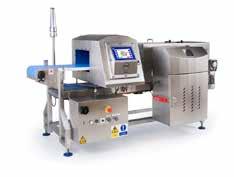

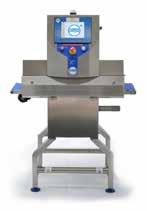
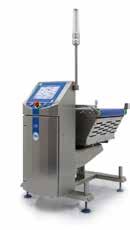


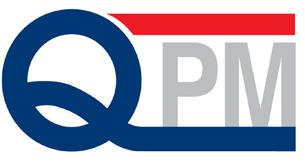











Metal Detection Xray Inspection Checkweighing Combo Systems CHECK & DETECT Inspektionsgeräte für die Lebensmittel-, Pharma- und Verpackungsindustrie Germany | +49 (0) 2064 43 7240 de.sales@loma.com Combo-Systeme Kontrollwaagen Metalldetektion Röntgeninspektion CHECK & DETECT Inspektionsgeräte für die Lebensmittel-, Pharma- und Verpackungsindustrie Germany | +49 (0) 2064 43 7240 de.sales@loma.com Metalldetektion | Röntgeninspektion | Kontrollwaagen | Service www.loma.com Combo-Systeme Kontrollwaagen Metalldetektion Röntgeninspektion CHECK DETECT Inspektionsgeräte für die Lebensmittel-, Pharma- und Verpackungsindustrie Combo-Systeme Kontrollwaagen Metalldetektion Röntgeninspektion About Us
Unit 12, Robinhood Business Park, Robinhood Road, Dublin 22. Tel: +353 (0) 1 450 2421 Web: www.qpm.ie sales@qpm.ie Unit 22, Scarva Road Industrial Estate, Banbridge, BT32 3QD INSPECTION TECHNOLOGIES Inspection Equipment for the Food, Pharmaceutical & Packaging Industry Combo Systems Checkweighing Metal Detection X-ray Inspection Food Ireland SP A4 Advert V3.indd 1 06/07/2023 14:20:07
QUALITY PACKAGING MACHINERY
SALES SERVICE CALIBRATION
Sales, Service and Calibration to the Food, Pharmaceutical and Packaging Industries FOR ALL OF YOUR CALIBRATION NEEDS ON YOUR INSPECTION EQUIPENT CONTACT QPM
• METAL DETECTORS • CHECKWEIGHERS

• X-RAY INSPECTION SYSTEMS • SCALES & WEIGHTS
• TEMPERATURE MEASURING EQUIPMENT
• DATA LOGGERS • pH METERS • GAS ANALYSIS
• MAGNETIC SEPARATORS • FREEZERS / OVENS
All calibrations are traceable to the National Standard All manufacturers and models covered Onsite / In house Calibrations Our experienced engineers and technicians can calibrate and test your systems as part of regular quality assurance and risk management audits Email: service@qpm.ie Phone: 01 4502421
NEW X5 4-inch Pipeline for higher volume inspection
Accurately measure chilled and frozen food temperatures with no waste.
The Celsius instrument measures the mean temperature of chilled and frozen food without damaging the packaging or the product allowing you to sell your tested items instead of throwing them away.

The X5 4-inch Pipeline is perfect for products made from re-formed muscle and protein such as large hams, gammon, salami, corned beef, and other free-flowing products.
Save product, save money, save the environment!
QPM LTD have been appointed as the distributors in Ireland for Sovereign
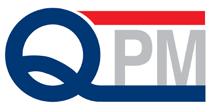

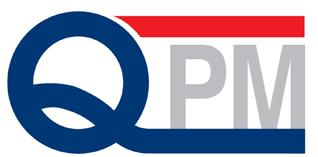

Labelling Machines
Sovereign Labelling Machines are a UK manufacturer and with over 25 years of experience are well established in the forefront of labelling and sleeving technology.

Protect Your Process - Magnetic Separation


A comprehensive range of high performance products to protect processes from metal contamination includes options for gravity, pneumatic or conveyor feed.

Unit 12, Robinhood Business Park, Robinhood Road, Dublin 22. Tel: +353 (0) 1 450 2421 Web: www.qpm.ie sales@qpm.ie Unit 22, Scarva Road Industrial Estate, Banbridge, BT32 3QD
SCAN TO FIND OUT MORE Food Ireland QP Advert V2.indd 1 8/1/2023 10:27:09 AM
Unlocking the power of proteins, fibres and alternative sweeteners
Whether it’s formulating plant-based products with protein, fortifying with fibre, or reducing sugar content, NCC Ingredients empowers the food industry to create products that align with the ever-changing demands of today’s health-conscious consumers.

In today’s rapidly evolving food industry, the demand for innovative and healthier ingredients continues to grow. NCC, a leading provider of food ingredients, are at the forefront of this movement. With a focus on health and wellness ingredients, NCC have seen a surge in demand for their extensive and cutting-edge range of proteins, fibres and sugar alternative ingredients.
Proteins: building blocks of nutrition and taste
The trend of incorporating protein into food products is set to continue. However, it is important for producers to utilise the right type of protein for their products, since some protein sources can have an aftertaste or specific texture. Fintan Mc Connell, of NCC, explains further: “At NCC, we offer a full array of protein-based ingredients that cater to various dietary needs and culinary applications that enhance the taste, texture and functionality of food products. NCC’s protein offerings include plant-based
options such as Cosun’s Tendra Fava Bean Protein Isolate, which complements our other vegetable proteins like pea, rice and soy proteins. These plant-based proteins are not only suitable for vegan and vegetarian diets but also serve as a viable alternative for individuals with dairy or gluten sensitivities. In the case of Tendra Fava Bean Protein Isolate, it is particularly suited for dairy and dairy-alternative products since it is flavour and aroma neutral.”
NCC can also offer other protein sources, including whey, collagen and even insect, providing high-quality protein sources that deliver excellent flavour, texture and functionality. These ingredients find applications in a wide range of products, including beverages, snacks, baked goods and in sports nutrition.
Fibres: promoting digestive health and clean labels
NCC understand the growing consumer demand for fibre-rich products and offer a diverse portfolio of fibre ingredients
that not only provide health benefits but also help manufacturers to meet clean label requirements.
“At NCC, we have a variety of soluble and insoluble fibres derived from sources like chicory root, cellulous, sugar cane, bamboo, pea, rice, barley and citrus,” explains Lisa Kelly, NCC’s food scientist. “These ingredients can be incorporated into a range of food and beverage applications, including cereals, bars, bakery products and dairy-alternatives. By leveraging NCC’s fibre solutions, manufacturers can create products that promote digestive health without compromising on taste or texture.”
Sweeteners: balancing taste and health
As consumers strive to reduce their sugar intake, the demand for natural and lowcalorie sweeteners has surged. According to NCC’s Fintan Mc Connell, “At NCC, we recognised this significant shift in consumer preference and we now provide a huge range of sugar alternatives that offer the perfect balance between taste and health. This sweetener offering includes natural alternatives like inulin, stevia (including our second generation stevia with no bitter after-taste), monk fruit, erythritol, amongst others. These ingredients provide a sweetening effect without the added calories and have gained popularity as healthier substitutes for traditional sugar. Our sweeteners can be seamlessly incorporated into a wide variety of food and beverage applications, including beverages, desserts and confectionery products.”
Conclusion
Through their protein offerings, NCC enable their customers to create nutritious and delicious products while meeting various dietary requirements. Their fibre ingredients not only support digestive health but also help food producers meet clean label expectations. Additionally, NCC’s natural sugar alternatives provide a healthier alternative to traditional sugar, allowing consumers to enjoy the sweetness they love without compromising on taste or wellness.
About NCC Food Ingredients
NCC Food Ingredients are an awardwinning sourcing provider of functional and innovative ingredients. Their customer base ranges from international producers of foods and beverages to small niche artisan creators of fine foods. For more information, visit www.nccingredients.com, call (01) 6131400 or email foodsales@ncc.ie.
58 | FOOD IRELAND YEARBOOK 2023/24
ingredients


FOOD IRELAND YEARBOOK 2023/24 | 59 How can we help? From sugar reduction to fibre fortification to plant-based protein formulations, NCC Food Ingredients enables the creation of products that meet the evolving demands of health-conscious consumers. Join the leaders and unlock the potential of innovation with NCC Food Ingredients. To learn more on how we can assist, contact NCC at: +353 1 613 1400 or email: foodsales@ncc.ie www.nccingredients.com
picking, packing & palletising
Gaining a pneumatic advantage with proportional valves
has a role to play. The gripping module of a packaging and palletising cell is equipped with vacuum technology, pneumatic drives, grippers and valve manifolds. The key piece of technology here is the proportional pressure regulator, which is integrated into the valve manifold CPX/ MPA on site. “It’s positioned exactly where the pressure is needed,” explained Ulrich Sixt, Festo Product Manager.
Leading German packaging machine manufacturers, Transnova Ruf are gaining a competitive edge by using Festo’s cutting-edge robotic and control technology, as well as pneumatic automation solutions.
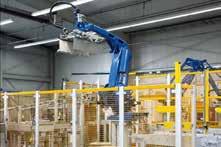

Whereas many packaging machine manufacturers rely on standard machines with sliding, stacking and sorting chains, leading German company Transnova Ruf are using tailored, robot-based packaging, palletising and handling solutions from Festo. This creates space-saving, energy-efficient compact systems with high power density and fast format changeovers.
This innovative company can now deliver well over 100 turnkey packaging lines per year for picking, packing and palletising. These solutions are precisely tailored to their customers’ requirements and cover the entire process chain for final packaging. As a result, the company is now recording double-digit annual growth.
Micro-modular systems
“We’ve given up our rigid machine programme approach and are now living in the world of micro-modularity. Just like with a Lego set, previously unimagined solutions can be produced thanks to this concept, which is unprecedented in packaging machine engineering,” said Michael Ruf. “Micro modules are functional elements that we use to configure the system specifically to the customer’s requirements. For each module, a CAD template is stored with the corresponding hardware and software. The modules are combined according to individual customer specifications. The result is a tailored packaging solution, a design-toorder solution in the truest sense of the word.”
Ruf believes this approach gives them a competitive edge. Each year, the company integrates about 200 robots that offer a number of key advantages: greater flexibility, especially for special purpose machines, better handling and faster format changeovers. “The focus is on the specific needs of the customer and those needs are different every time,” Ruf explained.
Pneumatic proportional technology
The market requires cost-effective production systems that can easily handle frequent product and format changeovers, and that is where pneumatic automation technology

The proportional pressure regulators VPPM regulate the contact pressure of the parallel gripper. The packaging must be gripped securely without deforming or damaging it. Gripping pressure is governed by various factors, such as fullness, packing density and weight. Control precision and repetition accuracy are also very important. Thanks to the proportional technology, adjustments can be made at any time. This is necessary because systems sometimes have to handle over 100 different formats, which are managed as recipe parameters in the SIMPLO software application developed by Transnova Ruf. The software allows machine operators with no programming skills to create new palletising patterns and import them into the robot control system during live production.
Diagnostics and remote maintenance
The proportional pressure regulators VPPM are embedded in the valve manifold CPX/MPA. Its electrical component has analogue and digital inputs and outputs that can be used to control and monitor individual sections of the process. The CPX can be accessed online via the internet for retrieval of diagnostic data. This means that whenever maintenance is required, remote diagnostics can be used to quickly determine whether the problem is easy to rectify or in extremely rare cases, whether the entire valve or valve manifold need to be replaced. “As a medium-sized company, we can now provide our global network of customers with the best possible service,” concluded Michael Ruf.
For more information, visit festo.com
60 | FOOD IRELAND
2023/24
YEARBOOK
Micro-modularity means that the system can be configured specifically to the customer’s requirements.
Festo’s pneumatic automation technology has a role to play in cost-effective production systems that can easily handle frequent product and format changeovers.
FOOD MANUFACTURING AND PACKAGING.
Highly efficient beverage bottling
Our hygienic, precise and durable automation solutions ensure that high-performance filling and packaging systems run reliably and without interruptions.
Food-safe meat processing

Automation solutions in clean design for precise and hygienic meat processingextremely sturdy and easy to clean, even in demanding conditions.
Automation in the baking industry
Always the best automation solutions for producing excellent bakery and confectionery products, from hygienic storage of the raw materials right up to s afe packaging.
In the food industry, food safety is crucial. But issues such as flexibility, viability for the future and sustainability also play an increasingly important role. We offer you smart solutions to meet these requirements.
Food safety
Food safety is a basic requirement. With Festo you can safely implement hygiene regulations. Our sturdy, clean design components can be cleaned easily, thoroughly and quickly.


Packaging industry
Festo supplies electric, pneumatic, and combined solutions for all packaging tasks and formats. For customized configuration and quick conversion.




FOOD IRELAND YEARBOOK 2023/24 | 61
+353(01)2954955 www.festo.ie/food
ales_ie@festo.com
s
Optimising efficiency and quality for modern factories with Bonner


In the fast-paced and competitive world of the food industry, precision and accuracy are paramount to ensure efficiency, productivity and adherence to rigorous quality standards. The implementation of expert calibration services can play a pivotal role in achieving these goals, leading to enhanced performance, reduced downtime and improved customer satisfaction.
The food industry is subject to stringent regulations and standards to ensure consumer safety and product integrity. Calibration services play an important role in meeting these requirements by providing documented evidence of accurate measurements and compliance. Regular calibration not only helps avoid regulatory issues but also fosters trust among consumers by demonstrating a commitment to quality assurance.
Industry 4.0
As the food industry embraces the transformative potential of Industry 4.0 and digitalisation, calibration services become even more critical. The integration of advanced technologies, such as the Internet of Things (IoT), artificial intelligence (AI), and data analytics, enables realtime monitoring, analysis and optimisation of production processes. Combining this with expert calibration services will complement this digital revolution by ensuring accurate measurement data, enabling intelligent decision-making and facilitating predictive maintenance. For over 45 years, Bonner have worked with clients to ensure compliance and seek to help their clients in the food industry in pursuing efficiency, quality and digitalisation for their modern factory.
For more information, visit bonner.ie
62 | FOOD IRELAND YEARBOOK 2023/24 calibration
services
C M Y CM MY CY CMY K ai165849213027_Bonner_FI2022_180x131_04.pdf 1 22/07/2022 13:15
Bonner have been offering exceptional calibration services to the food industry for over 45 years.
packaging solutions








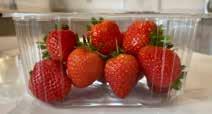
Waddington Europe: meeting environmental commitments




Waddington Europe, a Novolex brand, is a premier European food packaging specialist with a key manufacturing facility in Arklow, Co. Wicklow. They are a highly experienced and trusted supplier of food packaging solutions across a wide range of categories, including bakery, dairy, produce, protein, food-to-go, confectionery, pet food and more.
Their site at Arklow (formally Holfeld Plastics), established in 1978 and acquired by Waddington Europe in 2014, has become a leading rigid plastics packaging manufacturer, creating high quality, innovative products and solutions.
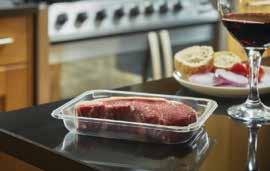
Meeting environmental commitments
Environmental sustainability is at the heart of all their business decisions, and Waddington are committed to minimising the impact of their activities on the environment.


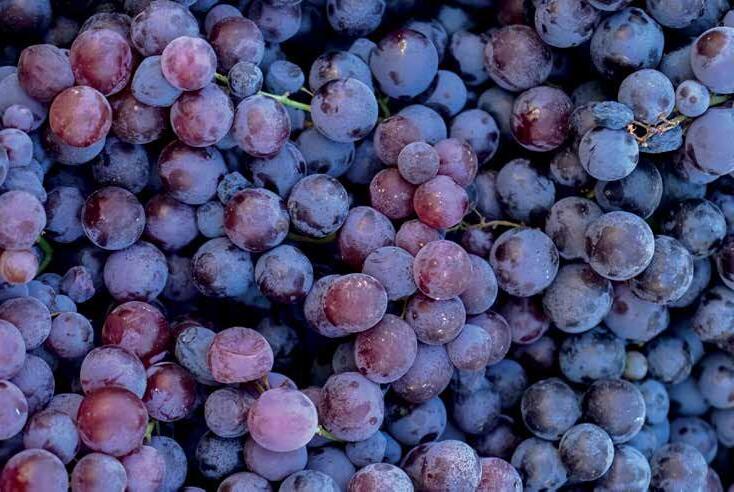
Waddington Europe Arklow help their customers to meet their own environmental commitments by offering high-recycled content and lower carbon footprint products. They design their sustainable food packaging products for recyclability and continually work to reduce the amount of material used in their products through downgauging.
Their Eco Blend Pura and Eco Blend 100 products are made of 100% recycled PET (rPET), most of which is purchased locally from Shabra, Ireland’s leading recycler and reprocessor of post-consumer waste. Eco Blend products are fully recyclable too, offering customers circularity in their packaging solutions at competitive prices.
Waddington Europe are also proud to have achieved Zero Waste to Landfill certification across all their production sites.
“Through exceptional service, execution and an unwavering focus on sustainable and innovative solutions, we strive to make a difference to our customers, our communities and our planet every day,” explains Nigel Riley, General Manager, Waddington Europe Arklow.
For more information, visit www.waddingtoneurope.com
We stay ahead of a constantly moving consumer world by being agile, innovative and passionate about the possibilities of packaging


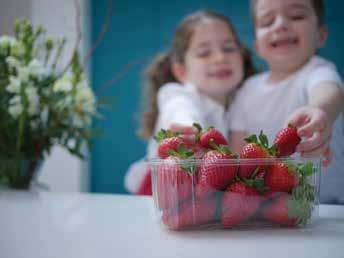
From design, tooling manufacturing to extrusion, we take care of everything in-house
Because
we know the huge role we play in creating a world that our children – and their children – can enjoy
Waddington Europe are leaders in rigid plastics, creating high quality, innovative products and solutions.
That’s why we do more than
Working each day to be part of the solution not part of the problem We take pac y. www waddingtoneurope com E: info@waddingtoneurope.com Tel: +353 402 41234
simply excel at packaging.
Product & Service Index
F ood
ACCREDITATION
Air Products Ireland Ltd
ATLAS for Industry
BARCODING / LABELLING
AIS Ltd - Automatic Identification Systems
ATLAS for Industry
Avery Weigh-Tronix
Carabay Packaging Products
Com-Plas International
DSG Packaging Ltd
Fischbein-Saxon
GS1 Ireland
JMC Packaging Ltd
Obeeco Ltd
QPM Ltd
SAI Global
Tekpak Automation Ltd
Versatile Packaging Ltd
Weber Packaging Solutions Ltd
CLEAN IN PLACE SKIDS
Flexachem Manufacturing
CONSUMER TASTE TESTING & SENSORY RESEARCH
Bord Bia
Innovate Solutions
EDUCATION /TRAINING / CERTIFICATE /CONSULTANCY
GS1 Ireland
Horan Automation and Robotics
Irish National Accreditation Board
JMC Packaging Ltd
KUKA Ireland Ltd
National Standards Authority of Ireland (NSAI)
Repak Ltd
safefood
SAI Global
UCC - School of Food and Nutritional Sciences
UCD School of Agriculture and Food Science
ENERGY / UTILITIES MANAGEMENT
Astatine
Bonner
Calor
Festo Ltd
EXTRUDED THERMOPLASTIC SHEETING
Xtrupak Ltd
FOOD GRADE/COMPATIBLE
ROBOTIC AUTOMATION
Horan Automation and Robotics
KUKA Ireland Ltd
Versatile Packaging Ltd
FOOD SAFETY
AUDITING
Festo Ltd
SAI Global
CONSULTANTS
Air Products Ireland Ltd
Festo Ltd
SAI Global
CONTAMINANT CONTROL
Festo Ltd
CONTROL /INSTRUMENTATION
Advanced Packaging Machinery Ltd
Bonner
Festo Ltd
KUKA Ireland Ltd
QPM Ltd
FOREIGN BODY REMOVAL
Festo Ltd
QPM Ltd
HYGIENE
Carabay Packaging Products
Enviroclad Systems Ltd
Festo Ltd
safefood
TESTING/INSPECTION
Advanced Packaging Machinery Ltd
Air Products Ireland Ltd
Bonner
DSG Packaging Ltd
Festo Ltd
QPM Ltd
Teagasc Food Research Programme
Moorepark and Ashtown
Weber Packaging Solutions Ltd
TRACKING SYSTEMS
Festo Ltd
GS1 Ireland
Weber Packaging Solutions Ltd
WrenTech Ltd
FOOD LUBRICANTS
Corcoran Chemicals Ltd
Festo Ltd
Kevin Woods Machinery
GENERAL SERV ICES /SUPPLY TO THE TRADE
Advanced Packaging Machinery Ltd
AIC Plastic Pallets Ltd
ATLAS for Industry
Avery Weigh-Tronix
BIM/Irelands Seafood Development Agency
Blenders
Bord Bia - The Irish Food Board
Carabay Packaging Products
Com-Plas International
Fisher Scientific
Flexachem Manufacturing
Foodology by Univar Solutions
Irish National Accreditation Board
JMC Packaging Ltd
Kevin Woods Machinery
National Standards Authority of Ireland (NSAI)
Puratos Crest Foods Ltd
QPM Ltd
Saica Pack Ireland
Sustainable Energy Authority of Ireland
Weber Packaging Solutions Ltd
HEALTH & SAFETY
Enviroclad Systems Ltd
Festo Ltd
SAI Global
WrenTech Ltd
IDENTIFYING BUSINESS DEVELOPMENT
GS1 Ireland
Invest Northern Ireland
64 | FOOD IRELAND YEARBOOK 2023/24 IRELAND 2023/24 Yearbook & Directory
INDUSTRIAL WASHING EQUIPMENT
Festo Ltd
Flexachem Manufacturing
Foodology by Univar Solutions
Kevin Woods Machinery
INGREDIENTS
AB Mauri UK & Ireland
Andrew Ingredients Ltd
Azelis Ireland Limited
Brenntag
Camida Ltd
Corcoran Chemicals Ltd
D.D. Williamson (Ireland) Ltd
Foodology by Univar Solutions
Tirlán
Greencore Group
Heterochem (Dist.) Ltd
Innovate Solutions
Kiernan’s Food Ingredients Ltd
NCC Food Ingredients
Nutrition Supplies
O’Brien Ingredients
Ornua
Puratos Crest Foods Ltd
IT SERVICES & OUTSOURCING
DSG Packaging Ltd
Weber Packaging Solutions Ltd
MATERIALS HANDLING
SERVICE CONTROL / INSTRUMENTATION
Advanced Packaging Machinery Ltd
Avery Weigh-Tronix
Bonner
Endress + Hauser Ireland Ltd
Flexachem Manufacturing
Horan Automation and Robotics
Kevin Woods Machinery
KUKA Ireland Ltd
QPM Ltd
Tekpak Automation Ltd
WrenTech Ltd
MACHINERY / EQUIPMENT
ABB Ltd
Advanced Packaging Machinery Ltd
AIC Plastic Pallets Ltd
Air Products Ireland Ltd
Avery Weigh-Tronix
Carabay Packaging Products
Endress + Hauser Ireland Ltd
Ene Limited
Festo Ltd
Flexachem Manufacturing
Fischbein-Saxon
Horan Automation and Robotics
JMC Packaging Ltd
Kevin Woods Machinery
KUKA Ireland Ltd
NPP
Obeeco Ltd
QPM Ltd
Syspal
Tekpak Automation Ltd
Toyota Material Handling Ireland
WrenTech Ltd
PALLETS, CRATES & CONTAINERS
AIC Plastic Pallets Ltd
Carabay Packaging Products
Dollard Packaging Ltd
Donoghue Packaging
Festo Ltd
Horan Automation and Robotics
JMC Packaging Ltd
Mid Cork Pallets & Packaging
Quitmann O’Neill Packaging Ltd
Saica Pack Ireland
Schütz (Ireland) Ltd
Syspal
WrenTech Ltd
PUMPS & VALVES
Bonner
Festo Ltd
Flexachem Manufacturing
Horan Automation and Robotics
Kevin Woods Machinery
WrenTech Ltd
REFRIGERATION / COLD STORAGE
Air Products Ireland Ltd
CRS Mobile Cold Storage Ltd
DSG Packaging Ltd
Festo Ltd
Horan Automation and Robotics
Ornua
Syspal
SERVICE & CALIBRATION
Bonner
Endress + Hauser Ireland Ltd
Horan Automation and Robotics
JMC Packaging Ltd
NPP
QPM Ltd
TRANSPORT & LOGISTICS
Avery Weigh-Tronix
DSG Packaging Ltd
Horan Automation and Robotics
Ornua
Quitmann O’Neill Packaging Ltd
Toyota Material Handling Ireland
WrenTech Ltd
WASTE MANAGEMENT/RECYCLING
Avery Weigh-Tronix
Horan Automation and Robotics
Kevin Woods Machinery
Quitmann O’Neill Packaging Ltd
PACKAGING AUDITS
Carabay Packaging Products
NPP
Repak Ltd
product & service index
PACKAGING /DESIGN / LABELLING
AiP Thermoform Packaging
Air Products Ireland Ltd
ATLAS for Industry
Carabay Packaging Products
Com-Plas International
Corcoran Products (Irl) Ltd
Diamond Corrugated
Dollard Packaging Ltd
Donoghue Packaging
DSG Packaging Ltd
Ene Limited
Fischbein-Saxon
Greiner Packaging Ltd
GS1 Ireland
Horan Automation and Robotics
JMC Packaging Ltd
Kevin Woods Machinery
Kiernan’s Food Ingredients Ltd
Measom Freer & Co. Ltd
Mid Cork Pallets & Packaging
NPP
Obeeco Ltd
Ornua
Quitmann O’Neill Packaging Ltd
Repak Ltd
Schütz (Ireland) Ltd
Sealed Air Ltd
Smurfit Kappa Ireland
Syspal
Tekpak Automation Ltd
The Packaging Centre Ltd
Versatile Packaging Ltd
Waddington Europe
Weber Packaging Solutions Ltd
WrenTech Ltd
Xtrupak Ltd
PEST CONTROL /FLY SCREENS
Rentokil Pest Control
PLANT MAINTENANCE
AQS Environmental Solutions
Advanced Packaging Machinery Ltd
Bonner
Corcoran Products (Irl) Ltd
Endress + Hauser Ireland Ltd
Flexachem Manufacturing
Horan Automation and Robotics
Kevin Woods Machinery
Obeeco Ltd
QPM Ltd
PROCESSING EQUIPMENT
BAKERY
Advanced Packaging Machinery Ltd
Air Products Ireland Ltd
Avery Weigh-Tronix
DSG Packaging Ltd
Endress + Hauser Ireland Ltd
Ene Limited
Festo Ltd
Flexachem Manufacturing
FOOD IRELAND YEARBOOK 2023/24 | 65
product & service index
Horan Automation and Robotics
JMC Packaging Ltd
Kevin Woods Machinery
Obeeco Ltd
Puratos Crest Foods Ltd
QPM Ltd
Syspal
Versatile Packaging Ltd
WrenTech Ltd
DAIRY
Advanced Packaging Machinery Ltd
Air Products Ireland Ltd
Avery Weigh-Tronix
David Kellett & Partners Ltd
DSG Packaging Ltd
Endress + Hauser Ireland Ltd
Ene Limited
Festo Ltd
Flexachem Manufacturing
Horan Automation and Robotics
JMC Packaging Ltd
Kevin Woods Machinery
Obeeco Ltd
QPM Ltd
Syspal
Versatile Packaging Ltd
WrenTech Ltd
DRINK
Advanced Packaging Machinery Ltd
Air Products Ireland Ltd
Avery Weigh-Tronix
DSG Packaging Ltd
Endress + Hauser Ireland Ltd
Ene Limited
Festo Ltd
Flexachem Manufacturing
Horan Automation and Robotics
JMC Packaging Ltd
Obeeco Ltd
QPM Ltd
Syspal
Versatile Packaging Ltd
WrenTech Ltd
FRESH FOOD
Advanced Packaging Machinery Ltd
Air Products Ireland Ltd
Avery Weigh-Tronix
DSG Packaging Ltd
Endress + Hauser Ireland Ltd
Ene Limited
Festo Ltd
Flexachem Manufacturing
Horan Automation and Robotics
JMC Packaging Ltd
Kevin Woods Machinery
Obeeco Ltd
Puratos Crest Foods Ltd
QPM Ltd
Syspal
Versatile Packaging Ltd
WrenTech Ltd
MACHINERY AUCTIONEERS
Air Products Ireland Ltd
Endress + Hauser Ireland Ltd
Festo Ltd
MEAT, FISH & POULTRY
Advanced Packaging Machinery Ltd
Air Products Ireland Ltd
Avery Weigh-Tronix
DSG Packaging Ltd

Endress + Hauser Ireland Ltd
Ene Limited
Festo Ltd
Flexachem Manufacturing
Horan Automation and Robotics
JMC Packaging Ltd
Kevin Woods Machinery
Obeeco Ltd
QPM Ltd
Syspal
Versatile Packaging Ltd
WrenTech Ltd
WASTE WATER EQUIPMENT
Endress + Hauser Ireland Ltd
Festo Ltd
Flexachem Manufacturing
Kevin Woods Machinery
PRODUCTION OPTIMISATION
Endress + Hauser Ireland Ltd
Fischbein-Saxon
Flexachem Manufacturing
Horan Automation and Robotics
JMC Packaging Ltd
KUKA Ireland Ltd
Versatile Packaging Ltd
PRODUCTION SKIDS
Endress + Hauser Ireland Ltd
Flexachem Manufacturing
RESEARCH & DEVELOPMENT
BIM/Irelands Seafood Development Agency
Bord Bia - The Irish Food Board
Horan Automation and Robotics
Innovate Solutions
JMC Packaging Ltd
KUKA Ireland Ltd
Ornua
safefood
Teagasc Food Research
UCC - School of Food and Nutritional Sciences
Weber Packaging Solutions Ltd
WrenTech Ltd
STAINLESS STEEL FABRICATION
Ene Limited
Festo Ltd
Horan Automation and Robotics
Kevin Woods Machinery
Syspal
WrenTech Ltd
SUSTAINABILITY AND TRACEABILITY TRACKING SOLUTIONS
Bord Bia
GS1 Ireland
Horan Automation and Robotics
TANK CLEANING
Flexachem Manufacturing
TRADE ASSOCIATIONS
Bord Bia
GS1 Ireland
66 | FOOD IRELAND YEARBOOK 2023/24
company listings
aAbb Ltd
Address: Orion House, Maidstone Road, Kingston, Milton Keynes, MK10 OBD.
Tel: (0044) 1908 350 300
Email: robotics@gb.abb.com
Web: www.abb.com
www.abb.com/robotics
Main Products & Services:
ABB is a leading supplier of industrial robots, modular manufacturing systems and service. A strong solutions focus helps manufacturers improve productivity, product quality and worker safety. ABB has installed more than 200,000 robots world wide.
AB Mauri UK & Ireland
Address: Barn Way, Lodge Farm, Northampton, NN5 7UW.
Tel: (0044) 1604 755 522
Email: Damien.McDonald@abmauri.com
Web: www.cereform.co.uk
Main Products & Services:
Dough conditioners, yeast, soya flours, sour doughs, cake & donut mixes, icings & fillings.
Contact: Director of Sales (Ireland): Damien McDonald
Advanced Packaging Machinery Ltd

Address: 718 Northwest Business Park, Ballycoolin, Dublin 15.
Tel: (01) 861 2141
Email: info@test.ie
Web: www.packagingmachinery.ie
Main Products & Services:
Metal detectors, x-ray inspection systems, check weighers & label applicators.
Contact: Director: Kevin Gaines
AIC Plastic

Pallets Ltd
Address: The Woodlands, Carrigmore, Ballineen, Co. Cork.
Tel: (023) 884 7333
Email: info@aicplastics.com
Web: www.aicplastics.com
Main Products & Services: Plastic, timber and aluminium pallets, pallet boxes, totes, storage boxes, stacking containers, slipsheets, linbins, bespoke pallets and boxes (aluminium and plastic).
Contact: Joe O’Flynn
AiP Thermoform Packaging
Address: Unit 1 A Ballymaley Business Park, Barefield, Ennis, Co. Clare.
Tel: (065) 686 4486
Email: info@aip.ie
Web: www.aip.ie
Main Products & Services: Design and manufacture services of Thermoform Packaging for the Irish market.
Air Products Ireland Ltd
Address: Unit 950, Western Industrial Estate, Killeen Road, Dublin 12.
Tel: 1800 99 50 29
Web: www.airproducts.ie
Main Products & Services: Air Products brings you the latest, most innovative solutions in cryogenic freezing, chilling, cooling and Modified Atmosphere Packaging. Freshline Gases® include CO2, Nitrogen and Oxygen in liquid or gaseous form. Backed by over 40 years’ knowhow in food processing. To find out more please visit our website.
AIS Ltd - Automatic Identification Systems
Address: Unit 48, Canal Walk, Park West Industrial Park, Nangor Road, Dublin 12.
Tel: (01) 620 5742
Email: info@aisltd.ie
Web: www.aisltd.ie
Main Products & Services:
RFID equipment,automatic labelling, print & applysystems, industrial barcode scanning, 2D barcode equipment, hand held readers, mobile computers, fixed mount scanning, label printers, mobile printers, desktop printers, industrial printers, barcode printers, labels & ribbons. Supply, install & maintenance of auto ID products. Custom solution development for product traceability suitable for you.
Andrew Ingredients Ltd
Address: 27 Ferguson Drive, Knockmore Hill Industrial Park, Lisburn, Co. Antrim, BT28 2EX.
Tel: (048) 9267 2525
Email: info@andrewingredients.co.uk
Web: www.andrewingredients.ie
Main Products & Services:
• Food and Bakery ingredients, flour, bread, cake and confectionery mixes, gluten free and vegan products, icings, dried fruit, savoury and sweet sauces, colours and flavours, baking powders, raising agents, sugar etc.
• Dedicated technical team.
• Test Bakery and Kitchen available to existing and potential customers to support NPD, innovation and problem solving.
AQS Environmental Solutions
Address: Galmoy via Thurles, Castletown, Johnstown, Co. Kilkenny.
Tel: 0504 57841
Email: stan@aqssolutions.ie
Web: www.aqssolutions.ie
Main Products & Services: Industrial Cleaning Services.
Contact: Commercial Director: Stan O’Reilly
FOOD IRELAND YEARBOOK 2023/24 | 67
company listings
Astatine
Address: Suite 301, Guinness Enterprise Centre, Dublin 8, D08 T1WY.
Tel: (01) 525 3006
Email: pat.nolan@astatine.ie
Web: www.astatine.ie
Main Products & Services: Solar PV and High Temperature Heat Pump installation.
Contact: Chief Operating Officer: Pat Nolan
Azelis Ireland Limited

Address: Unit 23, Sandyford Office Park, Blackthorn Avenue, Sandyford Industrial Estate, Foxrock, Dublin 18.
Tel: (01) 295 6977
Fax: (01) 295 8338
Email: graeme.locke@azelis.ie
Main Products & Services: Food Ingredients.
Contact: Managing Director: Graeme Locke
Bonner
Instrumentation, Calibration and Automation Solutions
Address: 35 Western Parkway Business Centre, Ballymount Drive, Ballymount, Dublin 12, D12 X542.
Tel: (01) 450 5050
Email: contact@bonner.ie
Web: www.bonner.ie
Main Products & Services: Services inc. Calibration, Maintenance, Analysis & Temperature Mapping, Instrumentation products for measurement and control, Automation & Control solutions.
for Industry
Atlas for Industry
Address: Glen Vale, 178 Portadown Road, Richhill, Co. Armagh, BT61 9LJ.
Tel: 0044 (0) 28 3887 0166
Web: www.atlasforindustry.ie
Main Products & Services:
Manufacture of self-adhesive labels both plain & printed, in various substrates.
Predominantly, Mid-Gloss Paper, Thermal Paper, and synthetics. We also manufacture A4 Laser Labels in a range of formats, starting at 1/sheet; up to 84/ sheet (permanent & removable).
Manufacture of tags & tickets for meat plants / garden centres / engineering etc.
Supply of label printers from Zebra / Citizen / Godex / TSC. Transfer ribbons for label printers, economy / mid-range & premium grades.
Contact: Managing Director: David Nethercote
Avery Weigh-Tronix
Address: Dublin:
Unit L11, Greenogue Business Park, Rathcoole, Dublin.
Tel: (01) 400 0700
Address: Antrim:
Units 52/58, Mallusk Enterprise Park, Newtownabbey, BT36 4GN.
Tel: (028) 9083 9092
Email: webinfo@awtx-itw.com
Web: www.averyweigh-tronix.com/ ireland
BBIM/Ireland’s Seafood Development Agency
Address: Crofton Rd, Dun Laoghaire, Co. Dublin.
Tel: (01) 214 4100
Email: info@bim.ie
Web: www.bim.ie
Main Products & Services: Bord Iascaigh Mhara (BIM) helps to develop the Irish Seafood Industry by providing technical expertise, business support, funding, training and promoting responsible environmental practice.
Blenders
Address: Whitestown Road, Tallaght, Dublin 24, D24 VY75.
Tel: (01) 453 6960
Fax: (01) 453 7607
Email: sales@blenders.ie

Web: www.blenders.ie
Main Products & Services: Mayonnaises, dressings, bouillons, cooking sauces, table sauces, carvery sauces, relishes in bulk catering, sachets, dip-pots and retail jar formats. Branded and private label.
Contact: Managing Director: Patrick Bonner
Service Manager: Roddy Jefferson Automation Solutions Manager: Darran Roche
Bord BiaThe Irish Food Board
Address: 140 Pembroke Road, Dublin 4, D04 NV34.
Tel: (01) 668 5155
Email: info@bordbia.ie


Web: www.bordbia.ie
Main Products & Services: Marketing, promotion and development of Irish food, drink and horticulture.
Brenntag
Address: Unit 405, Greenogue Business Park, Rathcoole, Dublin 24.
Tel: +353 (0) 1 4013500
Email: dublin.sales@brenntag.ie
Web: www.brenntag.com
Main Products & Services: Food ingredients, cake mixes, blends, NPD.
Contact: Key Account Manager: James Dixon
68 | FOOD IRELAND YEARBOOK 2023/24
ATLAS
CCalor
Address: Long Mile Road, Dublin 12. Tel: (01) 450 5000
Web: www.calorgas.ie
Main Products & Services: Supply of LPG in bulk tanks or cylinders.
Contact: Chief Commercial Officer: Oliver Kenny.
Com-Plas International
Address: Unit F5 & F6, Southern Link Business Park, Naas, Co. Kildare, Ireland, W91 RT9P.
Tel: +353 (0)45 874 088
Email: sales@complas.ie
Web: www.complasinternational.ie
Main Products & Services: Packaging products for food, pharma and chemical industries.

Corcoran Chemicals Ltd
Address: 17 Parkgate Street, Dublin 8.
Tel: (01) 633 0400
Fax: (01) 679 3521
Email: info@corcoran-group.com
Camida Ltd
Address: New Quay, Clonmel, Co. Tipperary, E91 YV66.
Camida Ltd., Tower House, New Quay, Clonmel, Co Tipperary, Ireland.
Tel: (052) 612 5455
Mobile: (087) 622 6810
Web: www.corcoran-group.com
Main Products & Services: Distributors of raw materials for the food, pharmaceutical, polymer & chemical industry.
Contact: Sales
company listings
CRS Mobile Cold Storage Ltd
Address: Summerhill Enterprise Centre, Summerhill, Co. Meath, A83 XE40.
Tel: (046) 943 5000
Email: enquiry@crs.ie
Web: www.crs.ie
Main Products & Services:
Increase your on-site cold storage capacity: CRS offer a wide range of temperature controlled storage solutions both new and professionally refurbished for short and longterm rental. Our products include 1-400 pallet portable cold stores and 25-115kw portable blast freezers.
Contact: Michael O’Keefe
t: +353 52 6125455
Email: michael.odonovan@camida.com
Web: www.camida.com
Main Products & Services:
e: joe.guiney@camida.com
m: +353 86 2413223
w: www.camida.com
Ingredients (Food, Beverage, Feed). Natural Emulsifiers (Soya & Sunflower Lecithin), Synthetic Emulsifiers (Esters)
Sweeteners (Sucralose, Sodium Saccharin and Sodium Cylamate), Antioxidants and Natural Vitamin
E, Spray Crystallised High Performance Fats.
Feed Sector – Glycinates (Copper, Iron, Manganese & Zinc), Dicalcium Phopshate, Xanthan Gum, Stevia Extract, Glucose Syrup, Glycine, Oils & Waxes.
Corcoran Products (Irl) Ltd
Address: Unit 12 Northern Cross Business Park, Finglas, D11 DC67, Ireland.
Tel: (01) 864 4422
02/06/2015 12:48
Email: info@corcoran-group.com
Web: www.corcoran-group.com
Main Products & Services: Suppliers of packaging to the food, pharmaceutical and chemical industry.
DDiamond Corrugated
Address: 12-13 Pennyburn
Industrial Estate, Londonderry, Northern Ireland, BT48 OLU.
Tel: +44 (0) 02871 262 957
Email: info@diamondcorr.com
Web: www.diamondcorr.com
Dollard Packaging Ltd
Address: Units 6-11, Eklad Park, Malahide Road Industrial Park, Malahide Road, Dublin 17.
Tel: (01) 847 0044
Contact:
Sales Manager: Michael O’Donovan
Carabay Packaging Products

Address: Units 1-5
Liosban Industrial Estate, Tuam Road, Co. Galway, H91 C793.
Tel: (091) 773 370
Web: carabay.ie
Contact: Sales Director:
Kenneth Casburn
Contact: Derek Lennon
Email: sales@dollard-packaging.ie
Web: www.dollard-packaging.ie
Main Products & Services: Print and Packaging.
Donoghue Packaging
Address: Donpack Business Park, Bandon, Co. Cork
Tel: (023) 884 2111
Email: donpack@donpack.ie
Web: www.donpack.com
Main Products & Services:
Manufacturers of Waxed Solid Board & Corrugated Packaging Products.
Contact: Managing Director: Ray Donoghue
FOOD IRELAND YEARBOOK 2023/24 | 69
Search
over
the a product. team UINEY
your
is over
LIFE SCIENCE INDUSTRIAL INgREDIENTS
Search
company listings
DSG Packaging Ltd
Address: Unit 1D Willow Drive, Newhall, Naas Enterprise Park, Co. Kildare.
Tel: (045) 884 200
Email: pmoloney@dsgpack.ie
Web: www.dsgpack.ie
Main Products & Services: Specialists in Contract Packaging, Outsourcing and “End of Line” Filling and Packaging Services.
EEndress+Hauser Ireland Ltd
Address: Exchequer House, Embassy Office Park, Kill, Co. Kildare.
Tel: (045) 989 200
Email: info.ie@endress.com
Web: www.ie.endress.com
Main Products & Services: Endress+Hauser are a global leader in instrumentation solutions and services for the food and beverage industry.

Ene Group
Address: Unit 24, Scarva Road Industrial Estate, Banbridge, Co. Down, BT32 3QD
Tel: +44 28 4062 2215
Email: info@eneconveyors.com
Web: www.enegroupltd.com
Main Products & Services: Conveyor systems and replacement belts.
Contact: Belting Manager: Darren Horner
Enviroclad Systems Ltd
Address: Unit 57B, Hebron Industrial Estate, Hebron Road, Co. Kilkenny.
Tel: (056) 775 2866
Email: info@enviroclad.com
Web: www.enviroclad.com
Main Products & Services: Supply and Fitting of Enviroclad Hygienic Wall and Ceiling Cladding in P.V.C. for the Food Industry.
FFesto Ltd
Address: Head Office: Unit 5, Sandyford Park, Sandyford Industrial Estate, Dublin 18.
Tel: (01) 295 4955
Fax: (01) 295 5680
Email: sales_ie@festo.com
Web: www.festo.com/ie
Main Products & Services:
Automation Technology
· Industrial Automation
· Electrical Automation
· Process Automation Training & Consulting Food, Beverage & Packaging Expertise.
Fisher Scientific

Address: 3rd Floor, Kilmore House, Park Lane, Spencer Dock, Dublin 1.
Tel: (01) 885 5854
Email: fsie.sales@thermofisher.com
Web: www.fishersci.ie
Business: Laboratory supplies, Chemicals, Consumables, Reagents, Equipment & Instruments.

Flexachem Manufacturing


Address: Donnybrook Commercial Centre, Douglas, Cork, T12 X68Y.
Tel: (021) 461 7200
Email: michael.bradley@flexachem.com
Web: www.flexachem.com
Main Products & Services: Mechanical & Process Solutions, Pumps, Valves, Mechanical Seals.
Contact: Sales: Michael Bradley
Fischbein-Saxon
Address: 274 Alma Road, Enfield, Middlesex, EN3 7BB, England.
Tel: (0044) 208 344 6600
Email: salesuk@fischbein.com
Web: www.fischbein.com
Main Products & Services:
Through the recent partnership with VOTECH, FISCHBEIN enhances its ability to offer fully automatic Dosing, Bagging and Palletizing lines, as well as Pallet Wrapping and Stretch-Hooders. The Votech brand is known for providing high-precision, hygienic solutions, in the food and powder sectors such as Milk, Animal Feeds, Food Flavours, Flour Milling, Fertilizers, Pellets, Horticulture, and associated products. Votech exudes quality, robustness, and reliability, and as a result, have thousands of successful installations, and a reputation with our clients, that precedes our name.
Contact: Sales & Services Director: Barry Cox
Foodology by Univar Solutions

Address: 536 Grants Crescent, Greenogue Business Park, Rathcoole, Co. Dublin.
Email: alan.odonnell@univarsolutions.com
Web: univarsolutions.com/foodology
Main Products & Services: Food Ingredients.
Contact: Alan O’Donnell
70 | FOOD IRELAND YEARBOOK 2023/24
GGreencore Group
Address: No. 2 Northwood Avenue, Northwood Business Park, Santry, Dublin 9.
Tel: (01)605 1000
Email: hello@greencore.com
Main Products and Services: Convenience foods. Supplier of chilled, frozen and ambient foods.
Greiner Packaging Ltd
Address: Killyman Road Industrial Estate, Dungannon, County Tyrone, BT 71 6LN, Northern Ireland.
Tel: (0044) 28 8772 3131
Email: office.dungannon@greiner-gpi.com
Web: www.greiner-gpi.com
Contact: Sales Manager: Philip Hogan
GS1 Ireland

Address: Second Floor, The Merrion Centre, Nutley Lane, Donnybrook, Dublin 4, D04 KF62.
Tel: (01) 208 0660
Email: info@gs1ie.org
Web: www.gs1ie.org/food
Main Products & Services: Global Supply Chain Standards

Body. Barcode Numbers, Barcode Manager Tool, Barcode Symbols, fTRACE, GS1 Digital Link, Verified by GS1, EDI Message Standards, EPC/RFID, Traceability Standards, Barcode and EDI Message Verification, Advisory and Training Services.
company listings
IInnovate Solutions
Address: 82 Claremont Court, Glasnevin, Dublin 11.
Tel: (01) 707 9856
HHeterochem (Dist.) Ltd
Address: Unit 49, Baldoyle Industrial Estate, Dublin, D13 H2N2.
Tel: (01) 839 3127.
Email: info@heterochem.com
Web: www.heterochem.com

Main Products & Services: Antifoams, Antioxidants, Colours, Distilling & Brewing Additives, Emulsifiers, Flavours, Gums, Preservatives & Sweeteners.
Contact: info@heterochem.com
HH Solutions
Address: 12 Ritaville, Old Cork Road, Limerick.
Tel: (061) 603 742
Email: info@hhsolutions.ie
Web: www.hhsolutions.ie
Main Products & Services: Food Probes & Data Services: Loggers & Wireless Monitoring Systems. Irish agents for Eltex of Sweden & Comark Ltd.
Horan Automation and Robotics
Address: Drangan, Thurles, Co Tipperary, E41 DA36.
Tel: (052) 915 2208 086 780 9668 / 087 396 0744
Email: gary@horan.ie
Web: www.horan.ie
Main Products & Services: Automation, Integration, Service, Packing, Palletising, Filling machinery, Robotics, Consulting, Design, Prototyping, Medical device assembly, Sub Component assembly.
Contact: Managing Director, European Operations: Gary Monks
Email: sales@innovatesolutions.ie
Web: www.innovatesolutions.ie
Main Products & Services:
Consumer Research – NPD taste testing, product benchmarking, expert sensory panels, focus group research.
Invest Northern Ireland

Address: Bedford Square, Bedford Street, Belfast, Northern Ireland.
Tel: 0044 7985 111024
Email: jen.guiney@investni.com
Web: www.investni.com
Main Products & Services: Brokering introductions to Northern Ireland’s food and drink sector. Invest NI’s Food and Drink Business Development team offers comprehensive support to retailers, foodservice and wholesale operators seeking innovative ideas from experienced food and drink producers to help build mutually beneficial and profitable business relationships.
Contact: Business Development
Executive: Jen Guiney
Irish Exporters Association
Address: 28 Merrion Square, Dublin 2.
Tel: (01) 661 2182
Email: contact@irishexporters.ie
Web: www.irishexporters.ie
Main Products & Services:
Food and Drink Export Ireland, a division of the IEA, provides assistance to Irish food and drink companies in the home market and to increase their sales abroad.
FOOD IRELAND YEARBOOK 2023/24 | 71
HORAN AUTOMATION & ROBOTICS SUPPLIERS OF COMPLETE SOLUTIONS
company listings
Irish National Accreditation Board
Address: Metropolitan Building, James Joyce Street, Dublin 1, D01 KOY8.
Tel: (01) 614 7182
Email: inab@inab.ie
Web: www.inab.ie
Kevin Woods Machinery Limited
Address: The Inch, Balbriggan, Co. Dublin, Ireland.
Tel: 086 859 5532 / 086 170 8791
Web: www.kevinwoodsmachinery.ie
Main Products & Services: Suppliers of machinery and service to the processing and packaging sector.
Kiernan’s Food Ingredients Ltd
Matheson
Address: 70 Sir John Rogersons Quay, Dublin 2, Ireland.
Tel: 00 353 1 232 2000
Email: dublin@matheson.com
Web: www.matheson.com
Main Products & Services: Legal Services.
Measom Freer & Co. Ltd
JJMC Packaging Ltd
Address: 37 Seagoe Industrial Estate, Craigavon, Co. Armagh, BT63 5QE.
Tel: 028 3839 1723
Mobile: +353 86 0234177
Email: salesteam@jmcpackaging.co.uk
Web: www.jmcpackaging.co.uk
Main Products & Services: Specialists in packaging materials and equipment. Shrink wrap equipment, tray sealing equipment, automatic label applications, automatic stretch wrappers, checkweighing & metal detections, polyolefin shrink film, smoothwall foil trays, soft fruit punnets, food grade stretch film & lidding film and meat & poultry trays.
KDavid Kellett & Partners Ltd
Address: Maple Court, Wormbridge House, Wormbridge, Hereford, HR2 9DH.
Tel: (0044) 1981 570 611
Email: davidkellett@davidkellett.co.uk
Main Products & Services:
Dairy Engineering, Filtration Systems/Membranes, RO, UO, UF & MF. Osmosis®, Ultra Filtration and Micro Filtration, Effluent Treatment, Spiral Wound and Plate & Frame, Cheese
Maturing Vacuum Pouches.
Contact: Managing Director: David Kellett
Address: Unit 8 Steadfast Industrial Estate, Carrickmacross, Co. Monaghan.
Tel: (042) 966 2096
Email: info@kiernans.ie
Web: www.kiernans.ie
Main Products & Services: Food ingredients - seasonings, cures, sauces, marinades etc. Food packaging - aluminium trays, vac pack, shrink bags, etc.
Contact: Martin Kiernan Mobile 087 2567694 James Kiernan Mobile 087 6866993
KUKA Ireland Ltd
Address: Unit 16 Brewery Business Park, Ardee Rd, Cambrickville, Dundalk, Co. Louth, Ireland.
Tel: +353 (0) 42 93 95034
Email: sales.ie@kuka.com
Web: www.kuka.com
Main Products & Services: Robotics & Automation
Contact: Brian Cooney, Managing Director – KUKA Ireland
MManotherm Ltd
Address: 4 Walkinstown Road, Dublin D12 RP83
Tel: (01) 452 2355
Email: info@manotherm.ie
Web: www.manotherm.ie
Main Products & Services: Distributor of process instrumentation and controls.
Address: 37/41 Chartwell Drive, Wigston, Leicester, LE18 2FL, England.
Tel: (0044) 116 288 1588
Email: sales@measomfreer.co.uk
Web: www.measomfreer.co.uk
Main Products & Services:
Measom Freer manufacture and stock quality plastic bottles, custom moulded bottles, dropper caps, scoops, measures, boxes, jars, tubes, fasteners etc, for food use. Services include 3D design, in-house tool making and screen printing.
Mid Cork Pallets & Packaging
Address: Clondrohid, Macroom, Co. Cork. Oranstown, Dunboyne, Co. Meath.
Tel: +353 26 41311 +353 1 825 2059
Email: sales@midcorkpallets.com
Web: www.midcorkpallets.com
Main Products & Services:
Established in 1978, Mid Cork Pallets & Packaging (MCP) is Ireland’s leading manufacturer of pallets and supplier of corrugated packaging and storage solutions.
With over 700,000 sq. ft. of manufacturing and storage facilities and 2 locations in Cork and Meath, MCP are strategically located to service our ever growing customer base. We are currently expanding our operation in both sites and are in the process of building 4 new state-of-the-art warehouses, with the capacity of an additional 20,000 pallet spaces which will allow MCP to store and distribute more of our customers’ products.
Contact: sales@midcorkpallets.com
72 | FOOD IRELAND YEARBOOK 2023/24
NNational Standards Authority of Ireland (NSAI)
Address: 1 Swift Square, Northwood, Santry, Dublin 9.
Tel: (01) 807 3800
Email: info@nsai.ie
Web: www.nsai.ie
Main Products & Services: Certification and inspection services to national & international product & management system standards including ISO 22000, ISO 9001, OHSAS and BRC Global Food Standard.
NPP
Address: Unit 2, Vantage Business Park, Coldwinters, Dublin 11, D11 WP2P, Ireland.
Tel: +353 (0) 1 880 9299
Email: sales@npp.ie
Web: www.npp.ie
Main Products & Services: Packaging Materials, Machinery & Systems, Parts, Service & Engineering.
Nutrition Supplies
Address: Innishannon, Co. Cork, T12 F248.
Tel: (021) 477 5522
O’Brien Ingredients
Address: 11 Magna Drive, Magna Business Park, Citywest, Dublin D24 T97Y
Tel: 00353 (0)1 469 1400
Fax: 00353 (0)1 469 1360
Email: ingred@obrien-ingredients.ie

Web: www.obrien-ingredients.ie
Main Products & Services: Supplier of ambient, frozen and chilled ingredients to Bakery, Beverage, Confectionery, Dairy, Ice Cream, Feed, Pharmaceutical, Infant Formula and Savoury sectors in Ireland.

Contact: Ailise McKay, Paul Wiseman
Food Ingredients
NCC Food Ingredients
Address: NCC House, 42 Lower Leeson Street, Dublin 2.
Tel: (01) 613 1400
Fax: (01) 661 6261
Email: foodsales@ncc.ie
Web: www.nccingredients.com
Main Products & Services:
Food Ingredients:
Natural Flavours, Acidulants, Preservatives, Biocides, Enzymes, Hydrocolloids, Stabilizers, Antioxidants, Carriers, Binders, Gelling agents, Fibres, Sweeteners (natural & high intensity), Amino Acids, Colours, Fats & Oils, Starches, Texturizers, Clean Label Ingredients, Prebiotics, Atlantic Sea Salts among other ingredients.
Ingredients Sourcing: With a dedicated team of qualified food professionals, we have a deep and informed understanding of the many challenges facing the food industry today. Working in close partnership with highly innovative producers across the globe we provide our customers with a wide range of functional, clean label products and technologies. Our customer base ranges from international producers of foods and beverages to small niche artisan creators of fine foods. We support our customers from the very early stages of product development through to end production.
Contact: Product Manager: Fintan McConnell (fmcconnell@ncc.ie)
Email: ursula.lecane@nutritionsupplies.ie Web: www.nutritionsupplies.ie
Main Products & Services: Vitamin & Nutrient Precision Premixes.
Ornua
Address: Grattan House, Mount Street Lower, Dublin 2.
Tel: +353 1 661 9599
OObeeco Ltd
Address: Annaville Avenue, Blackrock, Co. Dublin.
Tel: (01) 278 2323
Email: sales@obeeco.ie
Web: www.obeeco.ie
Main Products & Services: Packaging Processing and Automation Machinery. Coding and Printing Solutions and Materials.
Contact: Sales Director: Richard Burke Managing Director: Olive Walker
Web: www.ornua.com
Main Products & Services: Ireland’s largest exporter of Irish dairy products (butter, cheese and milk powders) and proud owner of the Kerrygold brand.
PPuratos Crest Foods Ltd
Address: 70 - 71 Dunboyne Business Park, Dunboyne, Co. Meath.
Tel: (01) 825 5505
Email: info_ireland@puratos.com
Web: www.puratos.com
Main Products & Services: Bakery, patisserie and chocolate ingredients. Belcolade Belgian chocolate, Puratos bakery & patisserie products, PatisFrance premium patisserie ingredients.
FOOD IRELAND YEARBOOK 2023/24 | 73
company listings
company listings
Repak Ltd
Address: Red Cow Interchange Estate, 1 Ballymount Road, Clondalkin, Dublin 22.
Tel: (01) 467 0190
Email: info@repak.ie
QQPM Ltd

Address: Unit 12, Robinhood Business Park, Robinhood Road, Dublin 22, D22 RD39.
Tel: (01) 450 2421
Email: anevin@qpm.ie
Web: www.qpm.ie
Main Products & Services: X-ray inspection, Metal Detection, Checkweighing, Scales, Temperature Probes, Data Loggers, pH Meters, Gas Analysis, Magnetic Separators, Automatic Labelling Machines and Automatic Sleeving Machines, Service & Calibration.
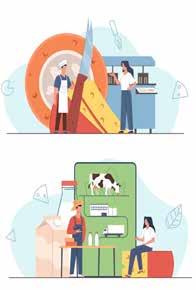
Contact: Andy Nevin
Quitmann O’Neill Packaging Ltd
Address: St Brendan’s Road, Portumna, Co. Galway, H53 HX51.
Tel: (090) 97 41148
Email: sales@quitmannoneill.com
Web: www.qonpack.com
Main Products & Services: Stockist and Distributors of Packaging.
Contact: Director: David O’Neill
RRentokil Pest Control
Nationwide Coverage
Tel: 0818 882 334
Email: pestcontrolinfo@rentokil.ie
Web: www.rentokil.ie
Main Products & Services: Suppliers of Pest Control to ISO 9001:2008
specification.
Contact: Pest Control: Michael O’Mahoney
Web: www.repak.ie
Main Products & Services: Repak is an environmental notfor-profit organisation with a social mission.
Repak is Ireland’s only government- approved packaging compliance scheme, licensed by the Department of Communications, Climate Action and Environment. Repak was set up in 1997 in accordance with EU Packaging Regulations. Repak has over 3,400 members (importers, brand-holders, retailers) whose fees fund household recycling bins, bottle banks, civic amenities and commercial backdoor waste nationwide.
Over the past 25 years, Repak members have invested over €514 million to help grow packaging recycling and recovery from under 15% in 1997 to an estimated 96% in 2021.

There are many benefits to becoming a Repak Member, including access to its Prevent & Save programme which can cut packaging waste at source and save your business money.
Ssafefood
Address: 7 Eastgate Avenue, Eastgate, Little Island, Co. Cork.
T45 RX01.
Tel: (021) 230 4100
Fax: (021) 230 4111
Email: info@safefood.net

Web: www.safefood.net
Main Products & Services: safefood is the all island public agency promoting food safety and healthy eating to consumers through education and awareness campaigns. It also acts as an independent source of scientific advice, commissions and funds relevant research, co-ordinates scientific co-operatio and facilitates knowledge exchange among those working in the food sector and other key stakeholders.
SAI Global
Address: Block 3, Quayside Business Park, Mill St, Dundalk, Co. Louth.
Tel: 042 932 0912
Email: information@saiglobal.com
Web: www.saiglobal.com
Main Products & Services: Food Safety certification, BRC Certification, GFSI Scheme Certification, Environmental Management, Quality Management Systems, Supply Chain Management, Aquaculture Services, Fishery Services, Compliance Solutions, Risk Management.
Saica Pack Ireland
Address: Ashbourne Industrial Estate, Ashbourne, Co. Meath.
Tel: (01) 801 0400
Web: www.saica.com
74 | FOOD IRELAND YEARBOOK 2023/24
SCHÜTZ (Ireland) Ltd

Address: Killala Business Park, Townamore, Killala, Co. Mayo, F26 XY18
Tel: (096) 33044
Fax: (096) 33045
Email: info1ireland@schuetz.net
Web: www.schuetz.net
Main Products & Services:
Manufacturer of IBCs and PE Drums.
Sealed Air Ltd
Address: 1-3 Cromwell Road, St. Neots, Cambridgeshire
PE19 1QN.
Tel: Ireland: 0800 932 984
UK: (0044) 0800 1488 700
Email: cryovac.ukmkt@sealedair.com
Web: www.sealedair.com
Main Products & Services:
Cryovac® Packaging Solutions, including films, barrier bags, rigid trays, punnets and pots. Diversey Hygiene Solutions including detergents, disinfectants, dosing equipment and energy and water management solutions.
Contact: Timothy O’Connell
Mobile: 086 225 3172
Smurfit Kappa Ireland
Address: Ballymount Road, Walkinstown, Dublin 12.
Tel: (01) 409 0000
Email: info@smurfitkappa.ie
Web: www.smurfitkappa.ie
www.skpackaging.ie
www.smurfitkappadirect.ie
Main Products & Services:
Ireland’s leading manufacturer of packaging and point of purchase displays, with a wide product range to suit the needs of the food industry. Standard packaging & promotional products can now be bought on-line via our webshop at www.smurfitkappadirect.ie
Sustainable Energy Authority of Ireland
Address: 3 Park Place, Hatch Street Upper, Dublin 2.
Tel: (01) 808 2100
Email: info@seai.ie
Web: www.seai.ie
Syspal

Address: Cockshutt Lane, Broseley, Shropshire, TF12 5JA, England.
Tel: (0044) 1952 883188
Email: sales@syspal.com
Web: www.syspal.com
Main Products & Services: Manufacturers of stainless steel and aluminium products, specifically designed for regulations within the food industry.
Tekpak Automation Ltd
Address: Whitemill Industrial Estate, Wexford, Ireland.
Tel: (053) 916 3033
Email: info@tekpak.ie
Web: www.tekpak.ie
Main Products & Services:
The Packaging Centre Ltd
TPC
Vision guided pick and place robots.
For all your packaging needs Fox & Geese
Contact: John Kehoe
The Packaging Centre Ltd
TPC
The Packaging Centre
Address: Fox & Geese House, Naas Road, Dublin 22.
Tel: (01) 450 8759
Email: sales@thepackagingcentre.ie
Web: www.thepackagingcentre.ie
Contact: Managing Director, Ivan Powell
TTeagasc Food Research Programme
Moorepark and Ashtown
Address: Moorepark, Fermoy, Co. Cork, P61 C996. Ashtown, Dublin 15, D15 KN3K.
Tel: (025) 42 222 / (01) 805 9500
Email: mark.fenelon@teagasc.ie / declan.troy@teagasc.ie
Web: www.teagasc.ie
Main Products & Services: Research, development and innovation, food bioscience, food safety, food chemistry and technology, food industry development, Food Quality & Sensory Science pilot plant facilities, analytical services, training, consultancy.
Tirlán
Address: Abbey Quarter, Kilkenny, Co. Kilkenny, R95 DXR1.
Tel: (056) 77 96300
Email: corporatecomms@tirlan.com
Web: www.tirlan.com
Main Products & Services: B2C Dairy, Ingredient Solutions & Agribusiness.
Toyota Material Handling Ireland
Address: Killeen Road, Dublin 12.
Tel: (01) 419 0200
Web: www.toyota-forklifts.ie
Main Products & Services: Toyota forklifts and BT warehouse equipment. Diesel/LPG and electric forklifts, powerpallet trucks, stackers etc.
FOOD IRELAND YEARBOOK 2023/24 | 75
company listings
House, Naas
Tel: 01
Fax:
www.thepackagingcentre.ie
Road, Dublin 22.
450 8759 ~
01 450 7567
all
Fox & Geese House, Naas Road, Dublin 22. Tel: 01 450 8759 ~ Fax: 01 450 7567 www.thepackagingcentre.ie Pantone 2935
For
your packaging needs
company listings
UCD - School Of Agriculture
and Food Science
Address: UCD Agriculture and Food Science Centre, UCD, Belfield, Dublin 4. Undergraduate Programmes: UCD Agricultural Science and Veterinary Medicine programme Office UCD Agriculture and Food Science Centre.
Tel: (01) 716 7194
UUCC - Food Industry Training
Unit
Address: Room 246, Food Science Building, University College Cork, Cork.
Tel: (021) 490 3178
Email: amyjane.troy@ucc.ie
Web: www.ucc.ie/en/fitu
Main Products & Services: Education, research, continuing education & training.
UCC - School of Food and Nutritional Sciences

Address: Room 242, Food Science Building, University College Cork, Cork.
Tel: (021) 490 3393
Email: foodandnutrition@ucc.ie
Web: www.ucc.ie/en/fns/
Main Products & Services: Education, research, continuing education & training.
UCC - Department of Food Business and Development
Address: O’Rahilly Building, University College Cork, Cork.
Tel: (021) 490 2788
Email: foodbusiness@ucc.ie
Web: www.ucc.ie/en/foodbus/
Main Products & Services:
Education, research, continuing education & training.
Email: agandfoodprogrammes@ucd.ie
Web: www.ucd.ie/agfood
Postgraduate Programmes: UCD School of Agriculture, Food Science and Veterinary Medicine UCD Veterinary Sciences Centre.
Tel: (01) 716 6100
Email: agfoodvet@ucd.ie
Web: www.ucd.ie/agfoodvet
WWaddington Europe

Address: Avoca River Park, Arklow, Co. Wicklow, Ireland, Y14 NX44.
Tel: +353 402 41234
Email: we.sales@novolex.com
Web: www.waddingtoneurope.com
Business: Thermoformed food packaging specialist.
Contact: Brian Gallagher, Business Development Manager Ireland
Weber Packaging Solutions Ltd
Address: Kilcannon Industrial Estate, Old Dublin Road, Enniscorthy, Co. Wexford.
Tel: (053) 923 3778
Email: sales@weberireland.com
Web: www.webermarking.ie
VVersatile Packaging Ltd
Address: Silverstream Business Park, Silverstream, Co. Monaghan.
Tel: (047) 85 177
Email: info@versatilepackaging.ie

Web: www.versatilepackaging.ie
Main Products & Services: Food Packaging Materials and Equipment - Tray Sealers, CPET, Barrier, Antifog Films, Aluminium Trays, Stand Up Pouches, Vacuum Pouches, Pouch Filling & Sealing Equipment, Egg Packaging, Labelling.

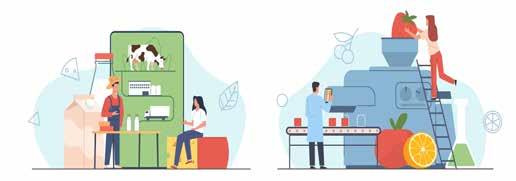
Main Products & Services: Print & Apply Labelling Systems, Desktop Printers, Laser Coders. Manufacturers of Blank & Pre-Printed Labels.
D.D. Williamson (Ireland) Ltd
Address: Unit D, Island Corporate Park, Little Island, Co. Cork.
Tel: (021) 435 3821
Email: info@ddwmson.com
Main Products & Services: Caramel colours, natural colours, burnt sugars, natural colour blends, liquids & powders.
76 | FOOD IRELAND YEARBOOK 2023/24
WrenTech Ltd
Address: Unit 3, Innovation Park, Carrigaline Ind. Park, Co. Cork.
Tel: (021) 483 2644
Email: mwren@wrentech.ie
Web: www.wrentech.ie
Main Products & Services:
Ytron & Matcon Mixing & Blending, Powder Dispersion / Incorporation, Dust free transfer batch sytems, Powder bins / Silo discharging, Auger filling, Dosing, Formulation, Batching, Flexibatch.

XXtrupak Ltd

Address: Gowna, Co. Cavan
Tel: +353 43 6683464
Email: johnm.reilly@xtrupak.ie
Web: xtrupak.ie
Main Products & Services: Manufacturing extruded Apet and Rpet sheet films for the packaging and display markets.
Contact: John M Reilly,
Commercial Director
ZZeus Packaging
Address: Unit 500, Grants Row, Greenogue Business Park, Rathcoole, Dublin 24.
Tel: (01) 401 8900
Email: hello@zeus.ie
Web: www.zeuspackaging.com
FOOD IRELAND YEARBOOK 2023/24 | 77
company listings
relevant organisations
relevant Organisations
AN BORD PLEANÁLA
64 Marlborough Street, Dublin 1.
Tel: 01-858 8100
Lo-call: 1800 275 175
Email: bord@pleanala.ie
Web: www.pleanala.ie
BORD BIA
140 Pembroke Road, Dublin 4.
Tel: 01-668 5155
Email: info@bordbia.ie
Web: www.bordbia.ie
BORD GÁIS ENERGY
PO Box 10943, Dublin 2.
Tel: 01-611 0133
Emergency: 1800 205 050
Web: www.bordgaisenergy.ie
BORD IASCAIGH MHARA (Irish Sea Fisheries Board)
BIM Dun Laoghaire, Crofton Road, Dun Laoghaire, Co. Dublin.
Tel: 01-214 4100
Email: info@bim.ie
Web: www.bim.ie
COMPETITION AND CONSUMER PROTECTION COMMISSION
Bloom House, Railway St, Dublin 1.
Tel: 01-402 5500
Web: www.ccpc.ie
CONSUMERS’ASSOCIATION OF IRELAND
120/121 Baggot Street Lower, Dublin 2.
Tel: 01-659 9430
Email: cai@thecai.ie
Web: www.thecai.ie
DRINKS INDUSTRY GROUP OF IRELAND (DIGI)
50 Upper Mount Street, Dublin 2.
Tel: 01-637 1777
Web: www.drinksindustry.ie
ENTERPRISE IRELAND
The Plaza, Eastpoint Business Park, Dublin 3.
Tel: 01-727 2000
Web: www.enterprise-ireland.com
ENVIRONMENTAL HEALTH ASSOC. OF IRELAND
Heraghty House, 4 Carlton Terrace, Novara Avenue, Bray, Co. Wicklow.
Tel: 01-276 1211
Web: www.ehai.ie
EUROPEAN COMMISSION IN IRELAND
Europe House,
12-14 Lower Mount Street, Dublin 2.
Tel: 01-634 1111
Email: eu-ie-info-request@ec.europa.eu
Web: ec.europa.eu/ireland
EUROPEAN PARLIAMENT
Europe House,
12-14 Lower Mount Street, Dublin 2.
Tel: 01-605 7900
Email: epdublin@ep.europa.eu
Web: www.europarl.europa.eu/ireland
EXCELLENCE IRELAND QUALITY ASSOCIATION
68 Pembroke Road, Ballsbridge, Dublin 4.
Tel: 01-660 4100
Email: info@eiqa.com
Web: www.eiqa.ie
EXPERIAN IRELAND LTD
2 Cumberland Place, Fenian Street, Dublin 2.
Tel: 01-846 9200
Email: info@experian.ie
Web: www.experian.ie
FOOD DRINK IRELAND (FDI)
Confederation House, 84-86 Lower Baggot Street, Dublin 2.
Tel: 01-605 1500
Email: info@fooddrinkireland.ie
Web: www.fooddrinkireland.ie
The FOOD Innovation Lab
TU Dublin - City Campus, Sackville Place, Dublin 1 DO1 WD85
Tel: Dr Lubna Ahmed 01 402 4442
Email: foodinnovation.research@tudublin.ie
Web:https://www.dit.ie/fil/
FOOD SAFETY AUTHORITY OF IRELAND
The Exchange, George’s Dock, Dublin 1.
Tel: 01-817 1300
Email: info@fsai.ie
Web: www.fsai.ie
GUARANTEED IRISH LTD
20 Molesworth Street, Dublin 2.
Tel: 01-661 2607
Email: info@guaranteedirish.ie
Web: www.guaranteedirish.ie
HEALTH & SAFETY AUTHORITY
The Metropolitan Building, James Joyce Street, Dublin 1.
Tel: +353 1 614 7000
Lo-call: 0818 289389
Email: contactus@hsa.ie
Web: www.hsa.ie
78 | FOOD IRELAND YEARBOOK 2023/24
INVESTMENT DEVELOPMENT AGENCY (IDA)
Three Park Place, Hatch Street Upper, Dublin 2, Ireland
Tel: 01-603 4000
Email: idaireland@ida.ie
Web: www.idaireland.com
IRISH BUSINESS & EMPLOYERS CONFEDERIATION (IBEC)
Head Office, Confederation House, 84-86 Lower Baggot Street, Dublin 2.
Tel: 01-605 1500
Email: info@ibec.ie
Web: www.ibec.ie
IRISH SECURITY INDUSTRY ASSOCIATION
Chase House, City Junction Business Park, Northern Cross, Malahide Road, Dublin 17.
Tel: 01-484 7206
Email: info@isia.ie
Web: www.isia.ie
IRISH SMALL AND MEDIUM ENTERPRISES ASSOCIATION (ISME)
17 Kildare Street, Dublin 2.
Tel: 01-662 2755
Email: info@isme.ie Web: www.isme.ie
LEGAL METROLOGY, C/O NSAI
1 Swift Square, Northwood, Santry, Dublin 9.
Tel: 01-807 3800
Email: info@nsai.ie
Web: www.nsai.ie/legal-metrology/
MANDATE
O’Lehane House, 9 Cavendish Row, Dublin 1.
Tel: 01-874 6321
Web: www.mandate.ie
NATIONAL DAIRY COUNCIL
Suite 6, The Mall, Beacon Court.
Sandyford, Co. Dublin, D18 Y640.
Tel: 01-290 2451
Email: hello@ndc.ie
Web: www.ndc.ie
THE PRIVATE SECURITY AUTHORITY
Davis Street, Tipperary Town, Co. Tipperary.
Tel: 062-32600
Email: info@psa-gov.ie
Web: www.psa.gov.ie
REVENUE COMMISSIONERS
Head Office, Dublin Castle, Dame Street, Dublin 2.
Tel: 01-647 5000 Web: www.revenue.ie
RGDATA
Ground Floor, 71 Baggot Street, Dublin 2.
Tel: 01-288 7584
Email: rgdata@rgdata.ie Web: www.rgdata.ie
SMALL FIRMS ASSOCIATION (IBEC)
84-86 Lower Baggot Street, Dublin 2.
Tel: 01-605 1500
Email: info@sfa.ie Web: www.sfa.ie
TEAGASC FOOD RESEARCH CENTRE
Ashtown, Dublin 15.
Tel: 01-805 9500
Email: info@teagasc.ie Web: www.teagasc.ie
WORKPLACE RELATIONS COMMISSION
O’Brien Road, Carlow, R93 E920
Tel: 059-917 8990 Web: www.workplacerelations.ie
Government Departments: AGRICULTURE, FOOD AND THE MARINE
Agriculture House, Kildare Street, Dublin 2.
Tel: 01 607 2000
Email: info@agriculture.gov.ie Web: www.agriculture.gov.ie
COLLECTOR GENERAL’S OFFICE VAT/PAYE/PRSI
Sarsfield House, Francis Street, Limerick.
Tel: 01 738 3663
Email: through MyEnquiries
Web: www.revenue.ie
relevant organisations
COMPANIES REGISTRATION OFFICE
Bloom House, Gloucester Place Lower, Dublin 1.
Tel: 01-804 5200
Email:cro.info@enterprise.gov.ie
Web: www.cro.ie
CUSTOMS PROCEDURES BRANCH
St. Conlons Road, Nenagh, Co. Tipperary.
Tel: 067 63370
Email: tarclass@revenue.ie
Web: www.revenue.ie
ENTERPRISE, TRADE AND EMPLOYMENT
23 Kildare Street, Dublin 2.
Tel: 01-631 2121
0818 302121
Email: info@enterprise.gov.ie
Web: enterprise.gov.ie
FINANCE
Government Buildings, Upper Merrion Street, Dublin 2.
Tel: 01-676 7571
Email: webmaster@finance.gov.ie
Web: www.gov.ie/finance
HOUSING, LOCAL
GOVERNMENT & HERITAGE
Custom House, Custom House Quay, Dublin 1.
Tel: 01-888 2000
Email: qcsofficer@housing.gov.ie
Web: www.gov.ie/housing
JUSTICE AND EQUALITY
51 St. Stephen’s Green, Dublin 2.
Tel: 01-602 8202
Lo-call: 1800 221 227
Email: info@justice.ie
Web: www.justice.ie
SOCIAL PROTECTION
Aras Mhic Dhiarmada, Store Street, Dublin 1.
Tel: 01-704 3000
Email: info@welfare.ie
Web: gov.ie/dsp
VALUATION OFFICE
Block 2, Irish Life Centre, Lower Abbey Street, Dublin 1.
Tel: 01-817 1000
Email: info@valoff.ie
Web: www.valoff.ie
FOOD IRELAND YEARBOOK 2023/24 | 79
80 | FOOD IRELAND YEARBOOK 2023/24 = Public Holiday 2024 January 2024 Week 12 3 4 5 M 1 8 15 22 29 T 2 9 16 23 30 W 3 10 17 24 31 T 4 11 18 25 F 5 12 19 26 S 6 13 20 27 S 7 14 21 28 March 2024 Week 9 10 11 12 13 M 4 11 18 25 T 5 12 19 26 W 6 13 20 27 T 7 14 21 28 F 1 8 15 22 29 S 2 9 16 23 30 S 3 10 17 24 31 September 2024 Week 35 36 37 38 39 40 M 2 9 16 23 30 T 3 10 17 24 W 4 11 18 25 T 5 12 19 26 F 6 13 20 27 S 7 14 21 28 S 1 8 15 22 29 February 2024 Week 5 6 7 8 9 M 5 12 19 26 T 6 13 20 27 W 7 14 21 28 T 1 8 15 22 29 F 2 9 16 23 S 3 10 17 24 S 4 11 18 25 October 2024 Week 40 41 42 43 44 M 7 14 21 28 T 1 8 15 22 29 W 2 9 16 23 30 T 3 10 17 24 31 F 4 11 18 25 S 5 12 19 26 S 6 13 20 27 July 2024 Week 27 28 29 30 31 M 1 8 15 22 29 T 2 9 16 23 30 W 3 10 17 24 31 T 4 11 18 25 F 5 12 19 26 S 6 13 20 27 S 7 14 21 28 November 2024 Week 44 45 46 47 48 M 4 11 18 25 T 5 12 19 26 W 6 13 20 27 T 7 14 21 28 F 1 8 15 22 29 S 2 9 16 23 30 S 3 10 17 24 April 2024 Week 14 15 16 17 18 M 1 8 15 22 29 T 2 9 16 23 30 W 3 10 17 24 T 4 11 18 25 F 5 12 19 26 S 6 13 20 27 S 7 14 21 28 August 2024 Week 31 32 33 34 35 M 5 12 19 26 T 6 13 20 27 W 7 14 21 28 T 1 8 15 22 29 F 2 9 16 23 30 S 3 10 17 24 31 S 4 11 18 25 December 2024 Week 48 49 50 51 52 53 M 2 9 16 23 30 T 3 10 17 24 31 W 4 11 18 25 T 5 12 19 26 F 6 13 20 27 S 7 14 21 28 S 1 8 15 22 29 May 2024 Week 18 19 20 21 22 M 6 13 20 27 T 7 14 21 28 W 1 8 15 22 29 T 2 9 16 23 30 F 3 10 17 24 31 S 4 11 18 25 S 5 12 19 26 June 2024 Week 22 23 24 25 26 M 3 10 17 24 T 4 11 18 25 W 5 12 19 26 T 6 13 20 27 F 7 14 21 28 S 1 8 15 22 29 S 2 9 16 23 30 2022 January 2022 Week 52 1 2 3 4 5 M 3 10 17 24 31 T 4 11 18 25 W 5 12 19 26 T 6 13 20 27 F 7 14 21 28 S 1 8 15 22 29 S 2 9 16 23 30 March 2022 Week 9 10 11 12 13 M 7 14 21 28 T 1 8 15 22 29 W 2 9 16 23 30 T 3 10 17 24 31 F 4 11 18 25 S 5 12 19 26 S 6 13 20 27 September 2022 Week 35 36 37 38 39 M 5 12 19 26 T 6 13 20 27 W 7 14 21 28 T 1 8 15 22 29 F 2 9 16 23 30 S 3 10 17 24 S 4 11 18 25 February 2022 Week 5 6 7 8 9 M 7 14 21 28 T 1 8 15 22 W 2 9 16 23 T 3 10 17 24 F 4 11 18 25 S 5 12 19 26 S 6 13 20 27 October 2022 Week 39 40 41 42 43 44 M 3 10 17 24 31 T 4 11 18 25 W 5 12 19 26 T 6 13 20 27 F 7 14 21 28 S 1 8 15 22 29 S 2 9 16 23 30 July 2022 Week 26 27 28 29 30 M 4 11 18 25 T 5 12 19 26 W 6 13 20 27 T 7 14 21 28 F 1 8 15 22 29 S 2 9 16 23 30 S 3 10 17 24 31 November 2022 Week 44 45 46 47 48 M 7 14 21 28 T 1 8 15 22 29 W 2 9 16 23 30 T 3 10 17 24 F 4 11 18 25 S 5 12 19 26 S 6 13 20 27 April 2022 Week 13 14 15 16 17 M 4 11 18 25 T 5 12 19 26 W 6 13 20 27 T 7 14 21 28 F 1 8 15 22 29 S 2 9 16 23 30 S 3 10 17 24 August 2022 Week 31 32 33 34 35 M 1 8 15 22 29 T 2 9 16 23 30 W 3 10 17 24 31 T 4 11 18 25 F 5 12 19 26 S 6 13 20 27 S 7 14 21 28 December 2022 Week 48 49 50 51 52 M 5 12 19 26 T 6 13 20 27 W 7 14 21 28 T 1 8 15 22 29 F 2 9 16 23 30 S 3 10 17 24 31 S 4 11 18 25 May 2022 Week 17 18 19 20 21 22 M 2 9 16 23 30 T 3 10 17 24 31 W 4 11 18 25 T 5 12 19 26 F 6 13 20 27 S 7 14 21 28 S 1 8 15 22 29 June 2022 Week 22 23 24 25 26 M 6 13 20 27 T 7 14 21 28 W 1 8 15 22 29 T 2 9 16 23 30 F 3 10 17 24 S 4 11 18 25 S 5 12 19 26 2023 January 2023 Week 52 1 2 3 4 5 M 2 9 16 23 30 T 3 10 17 24 31 W 4 11 18 25 T 5 12 19 26 F 6 13 20 27 S 7 14 21 28 S 1 8 15 22 29 March 2023 Week 9 10 11 12 13 M 6 13 20 27 T 7 14 21 28 W 1 8 15 22 29 T 2 9 16 23 30 F 3 10 17 24 31 S 4 11 18 25 S 5 12 19 26 September 2023 Week 35 36 37 38 39 M 4 11 18 25 T 5 12 19 26 W 6 13 20 27 T 7 14 21 28 F 1 8 15 22 29 S 2 9 16 23 30 S 3 10 17 24 February 2023 Week 5 6 7 8 9 M 6 13 20 27 T 7 14 21 28 W 1 8 15 22 T 2 9 16 23 F 3 10 17 24 S 4 11 18 25 S 5 12 19 26 October 2023 Week 39 40 41 42 43 44 M 2 9 16 23 30 T 3 10 17 24 31 W 4 11 18 25 T 5 12 19 26 F 6 13 20 27 S 7 14 21 28 S 1 8 15 22 29 July 2023 Week 26 27 28 29 30 31 M 3 10 17 24 31 T 4 11 18 25 W 5 12 19 26 T 6 13 20 27 F 7 14 21 28 S 1 8 15 22 29 S 2 9 16 23 30 November 2023 Week 44 45 46 47 48 M 6 13 20 27 T 7 14 21 28 W 1 8 15 22 29 T 2 9 16 23 30 F 3 10 17 24 S 4 11 18 25 S 5 12 19 26 April 2023 Week 13 14 15 16 17 M 3 10 17 24 T 4 11 18 25 W 5 12 19 26 T 6 13 20 27 F 7 14 21 28 S 1 8 15 22 29 S 2 9 16 23 30 August 2023 Week 31 32 33 34 35 M 7 14 21 28 T 1 8 15 22 29 W 2 9 16 23 30 T 3 10 17 24 31 F 4 11 18 25 S 5 12 19 26 S 6 13 20 27 December 2023 Week 48 49 50 51 52 M 4 11 18 25 T 5 12 19 26 W 6 13 20 27 T 7 14 21 28 F 1 8 15 22 29 S 2 9 16 23 30 S 3 10 17 24 31 May 2023 Week 18 19 20 21 22 M 1 8 15 22 29 T 2 9 16 23 30 W 3 10 17 24 31 T 4 11 18 25 F 5 12 19 26 S 6 13 20 27 S 7 14 21 28 June 2023 Week 22 23 24 25 26 M 5 12 19 26 T 6 13 20 27 W 7 14 21 28 T 1 8 15 22 29 F 2 9 16 23 30 S 3 10 17 24 S 4 11 18 25
2022 2023 2024
Now with double protection.
FOODCERT + DUALPROTECT
Dual leakage protection through liner and inner bottle

Delivered “ready to fill” for the highest degree of user friendliness
The liner automatically unfolds as the container is filled
The irradiated liner protects the filling product against contact with oxygen or condensate

Prevents oxidation, vitamin depletion and microbial contamination
Extends product shelf life – without the need for preservatives
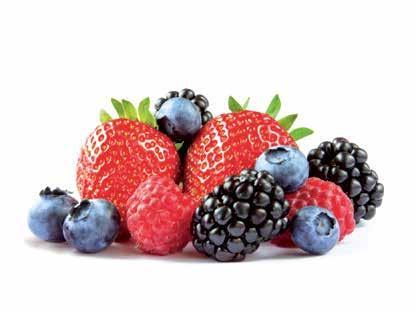
Secure protection of the filling product quality
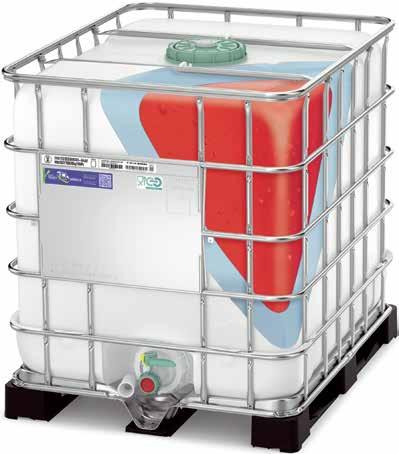
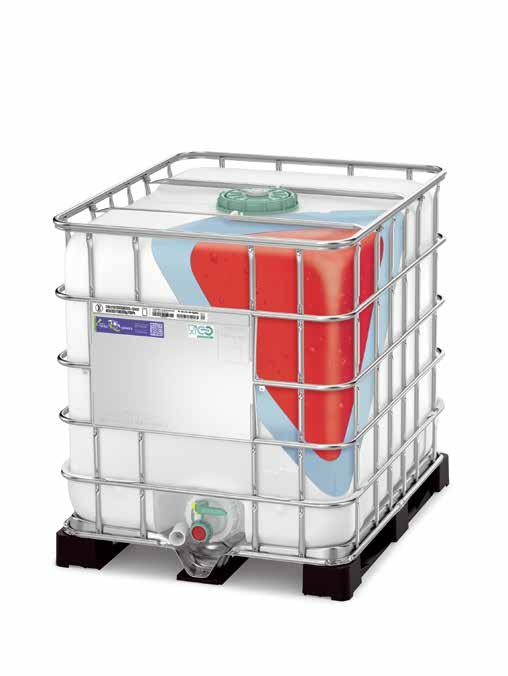

Discover the new SCHÜTZ packaging with dual filling product protection for your food applications. ECOBULK FOODCERT + DUALPROTECT are supplied ex-works with a high-quality LDPE liner including an oxygen barrier. Filling can take place through the top opening or the outlet valve. Your filling product is hermetically sealed in the liner and completely protected against ambient conditions. The robust outer bottle provides the highest level of safety and dependability – even for the most tough transportation conditions – UN hazardous goods approval included.
Find out more at www.schuetz-packaging.net
BAUCH & MÜLLER WERBEAGENTUR SCHÜTZ Ireland Ltd. Killala Business Park Townamore IE-Killala, Co. Mayo F26 XY18 Phone +353 96 33044 Fax +353 96 33045 info1ireland@schuetz.net www.schuetz.net/ireland
The world’s most successful IBC system.
Dairy from Ireland where we work in harmony with nature
Ireland’s lush green fields, fresh, clean air and plentiful rain create the perfect environment for rearing grass-fed cows. Together with an agile industry that responds speedily to changing production requirements, we’re able to ensure a consistent, secure supply of premium quality dairy produce.

Our farmers and producers continue to work with care, commitment and respect for tradition.
As members of Origin Green – Ireland’s leading edge national food quality and sustainability program – their work is also measured and independently audited to drive continuous improvements in food safety, traceability, animal welfare and greenhouse gas emissions.
To learn more about how we work in harmony with nature like nowhere else in the world, visit irishfoodanddrink.com





























































































































































































































